
Aug 31, 2016 | Focolare Worldwide, Senza categoria
 “An unexpected phone call came one early morning. My elder brother’s voice at the other end of the line sounded confused. My nephew had just met an accident. He had been about to pick up my brother from work, but while driving he had dozed off, and those few seconds were enough for him to hit a motorcycle and kill two of his colleagues. They were both married men with families. It was indeed a shock for me; it was so heartbreaking. I went to look for my nephew. He was in a prison cell. I didn’t know what to say; I could only cry with him. Since it was early morning and my nephew and the other detainees had not yet had breakfast, I went to buy some food for them. Then I asked the prison guard if it was possible to clean the prison cell which was quite dirty. When my brother arrived and started crying, I stayed to comfort him. At this point, I realized that our next step had to be to ask for forgiveness from the families of the two victims. I told my brother that we should go to their wakes, face their families and ask for their forgiveness. My brother agreed, overcoming his own fear. We went to see the first family … and we went straight to the widow, who was crying. She was indeed quite angry with my brother. I felt I had to be there to absorb all her pain. Then I embraced her and said, ‘We are here to ask your forgiveness for what happened, without expecting to be forgiven.’ Then we also had to ask forgiveness from the victim’s parents. Their relatives advised us not to, because they were afraid that his mother would lose her calm and be beside herself with anger. But I strongly felt that we had to do it. I approached the mother, with my brother close behind me. Indeed, she cried aloud as I entrusted everything silently to God and embraced her tightly asking her to forgive us, also on behalf of my nephew. I assured her that if we would have found the way to take care of their family, providing for the education of the three daughters who were still in grade school. I was profoundly experiencing the pain and sorrow of t family, but at the same time, I fully experienced that peace that only God can give. Before leaving, we went to say goodbye to the widow. She did not say anything to my brother; but she did introduce me to her three daughters. This consoled me since I considered it an indication that I was able to establish some kind of a relationship with her. Some days later, with some friends from the Focolare, I attended the funeral… and also visited the family of the other victim. My nephew was released from detention three weeks later. A case was filed against him, but after several court hearings, the two families agreed to drop the case upon monetary compensation. My brothers and sisters pooled together the money that they had and we were able to offer monetary assistance to the families involved. This made our family more united, having helped one another. A year later, I thought of getting in touch with a widow of the accident victim. To my surprise she said, “I want to apologize for how I treated you and your brother when you came to the wake of my husband.” Since then we became friends… I was able to share about my faith in the love of God. Then I started sending her the daily ‘password’, a Gospel reflection to live by, which she now sends to all her friends. Two months ago, she invited me to a family gathering to celebrate her eldest daughter’s elementary school graduation. My heartbeat was galloping so fast at the party because I realized that all of them knew who I was—the aunt of the person who had caused the accident. The widow was with me the whole time, sharing with me beautiful memories of her husband. During a Mariapolis, at which she was present, she said, “You know, now I understand why God permitted everything that happened. Were it not for that accident, I would never have met you and the Focolare which has made a big change in my life.” She added that she had become closer to God. I thought this was my opportunity to ask her, “If you would meet my nephew someday, could you forgive him?” She answered, ‘I have already forgiven him. Look at my face. There are no traces of hatred for your nephew and your family.’ I felt that it was indeed an enormous grace to be a recipient of God’s mercy, and through his grace, to be also capable of offering it to one another.”
“An unexpected phone call came one early morning. My elder brother’s voice at the other end of the line sounded confused. My nephew had just met an accident. He had been about to pick up my brother from work, but while driving he had dozed off, and those few seconds were enough for him to hit a motorcycle and kill two of his colleagues. They were both married men with families. It was indeed a shock for me; it was so heartbreaking. I went to look for my nephew. He was in a prison cell. I didn’t know what to say; I could only cry with him. Since it was early morning and my nephew and the other detainees had not yet had breakfast, I went to buy some food for them. Then I asked the prison guard if it was possible to clean the prison cell which was quite dirty. When my brother arrived and started crying, I stayed to comfort him. At this point, I realized that our next step had to be to ask for forgiveness from the families of the two victims. I told my brother that we should go to their wakes, face their families and ask for their forgiveness. My brother agreed, overcoming his own fear. We went to see the first family … and we went straight to the widow, who was crying. She was indeed quite angry with my brother. I felt I had to be there to absorb all her pain. Then I embraced her and said, ‘We are here to ask your forgiveness for what happened, without expecting to be forgiven.’ Then we also had to ask forgiveness from the victim’s parents. Their relatives advised us not to, because they were afraid that his mother would lose her calm and be beside herself with anger. But I strongly felt that we had to do it. I approached the mother, with my brother close behind me. Indeed, she cried aloud as I entrusted everything silently to God and embraced her tightly asking her to forgive us, also on behalf of my nephew. I assured her that if we would have found the way to take care of their family, providing for the education of the three daughters who were still in grade school. I was profoundly experiencing the pain and sorrow of t family, but at the same time, I fully experienced that peace that only God can give. Before leaving, we went to say goodbye to the widow. She did not say anything to my brother; but she did introduce me to her three daughters. This consoled me since I considered it an indication that I was able to establish some kind of a relationship with her. Some days later, with some friends from the Focolare, I attended the funeral… and also visited the family of the other victim. My nephew was released from detention three weeks later. A case was filed against him, but after several court hearings, the two families agreed to drop the case upon monetary compensation. My brothers and sisters pooled together the money that they had and we were able to offer monetary assistance to the families involved. This made our family more united, having helped one another. A year later, I thought of getting in touch with a widow of the accident victim. To my surprise she said, “I want to apologize for how I treated you and your brother when you came to the wake of my husband.” Since then we became friends… I was able to share about my faith in the love of God. Then I started sending her the daily ‘password’, a Gospel reflection to live by, which she now sends to all her friends. Two months ago, she invited me to a family gathering to celebrate her eldest daughter’s elementary school graduation. My heartbeat was galloping so fast at the party because I realized that all of them knew who I was—the aunt of the person who had caused the accident. The widow was with me the whole time, sharing with me beautiful memories of her husband. During a Mariapolis, at which she was present, she said, “You know, now I understand why God permitted everything that happened. Were it not for that accident, I would never have met you and the Focolare which has made a big change in my life.” She added that she had become closer to God. I thought this was my opportunity to ask her, “If you would meet my nephew someday, could you forgive him?” She answered, ‘I have already forgiven him. Look at my face. There are no traces of hatred for your nephew and your family.’ I felt that it was indeed an enormous grace to be a recipient of God’s mercy, and through his grace, to be also capable of offering it to one another.”
M.R.
New City (Philippines)
![Collegamento CH Worldwide linkup]()
Aug 30, 2016 | Non categorizzato
 The news summary will be made available on the Collegamento CH website a few days before the Internet transmission. On the same website one can find all the previous linkups in various languages, as full editions as well as individual news video clips. Watch spot video
The news summary will be made available on the Collegamento CH website a few days before the Internet transmission. On the same website one can find all the previous linkups in various languages, as full editions as well as individual news video clips. Watch spot video
Aug 30, 2016 | Focolare Worldwide
- From 7- 17 September for Latin America, North America and Oceania
- From 28 September – 8 October for Africa, Asia and the Middle East
- From 15 – 23 October for Europe
Around a hundred participants will attend every session (Castel Gandolfo Mariapolis Centre, Rome), with a program partly in common and another part with various themes based on the demands and needs of each geographic area. The themes to be discussed will range from enculturation in Africa to the emergency of refugees and dialogue with Islam in Europe; other topics will focus on the challenges in Latin America, Asia, the Middle East, North America and Oceania in the social and ecclesiastic fields, from the perspectives of the family, the new generations, ecumenical and interreligious dialogue, and many other themes.
Aug 30, 2016 | Focolare Worldwide
- From 7- 17 September for Latin America, North America and Oceania
- From 28 September – 8 October for Africa, Asia and the Middle East
- From 15 – 23 October for Europe
Around a hundred participants will attend every session (Castel Gandolfo Mariapolis Centre, Rome), with a program partly in common and another part with various themes based on the demands and needs of each geographic area. The themes to be discussed will range from inculturation in Africa to the emergency of refugees and dialogue with Islam in Europe; other topics will focus on the challenges in Latin America, Asia, the Middle East, North America and Oceania in the social and ecclesiastic fields, from the perspectives of the family, the new generations, ecumenical and interreligious dialogue, and many other themes.
Aug 30, 2016 | Focolare Worldwide
- From 7- 17 September for Latin America, North America and Oceania
- From 28 September – 8 October for Africa, Asia and the Middle East
- From 15 – 23 October for Europe
Around a hundred participants will attend every session (Castel Gandolfo Mariapolis Centre, Rome), with a program partly in common and another part with various themes based on the demands and needs of each geographic area. The themes to be discussed will range from enculturation in Africa to the emergency of refugees and dialogue with Islam in Europe; other topics will focus on the challenges in Latin America, Asia, the Middle East, North America and Oceania in the social and ecclesiastic fields, from the perspectives of the family, the new generations, ecumenical and interreligious dialogue, and many other themes.
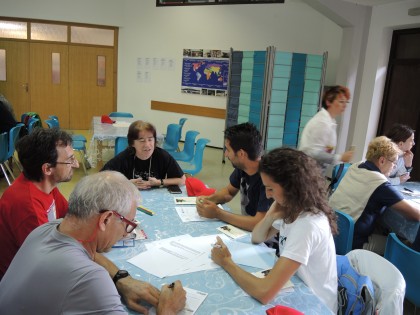
Aug 30, 2016 | Focolare Worldwide
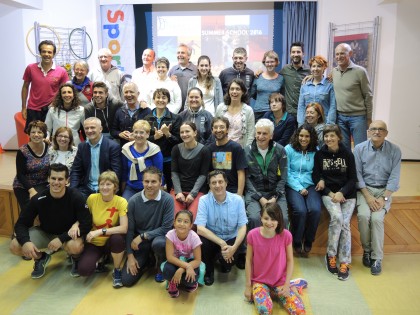 “Sport and Nature” was the title chosen for the 2016 Summer School organized by Sportmeet which gathered sport players from around the world to reflect on the environmental crisis and the specific contribution that sport could make to developing an authentic ecological conscience. Sport holds a great potential for creating friendship among peoples and with the Creation. It also has important educational value when practiced in the name of altruism and reciprocity. Eighty-three people attended the summer school: players at a variety of levels, ages and disciplines, leaders, physical education teachers and professional trainers, as well as others involved in sport as recreation. Paolo Cipolli, international coordinator of Sportmeet, presented the past and present history of the project. His presented had been preceded by numerous greetings from the public authorities who were present including Vice-Mayor Križevci Tomislav Katanović, Vice-President of the City Councill and ex-federal handball instructor, Ivan Pal, Deputy Minister off Science, Training and Sport, Hrvoje Šlezak from the Swiss Embassy in Croatia, Stefan Estermann, Second Secretary to the Italian Ambassador in Croatia whose greetings were given by Anna Lisa Gasparini and Zdenko Horvat.
“Sport and Nature” was the title chosen for the 2016 Summer School organized by Sportmeet which gathered sport players from around the world to reflect on the environmental crisis and the specific contribution that sport could make to developing an authentic ecological conscience. Sport holds a great potential for creating friendship among peoples and with the Creation. It also has important educational value when practiced in the name of altruism and reciprocity. Eighty-three people attended the summer school: players at a variety of levels, ages and disciplines, leaders, physical education teachers and professional trainers, as well as others involved in sport as recreation. Paolo Cipolli, international coordinator of Sportmeet, presented the past and present history of the project. His presented had been preceded by numerous greetings from the public authorities who were present including Vice-Mayor Križevci Tomislav Katanović, Vice-President of the City Councill and ex-federal handball instructor, Ivan Pal, Deputy Minister off Science, Training and Sport, Hrvoje Šlezak from the Swiss Embassy in Croatia, Stefan Estermann, Second Secretary to the Italian Ambassador in Croatia whose greetings were given by Anna Lisa Gasparini and Zdenko Horvat.  During the three-day course experts and instructors offered their reflections on the theme: “Sport and Nature: A Discovery, Resource and Challenge”. Andrea Ceciliani from the University of Bologna offered an exciting hand-on workshop. Mirna Andrijasević from Zagabria University presented “Sport in Nature: A Lifestyle.” Ivan Prskalo from Zagabria University presented Ecology and Chinesiology in Križevci presented an entertaining hands-on workshop on traditional Croatian games. Andrea Ceciliani from University of Bologna presented “Outdoor Education” showing how to hold school in the open, which was accompanied by a lively hands-on workshop. There were also school trips to Mount Kalnik and to Lake Čabraj along with an evening for sharing best practices with the Sportmeet Network, which included a telephone link-up with Rio de Janeiro and Belgrade. The last day began with a video conference that had been held by Focolare foundress Chiara Lubich at the United Nations in 1986 on the theme of Fraternity Among People and Nations. This was followed by a long and lively discussion with all the participants, and it helped design the plans for the upcoming Summer School in Barcelona, Spain, June 2017. Source: Sportmeet online
During the three-day course experts and instructors offered their reflections on the theme: “Sport and Nature: A Discovery, Resource and Challenge”. Andrea Ceciliani from the University of Bologna offered an exciting hand-on workshop. Mirna Andrijasević from Zagabria University presented “Sport in Nature: A Lifestyle.” Ivan Prskalo from Zagabria University presented Ecology and Chinesiology in Križevci presented an entertaining hands-on workshop on traditional Croatian games. Andrea Ceciliani from University of Bologna presented “Outdoor Education” showing how to hold school in the open, which was accompanied by a lively hands-on workshop. There were also school trips to Mount Kalnik and to Lake Čabraj along with an evening for sharing best practices with the Sportmeet Network, which included a telephone link-up with Rio de Janeiro and Belgrade. The last day began with a video conference that had been held by Focolare foundress Chiara Lubich at the United Nations in 1986 on the theme of Fraternity Among People and Nations. This was followed by a long and lively discussion with all the participants, and it helped design the plans for the upcoming Summer School in Barcelona, Spain, June 2017. Source: Sportmeet online
See also: Sportmeet in the Balkans: When Sports Unites
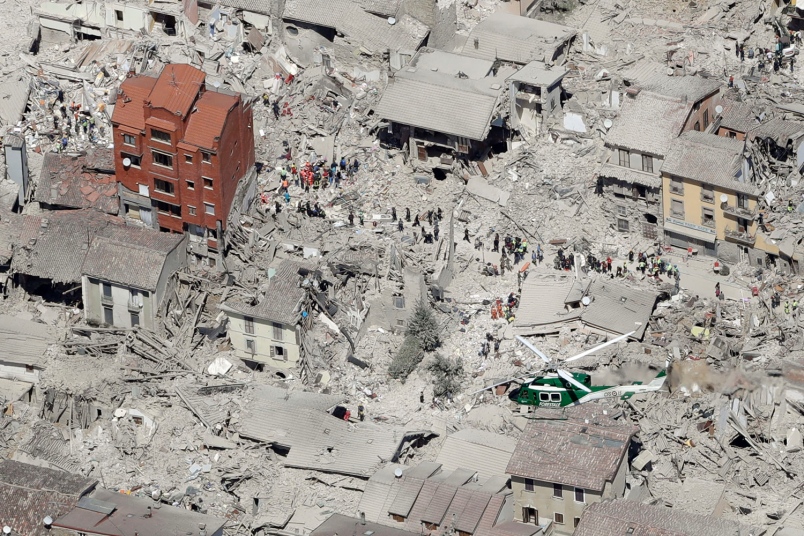
Aug 29, 2016 | Non categorizzato
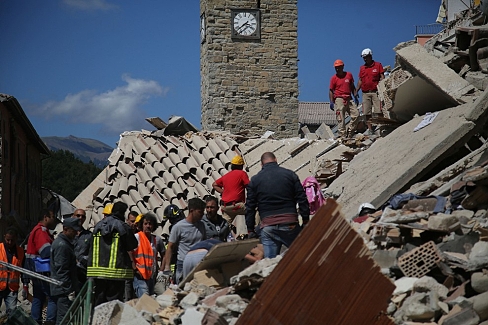 That clock tower on Amatrice church indicating 3:36 am is a powerful image for what happened this night. That minute was the last minute for many victims, it will be a minute forever remembered because it is written in the flesh and hearts of their families. And it will be remembered by our country, whose recent history is also a series of clocks stopped forever by the violence of men and of the earth. I will also remember it forever, because this cry of the earth also reached the house of my parents in Roccafluvione, around twenty kilometres from Arquata del Tronto, where I am visiting them. It was a long night of fear, suffering and thoughts for Amatrice, Arquata, Accumuli, towns of my childhood, close to where my grandparents come from, villages where I would accompany my father as he went about his business selling chickens. And then there were thoughts, thoughts we never have, because you can only have them on these terrible nights. I thought about all the time that clock had measured right up until 3.36. It stopped there, dead, but it was only one dimension of time which the Greeks called ‘kronos’: the surface, the soil of time. In the world there is our managed time, domesticated, constructed, which live by. But beneath it there is a another time: the time of the earth. This non-human time, and at times inhuman, and commands the time of men, mothers and children. And I thought that we are not the masters of this other time, which is deeper, abysmal, primitive, which doesn’t follow our path, and at times is against the paths of those who walk above. On such momentous nights we become aware of this different time, on which we walk and build our homes, and that we are ‘grass of the field’, watered and nourished by the sky, but also swallowed up by the earth.
That clock tower on Amatrice church indicating 3:36 am is a powerful image for what happened this night. That minute was the last minute for many victims, it will be a minute forever remembered because it is written in the flesh and hearts of their families. And it will be remembered by our country, whose recent history is also a series of clocks stopped forever by the violence of men and of the earth. I will also remember it forever, because this cry of the earth also reached the house of my parents in Roccafluvione, around twenty kilometres from Arquata del Tronto, where I am visiting them. It was a long night of fear, suffering and thoughts for Amatrice, Arquata, Accumuli, towns of my childhood, close to where my grandparents come from, villages where I would accompany my father as he went about his business selling chickens. And then there were thoughts, thoughts we never have, because you can only have them on these terrible nights. I thought about all the time that clock had measured right up until 3.36. It stopped there, dead, but it was only one dimension of time which the Greeks called ‘kronos’: the surface, the soil of time. In the world there is our managed time, domesticated, constructed, which live by. But beneath it there is a another time: the time of the earth. This non-human time, and at times inhuman, and commands the time of men, mothers and children. And I thought that we are not the masters of this other time, which is deeper, abysmal, primitive, which doesn’t follow our path, and at times is against the paths of those who walk above. On such momentous nights we become aware of this different time, on which we walk and build our homes, and that we are ‘grass of the field’, watered and nourished by the sky, but also swallowed up by the earth.  The earth, the real one and not the romantic and naive one of ideologies, is both mother and stepmother. The hummus generates man but also turns him back into dust, sometimes in a good way at the right time, but other times it is bad, and too soon, with a so much suffering. Biblical humanism knows this very well, but for this has fought a lot with the pagan cults of local peoples who wanted to make a divinity of the earth and its nature: the power of the earth has always fascinated men who have tried to ‘buy’ it with magic and sacrifices. Whilst I tried in vain to go back to sleep, I thought about the tremendous books of Job and Qohelet, which you can understand on such nights. Those books tell us that no God, not even the real one, can control the earth, because He too, once he entered into human history, became a victim of the mysterious freedom of his creation. God cannot even explain to us why children die squashed beneath the ancient pillars of our towns. He can’t explain it to us because if he knew why he would be a monstrous idol. God, who today looks on the land of the three As – Arquata, Accumuli and Amatrice – can only ask himself the same questions as us: he can cry out, remain silent, cry together with us. He can perhaps remind us with the words of the Bible that all is vanity of vanities: everything is breath, wind, mist, waste, nothing, ephemeral. Vanity in Hebrew is written Habel, the same word as Abel, the brother killed by Kane. Everything is vanity, everything is an infinite Abel: the world is full of victims. This we know. We know it, we forget it too often. These terrible nights and days make us remember. * 1 Kings 19:11
The earth, the real one and not the romantic and naive one of ideologies, is both mother and stepmother. The hummus generates man but also turns him back into dust, sometimes in a good way at the right time, but other times it is bad, and too soon, with a so much suffering. Biblical humanism knows this very well, but for this has fought a lot with the pagan cults of local peoples who wanted to make a divinity of the earth and its nature: the power of the earth has always fascinated men who have tried to ‘buy’ it with magic and sacrifices. Whilst I tried in vain to go back to sleep, I thought about the tremendous books of Job and Qohelet, which you can understand on such nights. Those books tell us that no God, not even the real one, can control the earth, because He too, once he entered into human history, became a victim of the mysterious freedom of his creation. God cannot even explain to us why children die squashed beneath the ancient pillars of our towns. He can’t explain it to us because if he knew why he would be a monstrous idol. God, who today looks on the land of the three As – Arquata, Accumuli and Amatrice – can only ask himself the same questions as us: he can cry out, remain silent, cry together with us. He can perhaps remind us with the words of the Bible that all is vanity of vanities: everything is breath, wind, mist, waste, nothing, ephemeral. Vanity in Hebrew is written Habel, the same word as Abel, the brother killed by Kane. Everything is vanity, everything is an infinite Abel: the world is full of victims. This we know. We know it, we forget it too often. These terrible nights and days make us remember. * 1 Kings 19:11
Aug 28, 2016 | Non categorizzato, Word of
We can bring all things as a gift to God, if we learn how to rejoice with those who rejoice and to weep with those who weep, transforming each pain into love. The setting of these words is the Christian community in Corinth. It was extremely lively, full of initiative, animated by groups linked to different charismatic leaders. This also gave rise to tensions among individuals and groups, to divisions, personality cults, the desire to dominate. Paul intervened decisively and reminded everyone that, in the richness and variety of gifts and leaders belonging to the community, something much deeper bound them in unity: belonging to God. Once more the great Christian proclamation rings out: God is with us, and we are not lost, orphaned, abandoned to ourselves, but, as God’s children, we are God’s. As a true Father God cares for each one, without letting us lack anything we need for our good. Indeed, God is superabundant in love and in giving, as Paul affirms: ‘The world, life, death, the present, the future—all belong to you!’ God has even given us his Son, Jesus. What huge trust on God’s part in giving each thing into our hands! How often instead have we abused his gifts! We have believed ourselves to be the lords of creation to the point of plundering and despoiling it, lords of our brothers and sisters to the point of enslaving and slaughtering them, lords of our own lives to the point of wasting them in narcissism and self- destruction. God’s huge gift – ‘All belong to you’ – asks for gratitude. Often we complain about what we don’t have and we only turn to God to ask. Why don’t we look around and discover the beauty and the goodness surrounding us? Why don’t we say thank you to God for what he gives us each day? This ‘All belong to you’ is also a responsibility. It demands our attention, our tenderness, our care for all that has been entrusted to us: the whole world and every human being, the same care that Jesus has for us (‘you belong to Christ’), the same care that the Father has for Jesus (‘Christ belongs to God’). We ought to know how to rejoice with those who rejoice and to weep with those who weep, ready to gather up every groan, division, pain, violence, as something that belongs to us, so as to share it, to the point of transforming it into love. Everything has been given to us so that we bring it to Christ, that is, to the fullness of life, and to God, that is, to its final goal, giving back the dignity and the deepest meaning that belong to each thing and to each person. One day in the summer of 1949, Chiara Lubich sensed such a unity with Christ that she felt bound to him as a bride to her Spouse. This led her to think of the dowry she would bring, and she understood that it should be the whole of creation! On his side, he would bring her as his inheritance the whole of Paradise. She remembered then the words of the psalm: ‘Ask of me, and I will make the nations your heritage, and the ends of the earth your possession.’ (Ps 2:8) And she commented: ‘And we believed and we asked and He gave us all things that we may bring them to Him and He will give us Heaven: we the created, He the Uncreated.’ Towards the end of her life, speaking of the Movement to which she had given life and in which she saw herself reflected, Chiara Lubich wrote: ‘What, just now, would be my last wish? I wish that the Work of Mary [that is, the Focolare Movement], at the end of the ages, when it will be waiting, united, to appear before Jesus forsaken and risen, may be able to repeat to him, making its own the words of the Belgian theologian Jacques Leclercq, words I always find moving: “On your day, my God, I shall come to you…. I shall come to you, my God … with my wildest dream: to bring you the world in my arms.” ’1 Fabio Ciardi 1 Essential Writings, (London and New York: New City and New City Press, 2007), p. 369.
American English version of the Word of Life
Subscribe to the monthly Word of Life in English

Aug 28, 2016 | Non categorizzato
 “While taking a short break, contemplating the immensity of the universe, the extraordinary beauty and power of nature, my mind rose spontaneously to the Creator of it all, to a new sort of understanding of God’s immensity. (…) I saw that he is so great, so great, so great that it seemed impossible he should think of us. This impression of God’s immensity stayed with me for several days. To pray, ‘Hallowed be thy name’, or ‘Glory be to the Father and to the Son and to the Holy Spirit’, is different for me now: it has become a need of the heart. … We are on a journey. When people travel, they are already thinking about the surroundings they will be in on their arrival, the landscape, the city; they are getting ready. We should do the same. Will we praise God up there? Then let’s start praising him right now, letting our hearts cry out to him with all our love… Let’s praise him with words and in our hearts. We can take this opportunity to enliven some of the prayers we say daily which have this purpose. Let’s glorify him also with our whole being. As we know, the more we become nothing (modelling ourselves on Jesus Forsaken, who reduced himself to nothing) the more we cry out with our lives that God is everything, and so we praise him, we glorify him and adore him. During the day let’s find many opportunities to adore God and praise him. Let’s do so during our meditation, or when visiting a church, or at Mass. Let’s praise him beyond nature or in the depths of our hearts. Above all, let’s live dead to ourselves and alive to the will of God, to love for our brothers and sisters. May we too be, as Elizabeth of the Trinity used to say, a living praise of his Glory. In this way we shall experience a bit of paradise, and make up for the indifference to God in many hearts living in the world today.”
“While taking a short break, contemplating the immensity of the universe, the extraordinary beauty and power of nature, my mind rose spontaneously to the Creator of it all, to a new sort of understanding of God’s immensity. (…) I saw that he is so great, so great, so great that it seemed impossible he should think of us. This impression of God’s immensity stayed with me for several days. To pray, ‘Hallowed be thy name’, or ‘Glory be to the Father and to the Son and to the Holy Spirit’, is different for me now: it has become a need of the heart. … We are on a journey. When people travel, they are already thinking about the surroundings they will be in on their arrival, the landscape, the city; they are getting ready. We should do the same. Will we praise God up there? Then let’s start praising him right now, letting our hearts cry out to him with all our love… Let’s praise him with words and in our hearts. We can take this opportunity to enliven some of the prayers we say daily which have this purpose. Let’s glorify him also with our whole being. As we know, the more we become nothing (modelling ourselves on Jesus Forsaken, who reduced himself to nothing) the more we cry out with our lives that God is everything, and so we praise him, we glorify him and adore him. During the day let’s find many opportunities to adore God and praise him. Let’s do so during our meditation, or when visiting a church, or at Mass. Let’s praise him beyond nature or in the depths of our hearts. Above all, let’s live dead to ourselves and alive to the will of God, to love for our brothers and sisters. May we too be, as Elizabeth of the Trinity used to say, a living praise of his Glory. In this way we shall experience a bit of paradise, and make up for the indifference to God in many hearts living in the world today.”
Chiara Lubich
(Chiara Lubich, Cercando le cose di lassù, Roma 1992, p. 15-17)
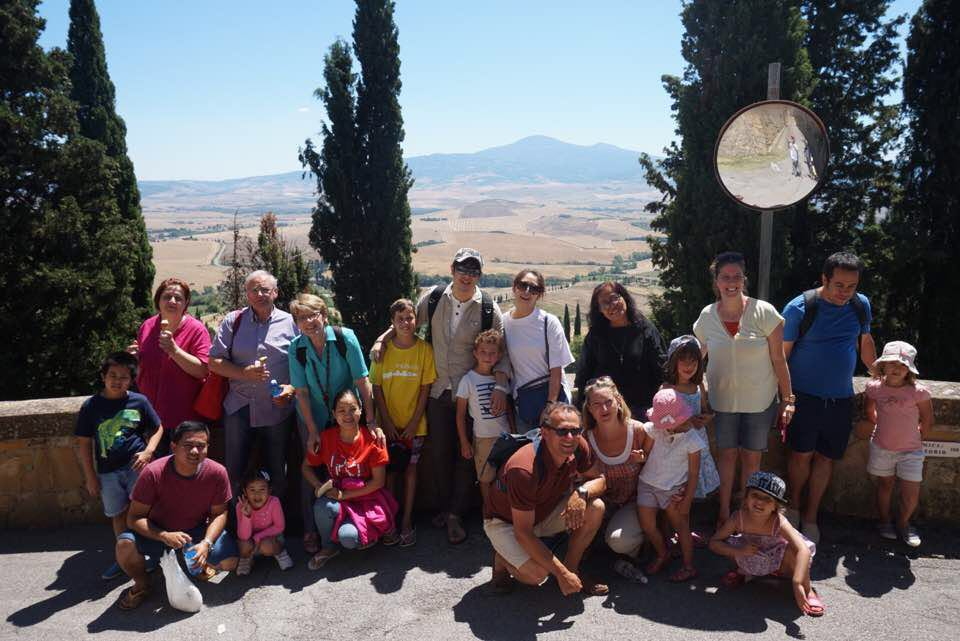
Aug 27, 2016 | Focolare Worldwide
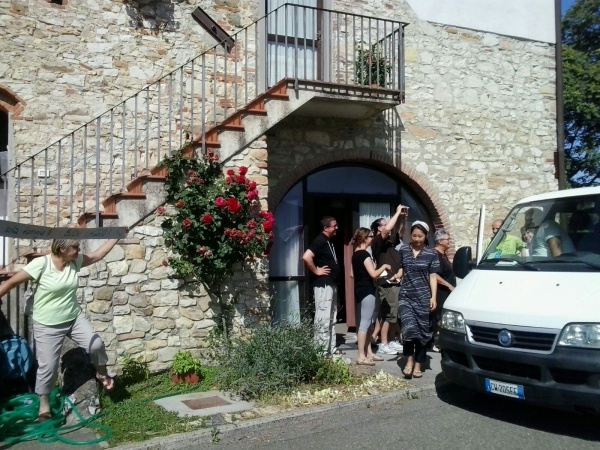 Another year at Loreto School has come to an end and the families have returned to their homes in Brazil, Cameroon and the Czech Republic enriched by a gift that will never be wiped away but shared with the world around them. That doesn’t mean that Loreto School is now on vacation: it continues through the summer months. In the month of July there was series of families that showed up from several regions of Italy, Europe and other countries like Korea, Vietnam and Philippines for a period of vacation in the spirit of the Focolare. They lived and experienced the communion of goods. One donated a new lawn mower, which was useful in trimming the green areas around the lodgings. Another donated an electric sander that was used to brighten up the framing, doors and benches. . .
Another year at Loreto School has come to an end and the families have returned to their homes in Brazil, Cameroon and the Czech Republic enriched by a gift that will never be wiped away but shared with the world around them. That doesn’t mean that Loreto School is now on vacation: it continues through the summer months. In the month of July there was series of families that showed up from several regions of Italy, Europe and other countries like Korea, Vietnam and Philippines for a period of vacation in the spirit of the Focolare. They lived and experienced the communion of goods. One donated a new lawn mower, which was useful in trimming the green areas around the lodgings. Another donated an electric sander that was used to brighten up the framing, doors and benches. . .  Working together to fix up the flats, welcome the families, cut the grass and prune the trees, created an atmosphere of communion, lightened the work and created a sense of joy. People passing through Loppiano also got to shared in that family atmosphere and wanted to learn more about Loreto School and the New Families Movement. There were also opportunities for couples to discuss family issues in a relaxed setting with the help of experts, and the opportunity to take part in events at the permanent Mariapolis. There were many meals in the open air, field trips, moments for relaxation together – all in an atmosphere of evangelical brotherhood which is the law of Loppiano where Loreto School is located. One family from France was there on July 14th in Nice, the day of the terrible massacre along the sea, but they had fortunately decided to watch the fireworks on a hill overlooking the city. This experience taught them that life is a gift, and they felt called to spend the rest of their lives together spreading love to others. When it came time to leave Loppiano, the families, one by one, expressed their wish to return for the same experience next year, saying that despite the hard work they felt completely restored!
Working together to fix up the flats, welcome the families, cut the grass and prune the trees, created an atmosphere of communion, lightened the work and created a sense of joy. People passing through Loppiano also got to shared in that family atmosphere and wanted to learn more about Loreto School and the New Families Movement. There were also opportunities for couples to discuss family issues in a relaxed setting with the help of experts, and the opportunity to take part in events at the permanent Mariapolis. There were many meals in the open air, field trips, moments for relaxation together – all in an atmosphere of evangelical brotherhood which is the law of Loppiano where Loreto School is located. One family from France was there on July 14th in Nice, the day of the terrible massacre along the sea, but they had fortunately decided to watch the fireworks on a hill overlooking the city. This experience taught them that life is a gift, and they felt called to spend the rest of their lives together spreading love to others. When it came time to leave Loppiano, the families, one by one, expressed their wish to return for the same experience next year, saying that despite the hard work they felt completely restored!

Aug 26, 2016 | Non categorizzato
 Student accommodation “I live with six other students in a rented flat. We divided the chores and cleaning shifts,but Franz was not helping out and thus created tension in the group. I tried in vain to remind him. One day, precisely his family was coming to visit, and as an act of love for them, I started cleaning the bathrooms and also Franz’s room. His parents and sister were so pleased with the order they found that before leaving, they went to shop for loads of food that filled the fridge. Since then Franz has become very thoughtful and caring towards others. (F.F. – Austria) The poor helping the poor “That couple was extremely poor and ashamed of it, and their worries reached a peak with the arrival of their first son. The love of other friends warmed their hearts. Struck by the story of an equally poor family, but that believed that God who is a Father never abandons his children, they thought of sharing some of their food with another poor family. And the next day to their surprise, they saw all sorts of foodstuff arriving at their doorstep. In addition, there were also the things their son needed, a cradle, baby clothes, bathtub….…” (J.E. – Brazil)
Student accommodation “I live with six other students in a rented flat. We divided the chores and cleaning shifts,but Franz was not helping out and thus created tension in the group. I tried in vain to remind him. One day, precisely his family was coming to visit, and as an act of love for them, I started cleaning the bathrooms and also Franz’s room. His parents and sister were so pleased with the order they found that before leaving, they went to shop for loads of food that filled the fridge. Since then Franz has become very thoughtful and caring towards others. (F.F. – Austria) The poor helping the poor “That couple was extremely poor and ashamed of it, and their worries reached a peak with the arrival of their first son. The love of other friends warmed their hearts. Struck by the story of an equally poor family, but that believed that God who is a Father never abandons his children, they thought of sharing some of their food with another poor family. And the next day to their surprise, they saw all sorts of foodstuff arriving at their doorstep. In addition, there were also the things their son needed, a cradle, baby clothes, bathtub….…” (J.E. – Brazil)  Praying for rain “That evening I felt very tired and wanted to tell the kids to say their night prayers by themselves in the room so I could immediately go to bed. But John, our eldest, asked if we could say the rosary to pray for rain: in fact, it hadn’t rained for a long time and the corn and sweet potatoes we had planted really needed it. To our surprise, that same night it started to rain and continued up to the afternoon of the next day.” (B. M. – Uganda) The armchairs “In our place, most parents incur so many debts for the weddings of their daughters and consequently have to work all their lives to paythem. For my wedding I made my parents spend as little as possible, confiding in Divine Providence. One day I went with my mom to the furniture shop. At the end he said,«Usually the other girls are never satisfied with what they find… but you are different. I would like to ask you to pray for my son who is very sick.». I assured him that I would do so, and he gave me two armchairs as a wedding gift: it was exactly what I needed.” (C. J. – Pakistan).
Praying for rain “That evening I felt very tired and wanted to tell the kids to say their night prayers by themselves in the room so I could immediately go to bed. But John, our eldest, asked if we could say the rosary to pray for rain: in fact, it hadn’t rained for a long time and the corn and sweet potatoes we had planted really needed it. To our surprise, that same night it started to rain and continued up to the afternoon of the next day.” (B. M. – Uganda) The armchairs “In our place, most parents incur so many debts for the weddings of their daughters and consequently have to work all their lives to paythem. For my wedding I made my parents spend as little as possible, confiding in Divine Providence. One day I went with my mom to the furniture shop. At the end he said,«Usually the other girls are never satisfied with what they find… but you are different. I would like to ask you to pray for my son who is very sick.». I assured him that I would do so, and he gave me two armchairs as a wedding gift: it was exactly what I needed.” (C. J. – Pakistan).
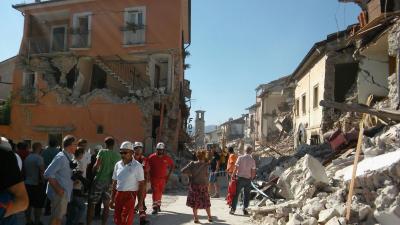
Aug 25, 2016 | Focolare Worldwide, Senza categoria
 “It’s the day after the earthquake that shook central Italy. As we write, the number of victims has reached 247 people and is rising. Many were children because they are often left with their grandparents during the summer months in Amatrice, Accumoli, Arquata and Pescara Tonto. More than 4,000 people have had to leave their homes in the two regions most damaged by the quake: Lazio and Marche. The aftershocks never end.” “The real face of this growing tragedy is the generosity of the many volunteers that arrived on the scene immediately and in great numbers, working non-stop at digging, first with their bare hands, then with buckets and finally with more sophisticated equipment. The willingness of the local people was also immediate providing basic needs, standing in lines for hours at the hospital to donate blood and to sleeping in tents in order to continue offering help and comfort.” “Ever since yesterday at 3:30 when we were awakened by the first shock, we have been directly following events in constant contact with the many people of the Movement that live in these regions. We were glad to hear about the Gen and his grandfather who were removed alive from the rubble; also the father-in-law and sister-in-law of a married focolarina. We were holding our breath all day long wondering about Rita, her niece and nephew – fourteen year old Elisa, twelve year old Gabriele and their grandmother who were still buried in the rubble. In the evening we received a message from their mother: “They all went to Jesus.” Other members of the Movement who were vacationing in Amatrice managed to reach safety.” “For all of us it was an opportunity to pull together in unity and live for others. From Umbria they write: “Thank you for your prayers and unity that have spread like a chain through the whole Movement in Umbria and supported us during this night of fear and trembling. Hearing that we were all alive made us thank God, and then our thoughts went to the ones who were still trapped beneath the rubble and to those who had lost everything. The fact of going online supported us and allowed us to follow events in the worst areas in real time. Elisabetta from Assisi told us that our message arrived at precisely the worst moment and brought her peace. We feel like a family more than ever. The Gen are online ready to offer support and are in the process of going into the worst hit cities to offer help. The adults are also willing to get involved concretely. Meanwhile, we promise to pray for those families that have suffered great loss.” “Right away messages were being sent out that told of the needs and the possibilities of assistance, primarily with the help of the Civil Protection and others. In Ascoli where we work alongside other associations, we began a clothing drive. The same was true in Lazio where the people from Abruzzese who are experts after the earthquake of Aquila (2009), mapped out lodging sites for the evacuees. Other regions have also offered lodging.” “We continue to stay connected with everyone and gradually understand how we can concretely respond to all this suffering in which we see the “face” of Jesus Forsaken.”
“It’s the day after the earthquake that shook central Italy. As we write, the number of victims has reached 247 people and is rising. Many were children because they are often left with their grandparents during the summer months in Amatrice, Accumoli, Arquata and Pescara Tonto. More than 4,000 people have had to leave their homes in the two regions most damaged by the quake: Lazio and Marche. The aftershocks never end.” “The real face of this growing tragedy is the generosity of the many volunteers that arrived on the scene immediately and in great numbers, working non-stop at digging, first with their bare hands, then with buckets and finally with more sophisticated equipment. The willingness of the local people was also immediate providing basic needs, standing in lines for hours at the hospital to donate blood and to sleeping in tents in order to continue offering help and comfort.” “Ever since yesterday at 3:30 when we were awakened by the first shock, we have been directly following events in constant contact with the many people of the Movement that live in these regions. We were glad to hear about the Gen and his grandfather who were removed alive from the rubble; also the father-in-law and sister-in-law of a married focolarina. We were holding our breath all day long wondering about Rita, her niece and nephew – fourteen year old Elisa, twelve year old Gabriele and their grandmother who were still buried in the rubble. In the evening we received a message from their mother: “They all went to Jesus.” Other members of the Movement who were vacationing in Amatrice managed to reach safety.” “For all of us it was an opportunity to pull together in unity and live for others. From Umbria they write: “Thank you for your prayers and unity that have spread like a chain through the whole Movement in Umbria and supported us during this night of fear and trembling. Hearing that we were all alive made us thank God, and then our thoughts went to the ones who were still trapped beneath the rubble and to those who had lost everything. The fact of going online supported us and allowed us to follow events in the worst areas in real time. Elisabetta from Assisi told us that our message arrived at precisely the worst moment and brought her peace. We feel like a family more than ever. The Gen are online ready to offer support and are in the process of going into the worst hit cities to offer help. The adults are also willing to get involved concretely. Meanwhile, we promise to pray for those families that have suffered great loss.” “Right away messages were being sent out that told of the needs and the possibilities of assistance, primarily with the help of the Civil Protection and others. In Ascoli where we work alongside other associations, we began a clothing drive. The same was true in Lazio where the people from Abruzzese who are experts after the earthquake of Aquila (2009), mapped out lodging sites for the evacuees. Other regions have also offered lodging.” “We continue to stay connected with everyone and gradually understand how we can concretely respond to all this suffering in which we see the “face” of Jesus Forsaken.”
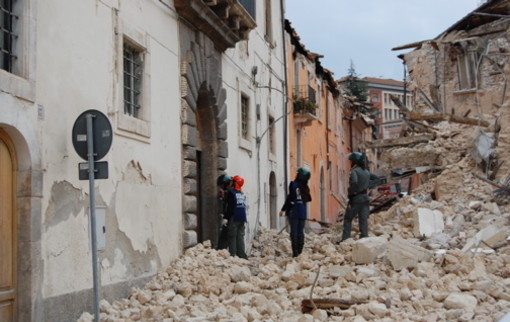
Aug 24, 2016 | Focolare Worldwide
 Messages have been pouring in at the website following the earthquake near Amatrice and Norcia, between the provinces of Rieti and Ascoli Piceno in central Italy. Some tell about extracting a grandfather from the rubble safe and sound; others about rushing a cousin to hospital where they are still waiting. Some express their deep distress over what has happened, while others are trying to help or at least be close to friends and acquaintances who have suffered damage and casualties.” So writes the editor of Città Nuova, the Focolare’s press office in Italy, about the strong 6.0 magnitude earthquake that occurred between the villages of Norcia and Amatrice. The Focolare Movement worldwide expresses its closeness to the populations that were hit by the earthquake in central Italy and offers prayers for the victims, their families and everyone who has suffered material or moral harm. Some Focolare members are all ready at the scene working together with many other volunteers in the arduous task of rescuing people from the ruins and trying to comfort those who have lost loved ones. Coordinated assistance has begun and contributions can be made to the following accounts: CAUSE: Emergenza Terremoto Italia
Messages have been pouring in at the website following the earthquake near Amatrice and Norcia, between the provinces of Rieti and Ascoli Piceno in central Italy. Some tell about extracting a grandfather from the rubble safe and sound; others about rushing a cousin to hospital where they are still waiting. Some express their deep distress over what has happened, while others are trying to help or at least be close to friends and acquaintances who have suffered damage and casualties.” So writes the editor of Città Nuova, the Focolare’s press office in Italy, about the strong 6.0 magnitude earthquake that occurred between the villages of Norcia and Amatrice. The Focolare Movement worldwide expresses its closeness to the populations that were hit by the earthquake in central Italy and offers prayers for the victims, their families and everyone who has suffered material or moral harm. Some Focolare members are all ready at the scene working together with many other volunteers in the arduous task of rescuing people from the ruins and trying to comfort those who have lost loved ones. Coordinated assistance has begun and contributions can be made to the following accounts: CAUSE: Emergenza Terremoto Italia
| Azione per un Mondo Unito ONLUS (AMU) |
Azione per Famiglie Nuove ONLUS (AFN) |
| IBAN: IT16 G050 1803 2000 0000 0120 434 at Banca Popolare Etica |
IBAN: IT55 K033 5901 6001 0000 0001 060 at Banca Prossima |
| Code SWIFT/BIC: CCRTIT2184D |
Code SWIFT/BIC: BCITITMX |
Contributions made to either of these accounts for the earthquake emergency cause will be jointly administrated by the Focolare’s Action for a United World (AMU) and New Families Association (AFN). There are tax benefits attached to such contributions in many countries of the European Union and in other countries.
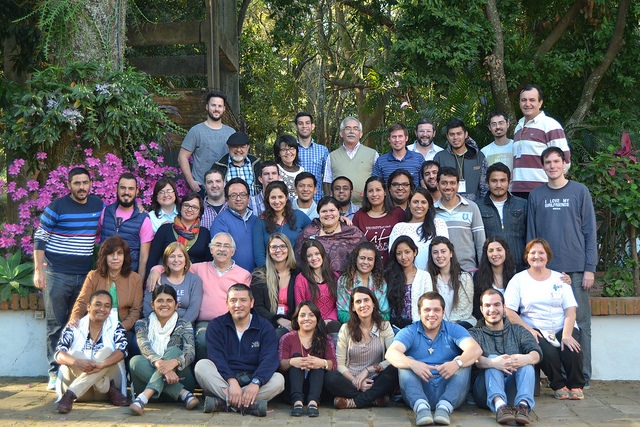
Aug 24, 2016 | Focolare Worldwide
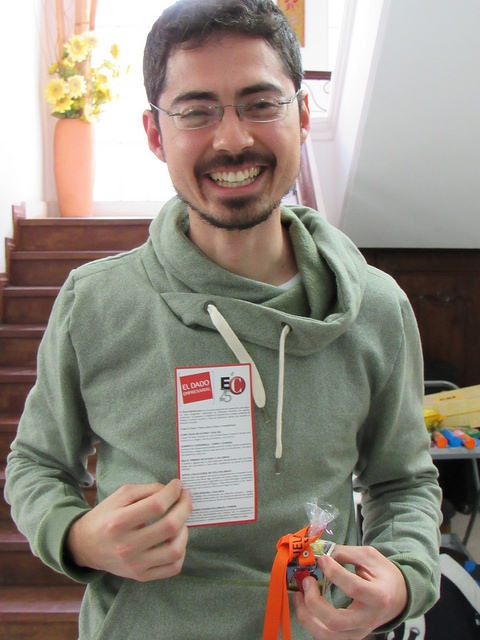 To hear them talk they sound like small heroes, but they don’t feel that they are. They simply believe they are doing the right thing. We not only refer to the established business people from the Economy of Communion (EoC), but also the 30 young aspirants who jumped body and soul into a 5-day adventure of sharing. Thanks to the EoC, Xandra managed to overcome the difficult period her family was going through when she was a teenager, and now she is the one hiring a pair of teenagers in her own beauty salon where she tries to build relationships of reciprocity with customers, suppliers and the society around her. Dalila had to close her business but then was able to get back on her feet and start over again. She swears that despite the crisis in Brazil she isn’t experiencing any of its effects. She says that this is because of the “secret partner” which is how the EoC refers to God’s providential intervention.
To hear them talk they sound like small heroes, but they don’t feel that they are. They simply believe they are doing the right thing. We not only refer to the established business people from the Economy of Communion (EoC), but also the 30 young aspirants who jumped body and soul into a 5-day adventure of sharing. Thanks to the EoC, Xandra managed to overcome the difficult period her family was going through when she was a teenager, and now she is the one hiring a pair of teenagers in her own beauty salon where she tries to build relationships of reciprocity with customers, suppliers and the society around her. Dalila had to close her business but then was able to get back on her feet and start over again. She swears that despite the crisis in Brazil she isn’t experiencing any of its effects. She says that this is because of the “secret partner” which is how the EoC refers to God’s providential intervention. 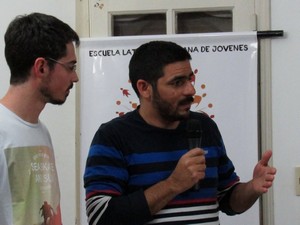 It is a requirement in a summer school for business owners to talk about their failures and learn from each other, especially since the values of the EoC are not often understood by people outside that world. This was the case with Germán e Matías whose projects were ruined and earnings lost because of dishonest partners. The programme that was largely comprised of question-and-answer sessions offered a presentation of the EoC that highlighted the cultural novelty of the project, given by philosopher Cecilia Blanco; the secret of how to overcome difficulties “without fleeing from problems” by building contractor Raúl Di Lascio; a proposal on how to distribute profits and have the foresight to avoid creating dependency in the people that receive assistance; knowing how to distinguish between healthy ambition and status and being well-off.
It is a requirement in a summer school for business owners to talk about their failures and learn from each other, especially since the values of the EoC are not often understood by people outside that world. This was the case with Germán e Matías whose projects were ruined and earnings lost because of dishonest partners. The programme that was largely comprised of question-and-answer sessions offered a presentation of the EoC that highlighted the cultural novelty of the project, given by philosopher Cecilia Blanco; the secret of how to overcome difficulties “without fleeing from problems” by building contractor Raúl Di Lascio; a proposal on how to distribute profits and have the foresight to avoid creating dependency in the people that receive assistance; knowing how to distinguish between healthy ambition and status and being well-off. 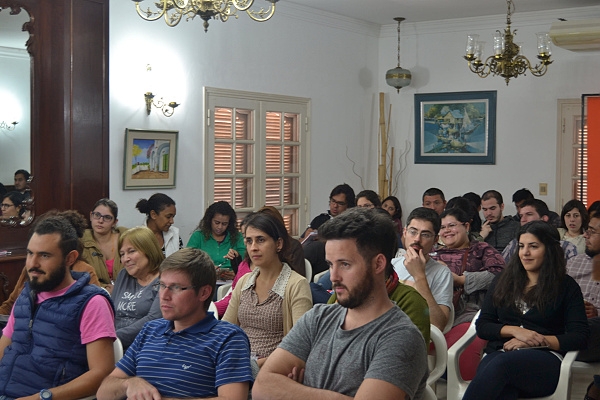 Yamil from Mexico explained the way he managed to involve thirty business owners, young like himself, in promoting interaction. The university noticed that their projects were serious and provided them with resources and know-how. Their “active networking” project that includes fortnightly meetings where personal knowledge can be shared that provide interesting topics for discussion is being welcomed with enthusiasm and results precisely because of the way it creates commercial and operative synergies. Luis Alonso from Mexico presented the new EoC-IIN Economy of Communion International Incubating Network.
Yamil from Mexico explained the way he managed to involve thirty business owners, young like himself, in promoting interaction. The university noticed that their projects were serious and provided them with resources and know-how. Their “active networking” project that includes fortnightly meetings where personal knowledge can be shared that provide interesting topics for discussion is being welcomed with enthusiasm and results precisely because of the way it creates commercial and operative synergies. Luis Alonso from Mexico presented the new EoC-IIN Economy of Communion International Incubating Network.  The “school trip” included a visit to the San Miguel di Capiatà quarter’s Focolare social project, the EoC’s Dispensa Santa Rita and Todo Brillo businesses. All were quite impressed by the children from the Unipar School of San Miguel who seemed to shine with the love they learn (and teach!) using the Dice of Love, and by the young and old people in that neighbourhood who have become masters of their own destiny thanks to the efficacious efforts at empowerment. Julio and Ninfa run the Dispensa Santa Rita in the popular quarter of Areguá. In order to avoid smuggling they never purchase basic need items in the city of Clorinda on the Argentinean border, but “give up time” arranging local goods in packages that are more appropriately priced for their customers. This made Matías from Paraguay remark: “I understood that the size of a business doesn’t lie in its revenue, but in the values that are lived inside that business.” Uruguayan professor Juan José Medeiros gave a presentation on Wealth and Poverty in the EoC” and Paraguayan historian Diana Durán brought an original touch with her presentation on the similarities between the EoC and the social and economic culture of the Guaraní indigenous people whose lineage can be traced back to the very roots of Paraguay. There was a long and stimulating Skype conversation with Luigi Bruni, Anouk Grevin and Luca Crivelli from the EoC’s Central Commission, and another discussion with Rebeca Gomez Tafalla and Florencia Locascio from EoC-inn which concluded the programme. Upcoming events: September conference in Salta, Argentina; EoC-INN, in Cuba. Source: EoC online
The “school trip” included a visit to the San Miguel di Capiatà quarter’s Focolare social project, the EoC’s Dispensa Santa Rita and Todo Brillo businesses. All were quite impressed by the children from the Unipar School of San Miguel who seemed to shine with the love they learn (and teach!) using the Dice of Love, and by the young and old people in that neighbourhood who have become masters of their own destiny thanks to the efficacious efforts at empowerment. Julio and Ninfa run the Dispensa Santa Rita in the popular quarter of Areguá. In order to avoid smuggling they never purchase basic need items in the city of Clorinda on the Argentinean border, but “give up time” arranging local goods in packages that are more appropriately priced for their customers. This made Matías from Paraguay remark: “I understood that the size of a business doesn’t lie in its revenue, but in the values that are lived inside that business.” Uruguayan professor Juan José Medeiros gave a presentation on Wealth and Poverty in the EoC” and Paraguayan historian Diana Durán brought an original touch with her presentation on the similarities between the EoC and the social and economic culture of the Guaraní indigenous people whose lineage can be traced back to the very roots of Paraguay. There was a long and stimulating Skype conversation with Luigi Bruni, Anouk Grevin and Luca Crivelli from the EoC’s Central Commission, and another discussion with Rebeca Gomez Tafalla and Florencia Locascio from EoC-inn which concluded the programme. Upcoming events: September conference in Salta, Argentina; EoC-INN, in Cuba. Source: EoC online
Photo album
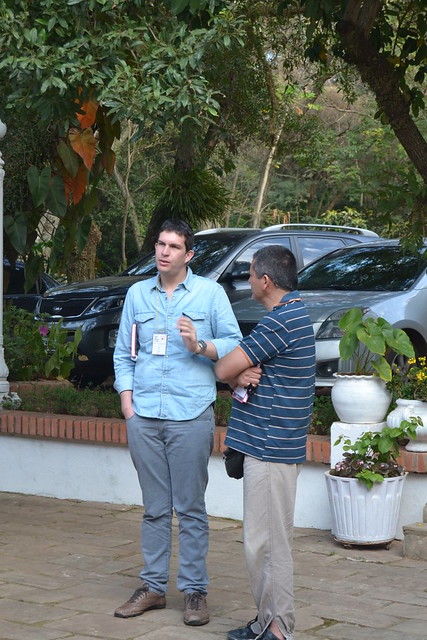
Photo on Flickr
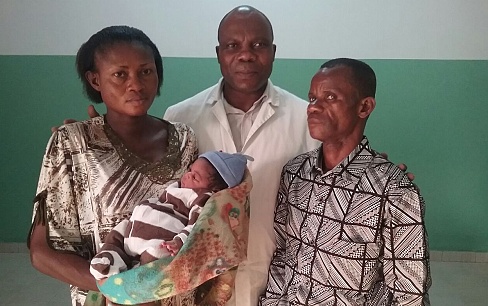
Aug 23, 2016 | Focolare Worldwide
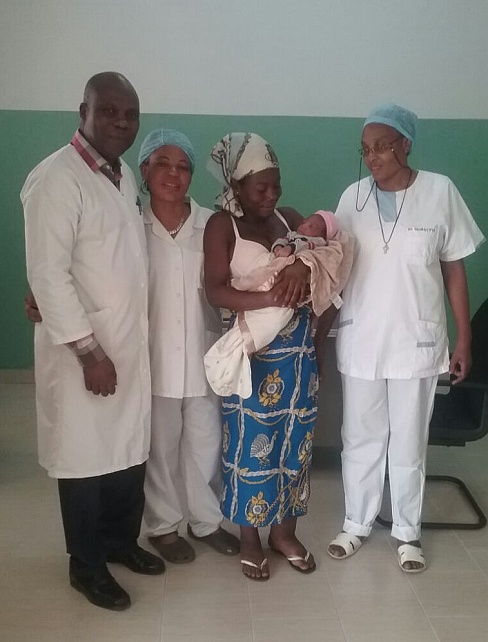 Taking two years to build, with costs that reached €409,559, the new maternity wing of the Medical Centre, “Moyimwa Ntongo” in the Congolese capital was inaugurated precisely on the Centre’s 10th anniversary. The first infant was born last 29 April! It is an essential service, considering that – as the Health Director, Arthur Ngoy affirmed – the mortality rate of infants and mothers in Congo are still very high:”846 maternal deaths over every 100,000 live births” – while the world average is 216 – “and 104 out of 1,000 are the deaths of infants”, one of the highest rates worldwide. “The new department was built through the efforts of several people and agencies related to the Focolare Movement such as the Giancarlo Pallavicini Foundation; Albina Gianotti and Victorina Giussani who have been sponsors of the Medical Centre since the beginning; AMU-Luxembourg and AECOM Congo along with their supporters; many people in Luxembourg, including children who have made and sold small knick-knacks and done odd jobs to earn some money even in winter.” “This medical centre gives us the opportunity to respond concretely to the invitation of the Church in the document, AfricaeMunus (n.140), that urges all the healthcare institutions of the Church and all the people working in these organisations in the most varied roles, to try to see in every patient,a suffering member of the Body of Christ,” affirmed Damien Kasereka, co-director with Ghislaine Kahambu, of the Focolare Movement in Congo.
Taking two years to build, with costs that reached €409,559, the new maternity wing of the Medical Centre, “Moyimwa Ntongo” in the Congolese capital was inaugurated precisely on the Centre’s 10th anniversary. The first infant was born last 29 April! It is an essential service, considering that – as the Health Director, Arthur Ngoy affirmed – the mortality rate of infants and mothers in Congo are still very high:”846 maternal deaths over every 100,000 live births” – while the world average is 216 – “and 104 out of 1,000 are the deaths of infants”, one of the highest rates worldwide. “The new department was built through the efforts of several people and agencies related to the Focolare Movement such as the Giancarlo Pallavicini Foundation; Albina Gianotti and Victorina Giussani who have been sponsors of the Medical Centre since the beginning; AMU-Luxembourg and AECOM Congo along with their supporters; many people in Luxembourg, including children who have made and sold small knick-knacks and done odd jobs to earn some money even in winter.” “This medical centre gives us the opportunity to respond concretely to the invitation of the Church in the document, AfricaeMunus (n.140), that urges all the healthcare institutions of the Church and all the people working in these organisations in the most varied roles, to try to see in every patient,a suffering member of the Body of Christ,” affirmed Damien Kasereka, co-director with Ghislaine Kahambu, of the Focolare Movement in Congo.  “It is a huge satisfaction, “Dr Ngoy commented, “especially for the mothers who had to be transferred to another facility to give birth, after nine months of prenatal checkups in our centre.They felt they were being abandoned just when they most needed us.But it is also because we can respond to the Congolese government’s request to offer complete, continuous and quality treatments. This is why we thank Chiara Lubich who established this centre.” At the inauguration last 9 July,together with the medical team, patients, civil and religious authorities, architect and his team, and journalists, there was also a small delegation from AMU Luxembourg. The thanksgiving mass was celebrated by the auxiliary bishop of Kinshasa, Bishop Bodika, while the ribbon was cut by the Health Minister, Vital Kabuiku, together with the Apostolic Nuncio, Luis Mariano Montemayor, and the auxiliary bishop.
“It is a huge satisfaction, “Dr Ngoy commented, “especially for the mothers who had to be transferred to another facility to give birth, after nine months of prenatal checkups in our centre.They felt they were being abandoned just when they most needed us.But it is also because we can respond to the Congolese government’s request to offer complete, continuous and quality treatments. This is why we thank Chiara Lubich who established this centre.” At the inauguration last 9 July,together with the medical team, patients, civil and religious authorities, architect and his team, and journalists, there was also a small delegation from AMU Luxembourg. The thanksgiving mass was celebrated by the auxiliary bishop of Kinshasa, Bishop Bodika, while the ribbon was cut by the Health Minister, Vital Kabuiku, together with the Apostolic Nuncio, Luis Mariano Montemayor, and the auxiliary bishop.
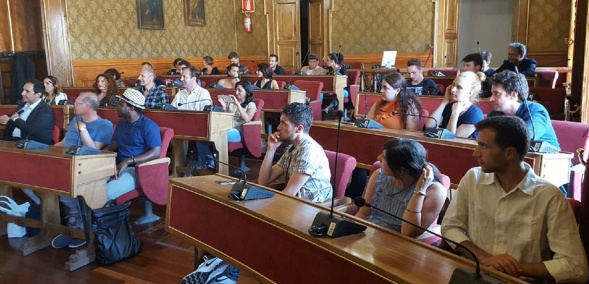
Aug 22, 2016 | Focolare Worldwide
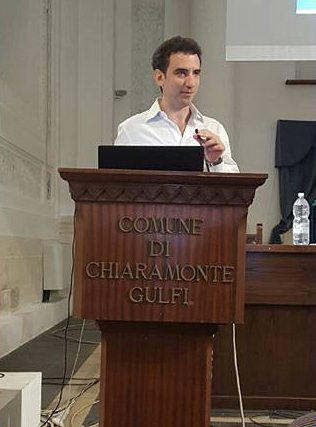 “We live in a world where anxiety and fear are inwardly and also physically destroying us. Let’s try together to bring about a rebirth of goodness and constructive relationships in the pursuit of the common good. I know we’re only like a small drop in the ocean, but just think of a drop of dye when it’s added to a bit of water: the water moves towards the colour of the dye.” This is how Manfred, who attended the Summer School, summarized the event that was organized by Communion and Law in Chiaramonte Gulfi, Italy. Thirty young people from Nigeria, Spain, Germany, Holland and Italy met to discuss: “Law in Europe: Welcome and Rejection: Immigration, Security and Environment”. The final report, which was framed by the university professors and young people themselves, highlighted the deep connection between the lack of protection of the environment that is sometimes the result of “invisible wars” and many armed conflicts – and the subsequent immigrations. Apollos, a Nigerian refugee, brought us into the dramatic experience of being refugees, helping us to make our own their expectations for justice and finding hope for them. The FO.CO. Cooperative that operates in Chiaramonte Gulfi and in other Sicilian cities is one of those roads of hope. Its goal is to obtain diplomas and jobs for refugees, and help them integrate into society. The Chiaramonte experience is bearing fruits in peaceful lives. The dialogue with public institutions was also important. We were received in the Council Chamber of the City of Ragusa where the president of the City Council and some councillors took part in an open discussion with us about the situation of the environment, recycling and citizen involvement in public institutions.
“We live in a world where anxiety and fear are inwardly and also physically destroying us. Let’s try together to bring about a rebirth of goodness and constructive relationships in the pursuit of the common good. I know we’re only like a small drop in the ocean, but just think of a drop of dye when it’s added to a bit of water: the water moves towards the colour of the dye.” This is how Manfred, who attended the Summer School, summarized the event that was organized by Communion and Law in Chiaramonte Gulfi, Italy. Thirty young people from Nigeria, Spain, Germany, Holland and Italy met to discuss: “Law in Europe: Welcome and Rejection: Immigration, Security and Environment”. The final report, which was framed by the university professors and young people themselves, highlighted the deep connection between the lack of protection of the environment that is sometimes the result of “invisible wars” and many armed conflicts – and the subsequent immigrations. Apollos, a Nigerian refugee, brought us into the dramatic experience of being refugees, helping us to make our own their expectations for justice and finding hope for them. The FO.CO. Cooperative that operates in Chiaramonte Gulfi and in other Sicilian cities is one of those roads of hope. Its goal is to obtain diplomas and jobs for refugees, and help them integrate into society. The Chiaramonte experience is bearing fruits in peaceful lives. The dialogue with public institutions was also important. We were received in the Council Chamber of the City of Ragusa where the president of the City Council and some councillors took part in an open discussion with us about the situation of the environment, recycling and citizen involvement in public institutions.  We were struck to hear Pope Francis speak at the WYD about the same topics that we were discussing: the war in Nigeria, the struggle for natural resources; the walls of fear, the need of a new culture, the courage to build bridges beyond our differences and relationships that are respectful of the dignity of every human being. Our own diversity was enriching: not all of us at the school were legal experts, and this allowed for an open and not exclusively technical discussion that was more accessible to the young people. One philosophy teacher remarked: “I think this summer school is a good synthesis, the way it constantly connects theory with daily life. This synergy seems very important in my opinion: theory is useful, but then it needs to be married to daily living.” Christian, the young lawyer and Deputy Mayor whose efforts had largely led to the success of the Summer School, concluded by saying: “It was possible to hold the school here, thanks to the work and precious contribution of many people, and it is something that should continue. It was an experience that went beyond every rosy forecast and that has left a mark: ‘seeds’ of a new culture. This opportunity to meet with other young lawyers was a moving professional experience for me. Their serenity, their sense of duty…. In such a fast-moving world, this is the real challenge: to share ourselves with others.”
We were struck to hear Pope Francis speak at the WYD about the same topics that we were discussing: the war in Nigeria, the struggle for natural resources; the walls of fear, the need of a new culture, the courage to build bridges beyond our differences and relationships that are respectful of the dignity of every human being. Our own diversity was enriching: not all of us at the school were legal experts, and this allowed for an open and not exclusively technical discussion that was more accessible to the young people. One philosophy teacher remarked: “I think this summer school is a good synthesis, the way it constantly connects theory with daily life. This synergy seems very important in my opinion: theory is useful, but then it needs to be married to daily living.” Christian, the young lawyer and Deputy Mayor whose efforts had largely led to the success of the Summer School, concluded by saying: “It was possible to hold the school here, thanks to the work and precious contribution of many people, and it is something that should continue. It was an experience that went beyond every rosy forecast and that has left a mark: ‘seeds’ of a new culture. This opportunity to meet with other young lawyers was a moving professional experience for me. Their serenity, their sense of duty…. In such a fast-moving world, this is the real challenge: to share ourselves with others.”

Aug 20, 2016 | Focolare Worldwide, Senza categoria
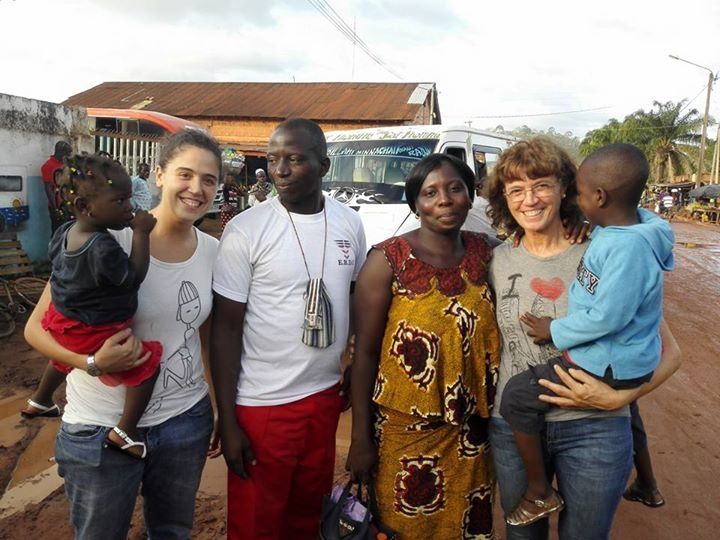 At the beginning of July, at the “Villaggio del Ragazzo” (Teens’ Village) of San Salvatore di Cogorno (Province of Genoa), the “Premio Bontà Don Nando Negri 2016” (Goodness Prize 2016 Fr Nando Negri) was awarded to Veronica Podestà, a young Italian nurse who works at the Benedetto Acquarone Centre in the town of Chiavari, Liguria. Out of her commitment, her enthusiasm, and her tenacity, Veronica could give to Daniel (a boy from Ivory Coast suffering from Tetralogy of Fallot (TOF) congenital heart defect, the opportunity to undergo a surgical operation at the Hospital of Massa, in Northern Italy. Veronica lives in Graveglia di Carasco, a little town of Eastern Liguria overlooking the Entella stream: “Since I have started studying,” she says, “I had a dream: to put my professional competence at the service of others. In 2013, when I had just graduated, I immediately wanted to leave for Africa. Thanks to the advice of a friend, I realized there was a chance to go to Man, Ivory Coast. At first I was supposed to stay only three months, but once there, the months of my staying multiplied! At first it was hard because I did not speak French. Yet, I found out that the universal language is that of Love. Concrete gestures build bridges much more than words.” Veronica goes on sharing and it becomes clear that it was an incredible experience. “At some point, with some girls we decided to organize a small business to sell some items. For several months, after work, we met to craft necklaces, bracelets, etc., and to collect all superfluous items in our homes. The proceeds were put into a common fund to be used in the event of economic problems, or to finance someone’s studies, and so on … One day, one of the girls shared a major difficulty: her father had not received his salary and her family had nothing to eat. All of us agreed to allocate part of the common fund to help her family. I saw a Gospel which was put into practice, and not just contemplated !”.
At the beginning of July, at the “Villaggio del Ragazzo” (Teens’ Village) of San Salvatore di Cogorno (Province of Genoa), the “Premio Bontà Don Nando Negri 2016” (Goodness Prize 2016 Fr Nando Negri) was awarded to Veronica Podestà, a young Italian nurse who works at the Benedetto Acquarone Centre in the town of Chiavari, Liguria. Out of her commitment, her enthusiasm, and her tenacity, Veronica could give to Daniel (a boy from Ivory Coast suffering from Tetralogy of Fallot (TOF) congenital heart defect, the opportunity to undergo a surgical operation at the Hospital of Massa, in Northern Italy. Veronica lives in Graveglia di Carasco, a little town of Eastern Liguria overlooking the Entella stream: “Since I have started studying,” she says, “I had a dream: to put my professional competence at the service of others. In 2013, when I had just graduated, I immediately wanted to leave for Africa. Thanks to the advice of a friend, I realized there was a chance to go to Man, Ivory Coast. At first I was supposed to stay only three months, but once there, the months of my staying multiplied! At first it was hard because I did not speak French. Yet, I found out that the universal language is that of Love. Concrete gestures build bridges much more than words.” Veronica goes on sharing and it becomes clear that it was an incredible experience. “At some point, with some girls we decided to organize a small business to sell some items. For several months, after work, we met to craft necklaces, bracelets, etc., and to collect all superfluous items in our homes. The proceeds were put into a common fund to be used in the event of economic problems, or to finance someone’s studies, and so on … One day, one of the girls shared a major difficulty: her father had not received his salary and her family had nothing to eat. All of us agreed to allocate part of the common fund to help her family. I saw a Gospel which was put into practice, and not just contemplated !”.  It was not always easy: “Sometimes I missed my family, my friends, my habits … but the sky remained always my best friend. When I felt alone, or I had a pain that I could not overcome, I looked up and, looking at the sky, I got lost into the immensity of creation. How much harmony, how much love in everything that was around me … and that Love was for me too!“. And she continues her story: “During my experience in Africa I got to know a boy who had a heart defect at birth. Every time he came, Daniel illuminated our dispensary with a gorgeous smile. Although he had to undergo invasive treatments, the love and joy he emanated were diffusive and contagious. Despite our great efforts, there was a long way to go. He needed more care and more appropriate interventions ….” After a year, Veronica’s experience is over and, upon returning home, she found a surprise: “When I got home, I found all my friends waiting for me in the garden for a surprise party. I was excited and so happy to meet all the people I loved so much. But inside I could not forget about Daniel’s smile when I said goodbye to him. I could not leave him alone … With some friends, then, we set out to see if it was possible having him operated in Italy.” Veronica’s enthusiasm is contagious. After a few weeks, together with her family and friends she organized a fund-raising dinner to allow Daniel to come to Italy for the operation. A month later, Daniel arrived in Italy accompanied by his father and Carlo (a focolarino who had been helping them with all the paperwork). “Two very intense months followed. Thanks to Daniel’s smiles, our respective cultures got enriched and we rediscovered them. Through his eyes I rediscovered the sea, the snow, and the joy of living the present moment.” Meanwhile, Daniel had been successfully operated. His dad had promised him a bicycle if everything would be fine. After the operation, however, he realizes that it was an expensive gift for them to afford… Yet, the love of the community had immediate effects: “Precisely the same night in which Daniel’s father confided to me his difficulty, a friend of mine brings me an envelope. At her birthday party she had presented the story of Daniel. Her friends, instead of gifts, had collected the money just for him. And, incredibly, the envelope contained exactly the sum which was needed to buy the bicycle that Daniel desired so much!” It’s time to say goodbye. We ask Veronica what she learned from this experience. She replies with a wonderful smile, “I had left Italy with the conviction that I had so much to give. And instead, I realized that, every day, I received a lot more than I gave… Often we start with the idea of changing the world; but we realize that in order to do so, we must begin by changing ourselves and our way of being with others. Only by building, moment by moment, bridges of brotherhood we can change the world and enlighten it with many smiles.” Just like Daniel’s smile.
It was not always easy: “Sometimes I missed my family, my friends, my habits … but the sky remained always my best friend. When I felt alone, or I had a pain that I could not overcome, I looked up and, looking at the sky, I got lost into the immensity of creation. How much harmony, how much love in everything that was around me … and that Love was for me too!“. And she continues her story: “During my experience in Africa I got to know a boy who had a heart defect at birth. Every time he came, Daniel illuminated our dispensary with a gorgeous smile. Although he had to undergo invasive treatments, the love and joy he emanated were diffusive and contagious. Despite our great efforts, there was a long way to go. He needed more care and more appropriate interventions ….” After a year, Veronica’s experience is over and, upon returning home, she found a surprise: “When I got home, I found all my friends waiting for me in the garden for a surprise party. I was excited and so happy to meet all the people I loved so much. But inside I could not forget about Daniel’s smile when I said goodbye to him. I could not leave him alone … With some friends, then, we set out to see if it was possible having him operated in Italy.” Veronica’s enthusiasm is contagious. After a few weeks, together with her family and friends she organized a fund-raising dinner to allow Daniel to come to Italy for the operation. A month later, Daniel arrived in Italy accompanied by his father and Carlo (a focolarino who had been helping them with all the paperwork). “Two very intense months followed. Thanks to Daniel’s smiles, our respective cultures got enriched and we rediscovered them. Through his eyes I rediscovered the sea, the snow, and the joy of living the present moment.” Meanwhile, Daniel had been successfully operated. His dad had promised him a bicycle if everything would be fine. After the operation, however, he realizes that it was an expensive gift for them to afford… Yet, the love of the community had immediate effects: “Precisely the same night in which Daniel’s father confided to me his difficulty, a friend of mine brings me an envelope. At her birthday party she had presented the story of Daniel. Her friends, instead of gifts, had collected the money just for him. And, incredibly, the envelope contained exactly the sum which was needed to buy the bicycle that Daniel desired so much!” It’s time to say goodbye. We ask Veronica what she learned from this experience. She replies with a wonderful smile, “I had left Italy with the conviction that I had so much to give. And instead, I realized that, every day, I received a lot more than I gave… Often we start with the idea of changing the world; but we realize that in order to do so, we must begin by changing ourselves and our way of being with others. Only by building, moment by moment, bridges of brotherhood we can change the world and enlighten it with many smiles.” Just like Daniel’s smile.
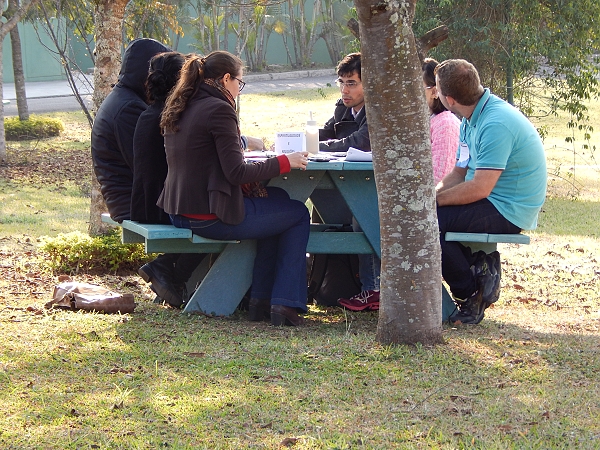
Aug 19, 2016 | Focolare Worldwide
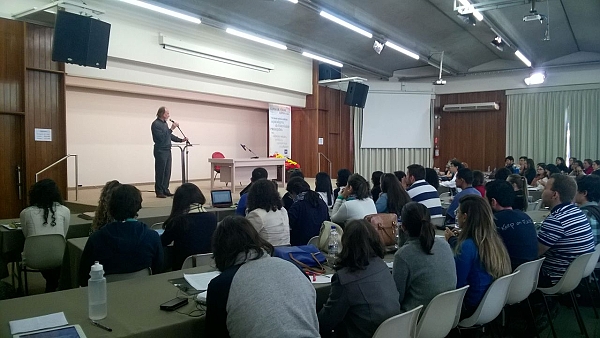 “I was totally demotivated in my profession as an engineer…Now I have rediscovered its importance in another light…” “I am in my second year in architecture. The university presents it in a very commercial light, where the human aspect is missing. This course has exceeded my expectations.” These were just two of the many impressions expressed by the 80 Latin-American university students at the end of the intense week of the course (25-30July), at the Mariapolis Ginetta Congress Centre close to Sao Paulo, Brazil. This cultural initiative promoted by the Sophia Latin-American Academic Centre (ALC) of the Focolare Movement, was an innovative project, well expressed by its title: “The theoretical-practical fundaments of the paradigm of fraternity, projected in the social, political, economic and cultural sciences.”
“I was totally demotivated in my profession as an engineer…Now I have rediscovered its importance in another light…” “I am in my second year in architecture. The university presents it in a very commercial light, where the human aspect is missing. This course has exceeded my expectations.” These were just two of the many impressions expressed by the 80 Latin-American university students at the end of the intense week of the course (25-30July), at the Mariapolis Ginetta Congress Centre close to Sao Paulo, Brazil. This cultural initiative promoted by the Sophia Latin-American Academic Centre (ALC) of the Focolare Movement, was an innovative project, well expressed by its title: “The theoretical-practical fundaments of the paradigm of fraternity, projected in the social, political, economic and cultural sciences.” 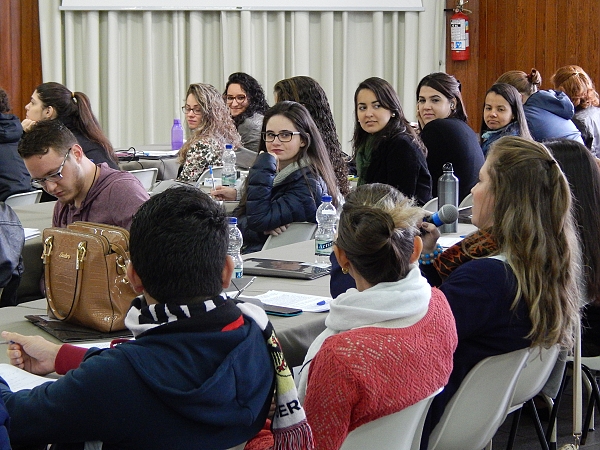 The Latin-American youths penetrated deeply into the wounds that still afflict their peoples: the socio-economic crisis, drama of the indigenous populations, and great issues of the Amazon, the social inequality and violence, of which,” as the Argentine political expert, Juan Esteban Belderrain, commented, “Latin America holds the said world title. In 2012 the number of homicides rose to over 140,000, one third of the world index and over 50,000 in Brazil alone. This sad phenomenon is on the rise. Against this dramatic background the course members delved into the cultural novelty introduced into their own disciplines, to imbue thoughts and lifestyles with the concrete activation of the paradigm of fraternity. For example, as explained by the Brazilian professor, Marconi Aurélio, and Political Sciences professor, Silva, with the application of this paradigm already practised for 20 years, politics overcomes the conflicting dimension, majorities and oppositions are viewed as complementary, part of the truth can also be gathered from opponents, and the participation of citizens is activated.
The Latin-American youths penetrated deeply into the wounds that still afflict their peoples: the socio-economic crisis, drama of the indigenous populations, and great issues of the Amazon, the social inequality and violence, of which,” as the Argentine political expert, Juan Esteban Belderrain, commented, “Latin America holds the said world title. In 2012 the number of homicides rose to over 140,000, one third of the world index and over 50,000 in Brazil alone. This sad phenomenon is on the rise. Against this dramatic background the course members delved into the cultural novelty introduced into their own disciplines, to imbue thoughts and lifestyles with the concrete activation of the paradigm of fraternity. For example, as explained by the Brazilian professor, Marconi Aurélio, and Political Sciences professor, Silva, with the application of this paradigm already practised for 20 years, politics overcomes the conflicting dimension, majorities and oppositions are viewed as complementary, part of the truth can also be gathered from opponents, and the participation of citizens is activated.  This new cultural paradigm was also put into practice in the interpersonal relationships between students and professors of various Latin-American cultures, in an interdisciplinary and multicultural dimension. But there is even more. Starting from the youth who undertook to identify the greater urgencies of their cities and with the support of the professors, projects covering the political, economic and social aspects were laid out and implemented. In conclusion, Prof. Sergio Rondinara of the Sophia University Institute (Italy) of which Sophia ALC is the first extra-European section, expressed great hope in his welcoming speech, and said that this reality gives “a beautiful, crystal-clear view of the future of this continent which has extraordinary potentials.”
This new cultural paradigm was also put into practice in the interpersonal relationships between students and professors of various Latin-American cultures, in an interdisciplinary and multicultural dimension. But there is even more. Starting from the youth who undertook to identify the greater urgencies of their cities and with the support of the professors, projects covering the political, economic and social aspects were laid out and implemented. In conclusion, Prof. Sergio Rondinara of the Sophia University Institute (Italy) of which Sophia ALC is the first extra-European section, expressed great hope in his welcoming speech, and said that this reality gives “a beautiful, crystal-clear view of the future of this continent which has extraordinary potentials.”
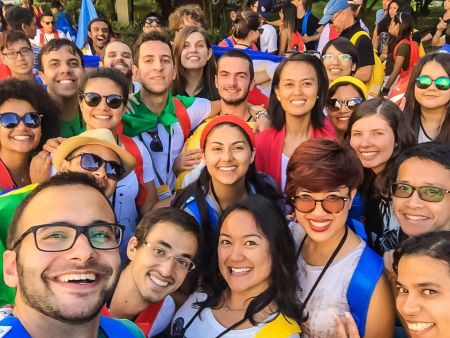
Aug 18, 2016 | Focolare Worldwide
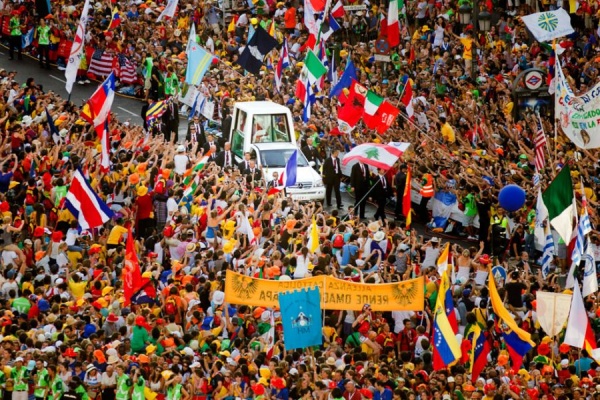 There was much enthusiasm, a desire to know more and to be protagonists of their future at Jasna, Slovakia on August 1-6. “We could never have dreamed that it would be like this. If we refuse to content ourselves with just being comfortable, if we are not couch potatoe Christians, then we will really be able to be protagonists of history,” said young Annita from Argentina when it was time to leave. “The courageous proposals that were offered by Pope Francis at WYD called for an immediate response, but also an understanding that would develop over time and that’s what we tried to do here at Jasna,” explained philosopher Gianluca Falconi. Along with theologian Michel Vandeleene and psychologist Antonella Deponte they offered a multi-disciplinary approach to the Pope’s proposals and how they could be implemented. Francesco from Krakow talked about fighting the fear of spreading peace in a world so filled with hatred. He talked about the value of mercy and of the Cross, of the obstacles that have to be overcome in order to encounter Jesus. But how could these challenges be translated concretely into daily life? The days together in Slovakia offered an opportunity to go into details, to examine the reasons behind things, to ask questions about one’s own life. The internationality of the group provided the possibility of a comparison with other parts of the world: from Lebanon to Australia, from France to the United States, from Russia to Ukraine. The organizers explain that “One of the strongest topics had nothing to do with the existence of God or the big questions of life, but the relationship with the other, the relationship with diversity. These were the themes around which the discussion developed. What came out were issues of a more personal kind, the innate value of each one of us, the chances and the difficulties that relationships with an other can represent, with an enemy, with someone who thinks differently.”
There was much enthusiasm, a desire to know more and to be protagonists of their future at Jasna, Slovakia on August 1-6. “We could never have dreamed that it would be like this. If we refuse to content ourselves with just being comfortable, if we are not couch potatoe Christians, then we will really be able to be protagonists of history,” said young Annita from Argentina when it was time to leave. “The courageous proposals that were offered by Pope Francis at WYD called for an immediate response, but also an understanding that would develop over time and that’s what we tried to do here at Jasna,” explained philosopher Gianluca Falconi. Along with theologian Michel Vandeleene and psychologist Antonella Deponte they offered a multi-disciplinary approach to the Pope’s proposals and how they could be implemented. Francesco from Krakow talked about fighting the fear of spreading peace in a world so filled with hatred. He talked about the value of mercy and of the Cross, of the obstacles that have to be overcome in order to encounter Jesus. But how could these challenges be translated concretely into daily life? The days together in Slovakia offered an opportunity to go into details, to examine the reasons behind things, to ask questions about one’s own life. The internationality of the group provided the possibility of a comparison with other parts of the world: from Lebanon to Australia, from France to the United States, from Russia to Ukraine. The organizers explain that “One of the strongest topics had nothing to do with the existence of God or the big questions of life, but the relationship with the other, the relationship with diversity. These were the themes around which the discussion developed. What came out were issues of a more personal kind, the innate value of each one of us, the chances and the difficulties that relationships with an other can represent, with an enemy, with someone who thinks differently.”  All the questions were based on personal experiences, like that of a young man from Iraq who highlighted the difficulties he is facing in relating to people from his own country. For some, a move in the direction of “the other” proved impossible. Therefore, smaller discussion groups were formed and also opportunities for personal conversations that were more spiritual, psychological or sociological. There were also discussions about the relationship with oneself, autonomy, personal dignity, feelings and open-mindedness. Another topic was the future: choosing a direction for one’s own life. This topic was discussed in a mixed group made up of teenagers, university students and workers, Christians from different Churches, agnostics, non-believers. They spoke in 13 languages and came from a variety of backgrounds, quite a diverse crowd, but alike in their thirst for truth. “It’s not the usual way young people present themselves in today’s society,” commented Gianluca who has had long experience in the field of education. Carla, an Italian remarked: “I’m 15 years old and there were people over thirty in my group. It’s beautiful because I had something to compare myself with, to ask for further explaining and feel assured.” It was an interweaving of generations, languages and cultures: “Philosophy isn’t very appreciated in my own country, because the approach to reality is different,” explained Antoine from Lebanon. “But I’m glad to be able to know other ways of thinking that are different from mine.” The young people take home with them an experience of fraternity that is the antidote to evil. Anna from Milan admits: “The Pope told us to never stop dreaming, and what we’re living now is a dream come true.”
All the questions were based on personal experiences, like that of a young man from Iraq who highlighted the difficulties he is facing in relating to people from his own country. For some, a move in the direction of “the other” proved impossible. Therefore, smaller discussion groups were formed and also opportunities for personal conversations that were more spiritual, psychological or sociological. There were also discussions about the relationship with oneself, autonomy, personal dignity, feelings and open-mindedness. Another topic was the future: choosing a direction for one’s own life. This topic was discussed in a mixed group made up of teenagers, university students and workers, Christians from different Churches, agnostics, non-believers. They spoke in 13 languages and came from a variety of backgrounds, quite a diverse crowd, but alike in their thirst for truth. “It’s not the usual way young people present themselves in today’s society,” commented Gianluca who has had long experience in the field of education. Carla, an Italian remarked: “I’m 15 years old and there were people over thirty in my group. It’s beautiful because I had something to compare myself with, to ask for further explaining and feel assured.” It was an interweaving of generations, languages and cultures: “Philosophy isn’t very appreciated in my own country, because the approach to reality is different,” explained Antoine from Lebanon. “But I’m glad to be able to know other ways of thinking that are different from mine.” The young people take home with them an experience of fraternity that is the antidote to evil. Anna from Milan admits: “The Pope told us to never stop dreaming, and what we’re living now is a dream come true.”
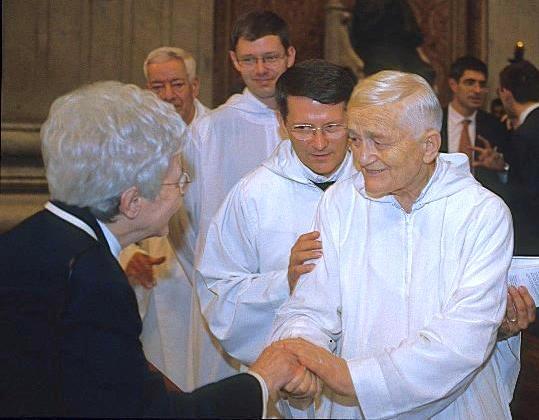
Aug 17, 2016 | Focolare Worldwide
 «Shocked by the news of the sudden death of our dear Frère Roger Schutz, we join the entire Community of Taize in this moment of prayer and deep pain. He had committed his whole life to God and his brethren, and has been crowned with the palm of martyrdom. Frère Roger was a constructor of peace, and a prophet of hope and joy. “God wants us to be happy,“ he had written to me about two months ago, and now we think of him in the fullness of joy in the heart of the Trinity. We are particularly close to you in this situation. We hope that the deep 40-year friendship with Frère Roger and the Community of Taizé, will continue even now that he has gone to Heaven.» Chiara Lubich So also today, we wish to remember him as a builder of peace, and a prophet of hope and joy.
«Shocked by the news of the sudden death of our dear Frère Roger Schutz, we join the entire Community of Taize in this moment of prayer and deep pain. He had committed his whole life to God and his brethren, and has been crowned with the palm of martyrdom. Frère Roger was a constructor of peace, and a prophet of hope and joy. “God wants us to be happy,“ he had written to me about two months ago, and now we think of him in the fullness of joy in the heart of the Trinity. We are particularly close to you in this situation. We hope that the deep 40-year friendship with Frère Roger and the Community of Taizé, will continue even now that he has gone to Heaven.» Chiara Lubich So also today, we wish to remember him as a builder of peace, and a prophet of hope and joy.
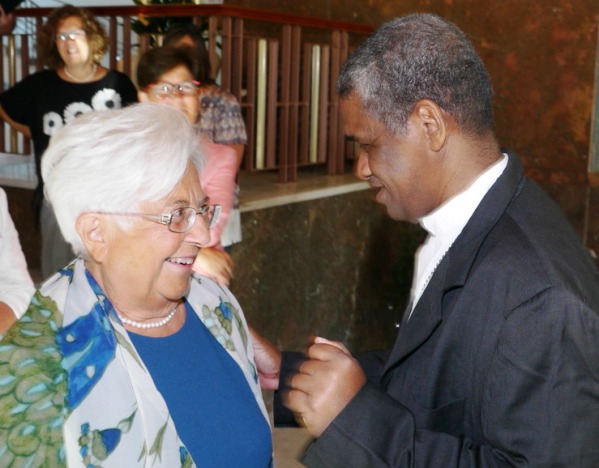
Aug 16, 2016 | Focolare Worldwide
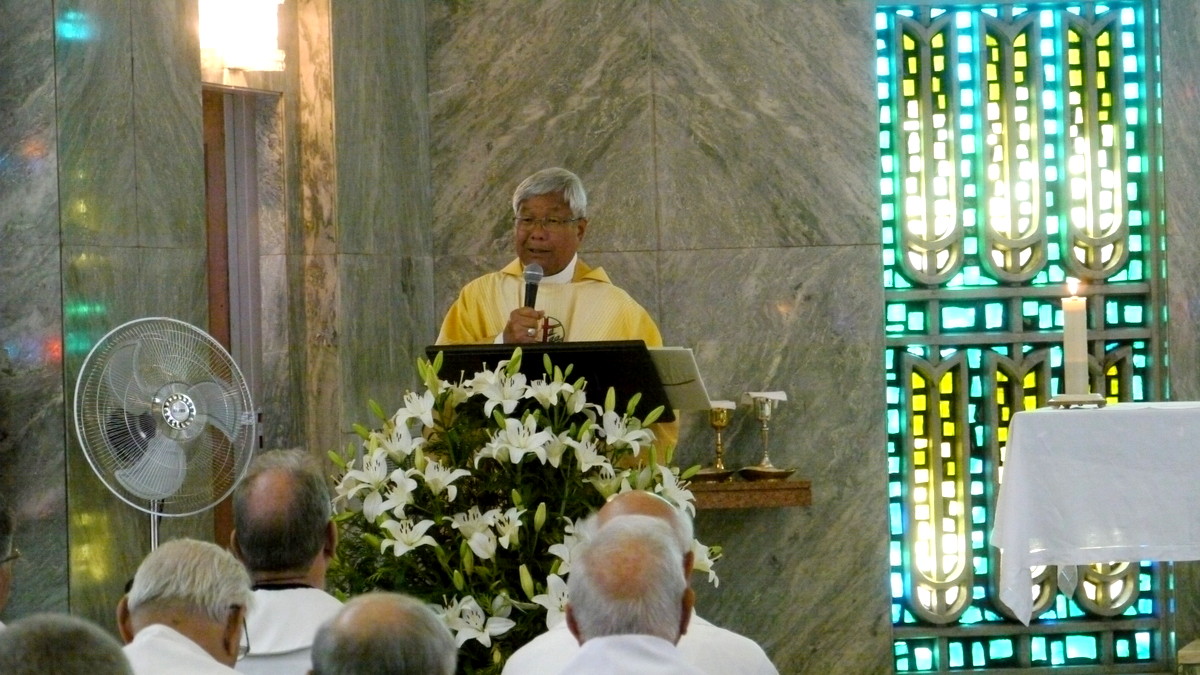 Every summer bishops from around the world gather for a preriod of rest and sharing of their lives while reflecting on being a Church that is instrument and sign of unity in the great variety of settings of the global society that is marked by so many tensions and contradictions. This year they met in Braga, Portugal. “In the Church today it is the moment of unity and communion, the moment when we are being invited to have a collective experience of God. We’re not here only because we’re each bishops, but because we’re brothers. We’d like to be a body of brothers like the first Apostles with Jesus.” These words were spoken by Cardinal João Bráz de Aviz during their Mass inside the Chapel of Apparitions as the 67 bishops from 27 countries made a pilgrimage to Fatima on August 4th.
Every summer bishops from around the world gather for a preriod of rest and sharing of their lives while reflecting on being a Church that is instrument and sign of unity in the great variety of settings of the global society that is marked by so many tensions and contradictions. This year they met in Braga, Portugal. “In the Church today it is the moment of unity and communion, the moment when we are being invited to have a collective experience of God. We’re not here only because we’re each bishops, but because we’re brothers. We’d like to be a body of brothers like the first Apostles with Jesus.” These words were spoken by Cardinal João Bráz de Aviz during their Mass inside the Chapel of Apparitions as the 67 bishops from 27 countries made a pilgrimage to Fatima on August 4th. 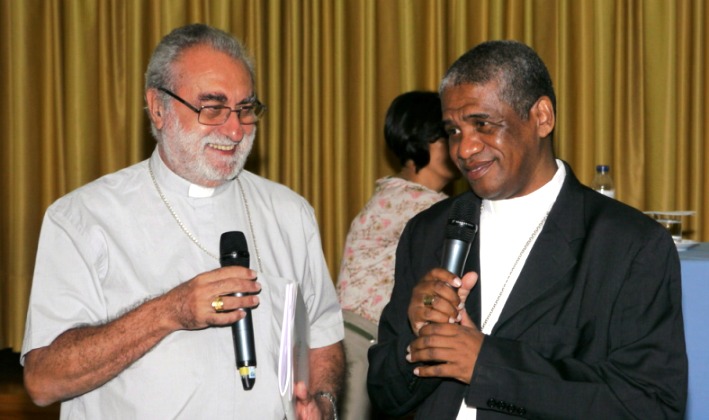 At the conclusion of the gathering Cardinal Francis Xavier Kriengsak Kovithavanij, Archbishop of Bangkok, Thailand summarized their experience in the following way: “We were really happy during these days. We’ve lived like brothers. We felt free and able to open our hearts to one another. Our only Teacher was truly among us. We felt that we were living in the house of Mary.” The bishops were welcomed at Mater Ecclesia Apostolic Centre near the Shrine of Our Lady of Sameiro, by Dom Jorge Ortiga, Archbishop of Braga. It was an appropriate setting for reflecting on the current world scene with international political expert Pasquale Ferrara, and the reform of the Church in the wake of Pope Francis with theologian Piero Coda. It was against this background that the bishops questioned themselves on how to be bishops with a synodal approach and put into practice a culture of shepherding that is marked by communion.
At the conclusion of the gathering Cardinal Francis Xavier Kriengsak Kovithavanij, Archbishop of Bangkok, Thailand summarized their experience in the following way: “We were really happy during these days. We’ve lived like brothers. We felt free and able to open our hearts to one another. Our only Teacher was truly among us. We felt that we were living in the house of Mary.” The bishops were welcomed at Mater Ecclesia Apostolic Centre near the Shrine of Our Lady of Sameiro, by Dom Jorge Ortiga, Archbishop of Braga. It was an appropriate setting for reflecting on the current world scene with international political expert Pasquale Ferrara, and the reform of the Church in the wake of Pope Francis with theologian Piero Coda. It was against this background that the bishops questioned themselves on how to be bishops with a synodal approach and put into practice a culture of shepherding that is marked by communion. 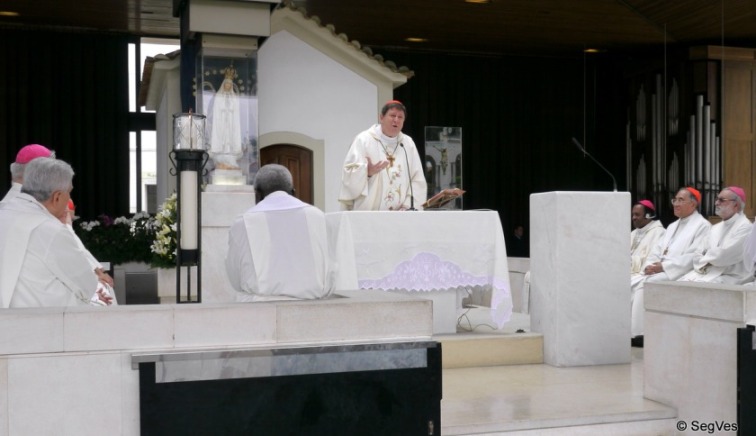 Plenary and small group meetings, walks and meals together were all opportunities to put in common painful situations and signs of hope: the anguished cry that rises from the Church in the Middle East; the growth of fruitful integration between basic ecclesial communities and new Movements and Communities in a large diocese of Brazil that offers a significant example of the Letter Iuvenescit Ecclesia (The Church that Rejuvinates), which was published in June by the Congregation for the Doctrine of the Faith; the challenges and potential of inculturation in a pluralistic context like India; the fruits that can come forth when a bishop and his auxiliaries live the common life and when a bishop manages to make himself a brother and friend of his priests; the arduous task of evangelization in a place like Madagascar that is marked by poverty.
Plenary and small group meetings, walks and meals together were all opportunities to put in common painful situations and signs of hope: the anguished cry that rises from the Church in the Middle East; the growth of fruitful integration between basic ecclesial communities and new Movements and Communities in a large diocese of Brazil that offers a significant example of the Letter Iuvenescit Ecclesia (The Church that Rejuvinates), which was published in June by the Congregation for the Doctrine of the Faith; the challenges and potential of inculturation in a pluralistic context like India; the fruits that can come forth when a bishop and his auxiliaries live the common life and when a bishop manages to make himself a brother and friend of his priests; the arduous task of evangelization in a place like Madagascar that is marked by poverty.  The two-day visit by bishops from other Churches – two Lutherans and one Syro-Orthodox – and an afternnon meeting with seven bishops from Portugal was mutually enriching. The spiritual part of the meeting had two main themes: Christ Crucified, which is one of the carindal points of the spirituality of unity; and love for the Church. These were presented in talks by Focolare president, Maria Voce (Jesus Forsaken, God’s Window & Humanity’s Window); and by co-president Jesús Morán (The Ecclesial Genius of Chiara Lubich and the Charism of Unity).
The two-day visit by bishops from other Churches – two Lutherans and one Syro-Orthodox – and an afternnon meeting with seven bishops from Portugal was mutually enriching. The spiritual part of the meeting had two main themes: Christ Crucified, which is one of the carindal points of the spirituality of unity; and love for the Church. These were presented in talks by Focolare president, Maria Voce (Jesus Forsaken, God’s Window & Humanity’s Window); and by co-president Jesús Morán (The Ecclesial Genius of Chiara Lubich and the Charism of Unity).
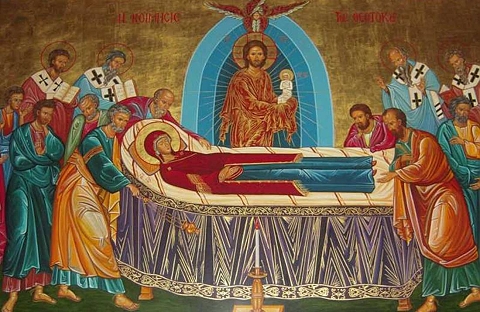
Aug 15, 2016 | Non categorizzato
 After Jesus had died and the Holy Spirit had appeared, Mary disappeared into obscurity. She had accomplished her mission and returned to living in her own element: silent service. She solved the problem of old age by seeking refuge in God, almost a second childhood of the spirit. She teaches how to die. The dying process that provokes fear, in Mary, the Mother, became a returning to her origins by constantly losing herself in God: Life that never ends. And that losing of herself in the Eternal was the death of Mary. It came on the day when the Apostles could do it on their own. But it wasn’t death as we intend it or experience it, but rather something short and sweet that theologians express with a variety of terms: pause, transition, transit, falling-asleep, life-giving-death. . . That virgin body would have been contaminated by the process of decomposition; whereas, having suffered with Christ it couldn’t but immediately rise to glory with Christ. What Resurrection was for Christ, the Assumption was for Mary: a double victory of body and spirit over death. In our times there is the terrifying spectre of the destruction of millions of human beings if not all humankind by atomic weapons, or environmental pollution. There is no way out of it other than reproducing the victory of Jesus and Mary. We must spiritually become Jesus and Mary, agents of life, and this is done by inserting our human nothingness into Divine omnipotence. If we join together in living the Gospel we become the mystical Christ, and if we are made Mary we give Jesus to society, and then war will no longer make sense and the atomic weapon will become a museum piece. There will be peace: the one heart and one soul of a community gathered around the Mother, and its blessed fruit will be unity, the unity of the Living. By rising from this bloody swamp of the earth, to the Heaven of Mary, the Fairest Star of the Sea, we come to a better understanding of the meaning of her Assumption which is the ultimate seal on her unique privilege as the Virgin Mother of God. The materialist should also be moved by this, since it represents the exaltation of the physical body by the power of the Spirit. In Mary we celebrate the redemption of matter and exalt the physical universe that is transfigured into a Temple of the Most High. It’s enough to contemplate even for a moment with the knowledge of love, the place of Mary who rises from earth to Heaven through the cosmos to the full grasp of her identity and of her role. She is the masterpiece of creation. Mary is humble, because no outward highness elevates her; silent, because no human voice seems to be able to define her; poor, because no earthly ornament seems able to decorate her. She speaks only with the language of God’s Word whose richness is only Wisdom of God, grand with the grandness of God. So identified with the Lord, Mary is the human expression of the greatness of the Trinity’s very mind and of its love. She is the Queen – Mistress and Servant – of the Lord’s Dwelling, who opens the doors and lets the children in, occupying herself with welcoming everyone into the palace of the Father, for the glory of the Son in the Seal of the Spirit. She provides mortals with an idea of God who infinitely dominates and overwhelms their intelligence. As if to mediate the power, the wisdom and the love of the ineffable Trinity, God wished to manifest all his power in her. In his infinite originality which humankind would never have tapped, the Creator invented Mary in whose womb the Eternal Word became flesh in our midst and, in his humanity, God became accessible and the Divine Love became part of our home life. Mary among us brings God into our midst. She is the Gate of Heaven. She is taken into Heaven in order to gather the children into the Father’s house. That is why they call on her even a hundred times a day, that she might pray for them now and at the hour of death. (Igino Giordani, Maria modello perfetto, (Rome: Città Nuova, 2012 [1967]), p. 157 – 163.
After Jesus had died and the Holy Spirit had appeared, Mary disappeared into obscurity. She had accomplished her mission and returned to living in her own element: silent service. She solved the problem of old age by seeking refuge in God, almost a second childhood of the spirit. She teaches how to die. The dying process that provokes fear, in Mary, the Mother, became a returning to her origins by constantly losing herself in God: Life that never ends. And that losing of herself in the Eternal was the death of Mary. It came on the day when the Apostles could do it on their own. But it wasn’t death as we intend it or experience it, but rather something short and sweet that theologians express with a variety of terms: pause, transition, transit, falling-asleep, life-giving-death. . . That virgin body would have been contaminated by the process of decomposition; whereas, having suffered with Christ it couldn’t but immediately rise to glory with Christ. What Resurrection was for Christ, the Assumption was for Mary: a double victory of body and spirit over death. In our times there is the terrifying spectre of the destruction of millions of human beings if not all humankind by atomic weapons, or environmental pollution. There is no way out of it other than reproducing the victory of Jesus and Mary. We must spiritually become Jesus and Mary, agents of life, and this is done by inserting our human nothingness into Divine omnipotence. If we join together in living the Gospel we become the mystical Christ, and if we are made Mary we give Jesus to society, and then war will no longer make sense and the atomic weapon will become a museum piece. There will be peace: the one heart and one soul of a community gathered around the Mother, and its blessed fruit will be unity, the unity of the Living. By rising from this bloody swamp of the earth, to the Heaven of Mary, the Fairest Star of the Sea, we come to a better understanding of the meaning of her Assumption which is the ultimate seal on her unique privilege as the Virgin Mother of God. The materialist should also be moved by this, since it represents the exaltation of the physical body by the power of the Spirit. In Mary we celebrate the redemption of matter and exalt the physical universe that is transfigured into a Temple of the Most High. It’s enough to contemplate even for a moment with the knowledge of love, the place of Mary who rises from earth to Heaven through the cosmos to the full grasp of her identity and of her role. She is the masterpiece of creation. Mary is humble, because no outward highness elevates her; silent, because no human voice seems to be able to define her; poor, because no earthly ornament seems able to decorate her. She speaks only with the language of God’s Word whose richness is only Wisdom of God, grand with the grandness of God. So identified with the Lord, Mary is the human expression of the greatness of the Trinity’s very mind and of its love. She is the Queen – Mistress and Servant – of the Lord’s Dwelling, who opens the doors and lets the children in, occupying herself with welcoming everyone into the palace of the Father, for the glory of the Son in the Seal of the Spirit. She provides mortals with an idea of God who infinitely dominates and overwhelms their intelligence. As if to mediate the power, the wisdom and the love of the ineffable Trinity, God wished to manifest all his power in her. In his infinite originality which humankind would never have tapped, the Creator invented Mary in whose womb the Eternal Word became flesh in our midst and, in his humanity, God became accessible and the Divine Love became part of our home life. Mary among us brings God into our midst. She is the Gate of Heaven. She is taken into Heaven in order to gather the children into the Father’s house. That is why they call on her even a hundred times a day, that she might pray for them now and at the hour of death. (Igino Giordani, Maria modello perfetto, (Rome: Città Nuova, 2012 [1967]), p. 157 – 163.

Aug 13, 2016 | Non categorizzato
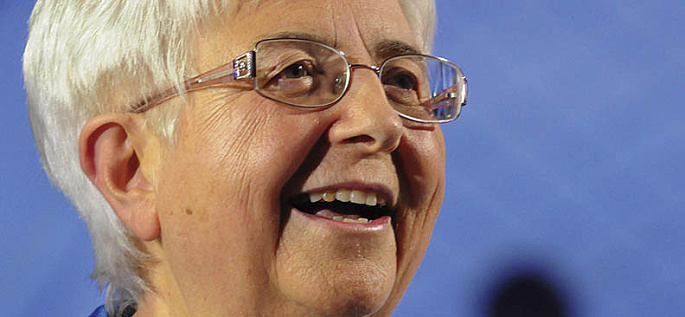 La prima reazione è stata di gratitudine. Nella Iuvenescit Ecclesia il Movimento dei Focolari vede un invito a proseguire nel cammino che l’ha accompagnato fino ad oggi. In particolare il richiamo alla «reciprocità tra doni gerarchici e doni carismatici», alla loro «coessenzialità» sembra interpretare appieno l’esperienza maturata, giorno dopo giorno, dalla nuova realtà ecclesiale fondata da Chiara Lubich. Con l’intervista a Maria Voce, presidente del Movimento dei Focolari, proseguiamo il ciclo dedicato all’approfondimento della lettera della Congregazione per la dottrina della fede, su cui nelle scorse settimane sono intervenuti Salvatore Martinez, presidente nazionale del Rinnovamento nello Spirito Santo e don Julián Carrón, presidente della Fraternità di Comunione e liberazione. «Il documento – sottolinea Maria Voce – parla chiaro: la Chiesa è una, è “un corpo” chiamato a incarnare il mistero di comunione della vita trinitaria. Protagonista del ringiovanimento della Chiesa è lo Spirito Santo che agisce, in particolare, attraverso i carismi. Il documento riconosce dunque ai movimenti una cosa importante: la capacità, se corrispondiamo alla grazia, di rivitalizzare la Chiesa. Con uno scopo chiaro: contribuire a immettere la vita di Dio negli ingranaggi della vita sociale, farla “toccare” dagli uomini e donne immersi nella complessità del nostro mondo. Il punto centrale del documento è la reciprocità, la coessenzialità nella vita della Chiesa tra doni gerarchici e doni carismatici. Si tratta di un richiamo esplicito all’insegnamento conciliare. Sì, mi pare che la lettera ponga in maniera inequivoca una pietra miliare di notevole portata dottrinale, sia nel riferirsi al Concilio Vaticano II, sia nel riconoscere una “convergenza del recente magistero ecclesiale” sulla coessenzialità: medesima origine e medesimo fine dei doni gerarchici e dei doni carismatici, tema che in questi anni non era stato recepito sufficientemente e aspettava un approfondimento.
La prima reazione è stata di gratitudine. Nella Iuvenescit Ecclesia il Movimento dei Focolari vede un invito a proseguire nel cammino che l’ha accompagnato fino ad oggi. In particolare il richiamo alla «reciprocità tra doni gerarchici e doni carismatici», alla loro «coessenzialità» sembra interpretare appieno l’esperienza maturata, giorno dopo giorno, dalla nuova realtà ecclesiale fondata da Chiara Lubich. Con l’intervista a Maria Voce, presidente del Movimento dei Focolari, proseguiamo il ciclo dedicato all’approfondimento della lettera della Congregazione per la dottrina della fede, su cui nelle scorse settimane sono intervenuti Salvatore Martinez, presidente nazionale del Rinnovamento nello Spirito Santo e don Julián Carrón, presidente della Fraternità di Comunione e liberazione. «Il documento – sottolinea Maria Voce – parla chiaro: la Chiesa è una, è “un corpo” chiamato a incarnare il mistero di comunione della vita trinitaria. Protagonista del ringiovanimento della Chiesa è lo Spirito Santo che agisce, in particolare, attraverso i carismi. Il documento riconosce dunque ai movimenti una cosa importante: la capacità, se corrispondiamo alla grazia, di rivitalizzare la Chiesa. Con uno scopo chiaro: contribuire a immettere la vita di Dio negli ingranaggi della vita sociale, farla “toccare” dagli uomini e donne immersi nella complessità del nostro mondo. Il punto centrale del documento è la reciprocità, la coessenzialità nella vita della Chiesa tra doni gerarchici e doni carismatici. Si tratta di un richiamo esplicito all’insegnamento conciliare. Sì, mi pare che la lettera ponga in maniera inequivoca una pietra miliare di notevole portata dottrinale, sia nel riferirsi al Concilio Vaticano II, sia nel riconoscere una “convergenza del recente magistero ecclesiale” sulla coessenzialità: medesima origine e medesimo fine dei doni gerarchici e dei doni carismatici, tema che in questi anni non era stato recepito sufficientemente e aspettava un approfondimento.  Una coessenzialità che voi sottolineate far parte da sempre della vostra esperienza. Dagli inizi il Movimento dei Focolari ha teso a questo intimo rapporto con chi nella Chiesa aveva il carisma del discernimento. Lo si vede, ad esempio, dalla lunga storia della sua approvazione, inseguita con determinazione adamantina e fiducia totale, a volte nella sofferenza, da Chiara Lubich e da quanti generavano con lei questa nuova creatura. La narra lei stessa nel suo libro “Il Grido”. I riconoscimenti poi, come si sa, sono arrivati abbondanti. Anche altri rappresentanti di Chiese cristiane hanno voluto esplicitare il proprio riconoscimento, a cominciare dal patriarca ecumenico Athenagoras I, dal vescovo luterano Hermann Dietzfelbinger, dal primate anglicano Michael Ramsey e da tanti altri. La lettera sottolinea che non può esistere contrapposizione tra Chiesa delle istituzioni e Chiesa della carità. Che significa da una parte rinunciare a ogni presunzione istituzionale, dall’altra all’autoreferenzialità. In che modo si possono evitare questi rischi? Vivendo ciascuno per lo scopo per cui la Chiesa esiste: l’umanità intera. Nel concreto e nel locale avviene poi il reciproco implementarsi con la ricchezza di ciascuno. La fraternità universale esige l’impegno di tutti e richiede infiniti piccoli passi. Dal 30 giugno al 2 luglio, ad esempio, 300 movimenti e comunità nati in seno alla Chiesa cattolica e a molte altre Chiese si sono dati appuntamento a Monaco, in Germania. ‘Insieme per l’Europa’, è un cammino iniziato nel 1999 e che continua insieme per il bene di questo continente, che deve riscoprire se stesso e ha gravi doveri verso il resto del mondo. E per realizzare l’armonia di cui parla il documento, come e dove bisogna operare? Credo che dobbiamo procedere con fiducia sulla strada che indica. Forse occorre approfondire maggiormente le conseguenze del riconoscere la coessenzialità tra doni gerarchici e carismatici. Bisogna pensare come avviare nella pratica una profonda e concreta partecipazione di ambedue aspetti ai vari livelli della Chiesa. Non basta la constatazione, mi sembra che si debbano trovare anche le modalità operative per procedere insieme. Uno slogan per il documento potrebbe essere quello di “Unirsi per una Chiesa in uscita”. Come interpretare questo impegno? Quella dei dialoghi è la via percorsa dai Focolari, manifestatisi via via con chiarezza, legati a fatti precisi e a incontri con persone concrete. Non quindi strategia, ma sostanza della relazione nel vicendevole riconoscimento e nel reciproco amore. Da qui il maturare del dialogo all’interno delle proprie Chiese, tra le chiese cristiane, con le altre religioni, con persone di riferimento non religioso, con la cultura contemporanea. Alcuni interpreti sottolineano come papa Francesco sia spesso un tantino severo verso i movimenti. È così? Non lo ritengo severo. Trovo sintonia fra le sue parole e gesti e il vissuto dei movimenti. È uno dei Papi che più è entrato in contatto con essi partecipando a manifestazioni o nelle udienze. Così con il Rinnovamento nello Spirito, Cammino Neocatecumenale, Comunione e Liberazione, Schoenstatt… Lo ha fatto anche con i Focolari ricevendo i 600 partecipanti all’Assemblea generale del 2014. Certe sue precisazioni che ad osservatori esterni possono risultare rimproveri, spronano i movimenti a vivere il proprio carisma, ad essere più fedeli allo Spirito Santo per meglio contribuire alla Chiesa comunione. Nitide le sue parole dello scorso aprile nella sua inaspettata visita alla Mariapoli di Roma a Villa Borghese. Con un’immagine, ha sottolineato l’importanza e la capacità dei movimenti di vivificare i vari ambienti: «trasformate i deserti in foresta». L’ultima parte del documento contiene l’invito a guardare a Maria. Un “richiamo” che in qualche modo fa parte del vostro stesso essere Movimento. Maria è la carismatica per eccellenza e ciò la pone al centro della Chiesa nascente, custode della presenza del Risorto fra gli apostoli che, in una Chiesa che non sapeva ancora di essere tale, solo lei poteva bene interpretare. «La dimensione mariana della Chiesa precede la sua dimensione petrina», scrive Giovanni Paolo II nella Mulieris dignitatem: infatti non siamo i cristiani a “fare” la Chiesa ma è il Risorto che ci precede. Da qui il richiamo al Movimento dei Focolari, chiamato dal suo specifico carisma a generare Gesù spiritualmente laddove i suoi membri vivono. Una vocazione descritta negli Statuti con parole forti: essere – per quanto è possibile – una continuazione di Maria, proprio in quella sua specifica opera di dare al mondo Cristo. Il vostro obiettivo, mi corregga se sbaglio, è edificare tutti insieme la civiltà nuova dell’amore. Dove bisogna operare soprattutto in questi tempi? Quali le periferie in cui è necessario essere presenti? Le periferie sono là dove c’è un di più di sofferenza. Papa Francesco non smette di indicarle. Non sono solo le povertà materiali ma anche quelle spirituali: la perdita di senso, lo smarrimento delle radici cristiane in un’Europa logorata dal consumismo, dall’edonismo, dal potere economico e tecnologico, la devastazione del creato, le stragi, il dramma umanitario dei rifugiati e le migrazioni di massa, i tanti conflitti armati. Le periferie sono infinite. Non si tratta di fare tutti insieme la stessa cosa, ma di lavorare insieme con lo stesso scopo: trasformare il deserto in foresta. Riccardo Maccioni, 7 agosto 2016 Pdf dell’intervista
Una coessenzialità che voi sottolineate far parte da sempre della vostra esperienza. Dagli inizi il Movimento dei Focolari ha teso a questo intimo rapporto con chi nella Chiesa aveva il carisma del discernimento. Lo si vede, ad esempio, dalla lunga storia della sua approvazione, inseguita con determinazione adamantina e fiducia totale, a volte nella sofferenza, da Chiara Lubich e da quanti generavano con lei questa nuova creatura. La narra lei stessa nel suo libro “Il Grido”. I riconoscimenti poi, come si sa, sono arrivati abbondanti. Anche altri rappresentanti di Chiese cristiane hanno voluto esplicitare il proprio riconoscimento, a cominciare dal patriarca ecumenico Athenagoras I, dal vescovo luterano Hermann Dietzfelbinger, dal primate anglicano Michael Ramsey e da tanti altri. La lettera sottolinea che non può esistere contrapposizione tra Chiesa delle istituzioni e Chiesa della carità. Che significa da una parte rinunciare a ogni presunzione istituzionale, dall’altra all’autoreferenzialità. In che modo si possono evitare questi rischi? Vivendo ciascuno per lo scopo per cui la Chiesa esiste: l’umanità intera. Nel concreto e nel locale avviene poi il reciproco implementarsi con la ricchezza di ciascuno. La fraternità universale esige l’impegno di tutti e richiede infiniti piccoli passi. Dal 30 giugno al 2 luglio, ad esempio, 300 movimenti e comunità nati in seno alla Chiesa cattolica e a molte altre Chiese si sono dati appuntamento a Monaco, in Germania. ‘Insieme per l’Europa’, è un cammino iniziato nel 1999 e che continua insieme per il bene di questo continente, che deve riscoprire se stesso e ha gravi doveri verso il resto del mondo. E per realizzare l’armonia di cui parla il documento, come e dove bisogna operare? Credo che dobbiamo procedere con fiducia sulla strada che indica. Forse occorre approfondire maggiormente le conseguenze del riconoscere la coessenzialità tra doni gerarchici e carismatici. Bisogna pensare come avviare nella pratica una profonda e concreta partecipazione di ambedue aspetti ai vari livelli della Chiesa. Non basta la constatazione, mi sembra che si debbano trovare anche le modalità operative per procedere insieme. Uno slogan per il documento potrebbe essere quello di “Unirsi per una Chiesa in uscita”. Come interpretare questo impegno? Quella dei dialoghi è la via percorsa dai Focolari, manifestatisi via via con chiarezza, legati a fatti precisi e a incontri con persone concrete. Non quindi strategia, ma sostanza della relazione nel vicendevole riconoscimento e nel reciproco amore. Da qui il maturare del dialogo all’interno delle proprie Chiese, tra le chiese cristiane, con le altre religioni, con persone di riferimento non religioso, con la cultura contemporanea. Alcuni interpreti sottolineano come papa Francesco sia spesso un tantino severo verso i movimenti. È così? Non lo ritengo severo. Trovo sintonia fra le sue parole e gesti e il vissuto dei movimenti. È uno dei Papi che più è entrato in contatto con essi partecipando a manifestazioni o nelle udienze. Così con il Rinnovamento nello Spirito, Cammino Neocatecumenale, Comunione e Liberazione, Schoenstatt… Lo ha fatto anche con i Focolari ricevendo i 600 partecipanti all’Assemblea generale del 2014. Certe sue precisazioni che ad osservatori esterni possono risultare rimproveri, spronano i movimenti a vivere il proprio carisma, ad essere più fedeli allo Spirito Santo per meglio contribuire alla Chiesa comunione. Nitide le sue parole dello scorso aprile nella sua inaspettata visita alla Mariapoli di Roma a Villa Borghese. Con un’immagine, ha sottolineato l’importanza e la capacità dei movimenti di vivificare i vari ambienti: «trasformate i deserti in foresta». L’ultima parte del documento contiene l’invito a guardare a Maria. Un “richiamo” che in qualche modo fa parte del vostro stesso essere Movimento. Maria è la carismatica per eccellenza e ciò la pone al centro della Chiesa nascente, custode della presenza del Risorto fra gli apostoli che, in una Chiesa che non sapeva ancora di essere tale, solo lei poteva bene interpretare. «La dimensione mariana della Chiesa precede la sua dimensione petrina», scrive Giovanni Paolo II nella Mulieris dignitatem: infatti non siamo i cristiani a “fare” la Chiesa ma è il Risorto che ci precede. Da qui il richiamo al Movimento dei Focolari, chiamato dal suo specifico carisma a generare Gesù spiritualmente laddove i suoi membri vivono. Una vocazione descritta negli Statuti con parole forti: essere – per quanto è possibile – una continuazione di Maria, proprio in quella sua specifica opera di dare al mondo Cristo. Il vostro obiettivo, mi corregga se sbaglio, è edificare tutti insieme la civiltà nuova dell’amore. Dove bisogna operare soprattutto in questi tempi? Quali le periferie in cui è necessario essere presenti? Le periferie sono là dove c’è un di più di sofferenza. Papa Francesco non smette di indicarle. Non sono solo le povertà materiali ma anche quelle spirituali: la perdita di senso, lo smarrimento delle radici cristiane in un’Europa logorata dal consumismo, dall’edonismo, dal potere economico e tecnologico, la devastazione del creato, le stragi, il dramma umanitario dei rifugiati e le migrazioni di massa, i tanti conflitti armati. Le periferie sono infinite. Non si tratta di fare tutti insieme la stessa cosa, ma di lavorare insieme con lo stesso scopo: trasformare il deserto in foresta. Riccardo Maccioni, 7 agosto 2016 Pdf dell’intervista
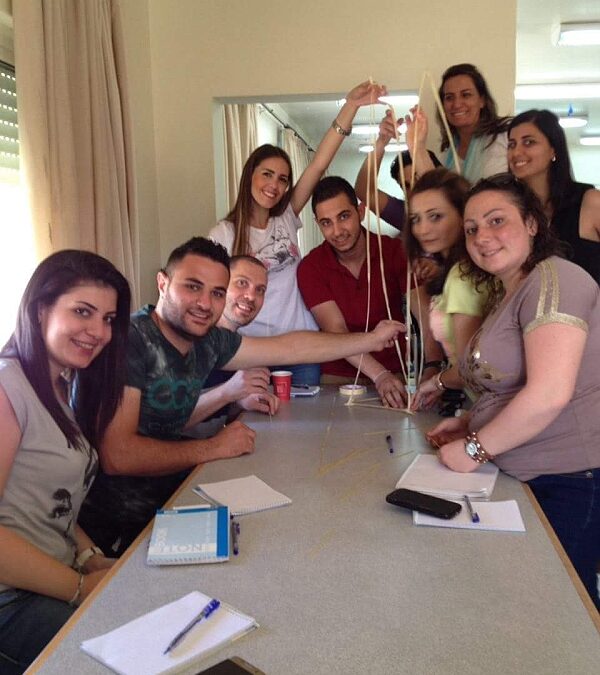
Aug 12, 2016 | Focolare Worldwide
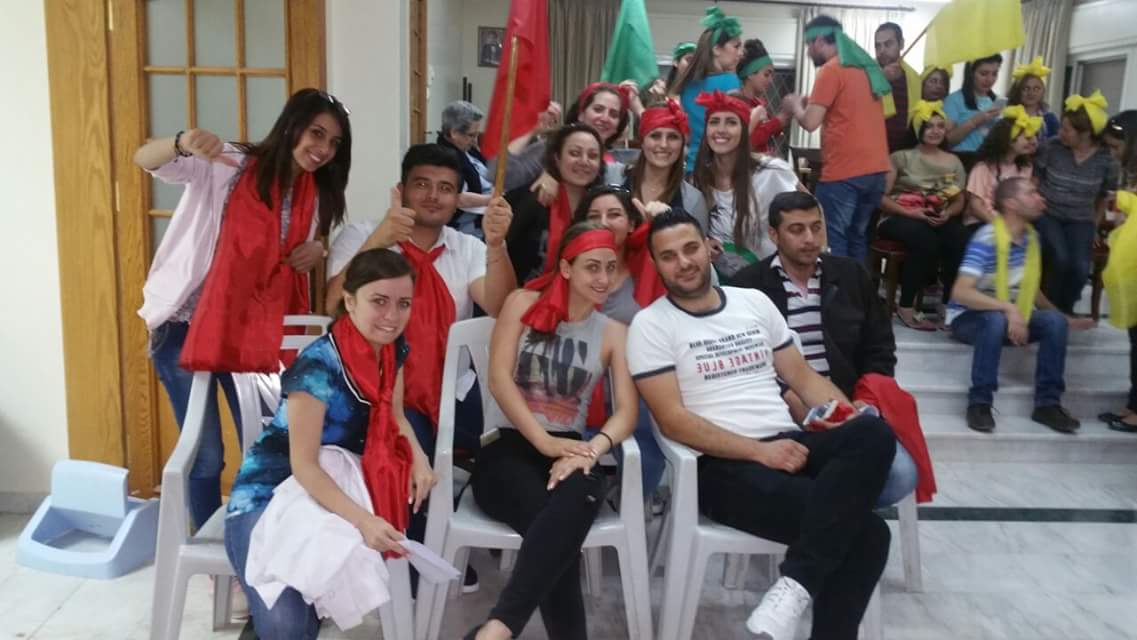 “I learned to transform the negative into positive and transmit it to my friends and not to despair in the face of difficulties.” Said in a context like that of Syria, where the young people live “under continuous psychological pressure” each word weighs differently. “Sad to say, there is continuous news from Syria about civilian war victims, especially in Aleppo,” Pope Francis reminded all once again in the Angelus of 7 August. He continued saying “It is unacceptable that many innocent people – and many children – have to pay the price of the conflict, which is that of closed hearts and the lack of will of those in power.” He then urged all to take everything to heart and personally support the Syrian brothers and sisters with their prayers and solidarity. War is stressful even if there are seeds of hope, and it is what we must continue to focus on. “We felt that we had to do something different with the youth, to support them from the spiritual and human standpoint,” recounted Lina Morcosand Murad Al Shawareb, educators of the Focolare Movement, «and this is why we thought of inviting Sr Noha Daccache, Lebanese, of the Sacred Heart, and university professor specialising in social sciences. We chose to deepen, in this year of mercy, the concept of “Mercy and prayer in our daily lives.”
“I learned to transform the negative into positive and transmit it to my friends and not to despair in the face of difficulties.” Said in a context like that of Syria, where the young people live “under continuous psychological pressure” each word weighs differently. “Sad to say, there is continuous news from Syria about civilian war victims, especially in Aleppo,” Pope Francis reminded all once again in the Angelus of 7 August. He continued saying “It is unacceptable that many innocent people – and many children – have to pay the price of the conflict, which is that of closed hearts and the lack of will of those in power.” He then urged all to take everything to heart and personally support the Syrian brothers and sisters with their prayers and solidarity. War is stressful even if there are seeds of hope, and it is what we must continue to focus on. “We felt that we had to do something different with the youth, to support them from the spiritual and human standpoint,” recounted Lina Morcosand Murad Al Shawareb, educators of the Focolare Movement, «and this is why we thought of inviting Sr Noha Daccache, Lebanese, of the Sacred Heart, and university professor specialising in social sciences. We chose to deepen, in this year of mercy, the concept of “Mercy and prayer in our daily lives.” 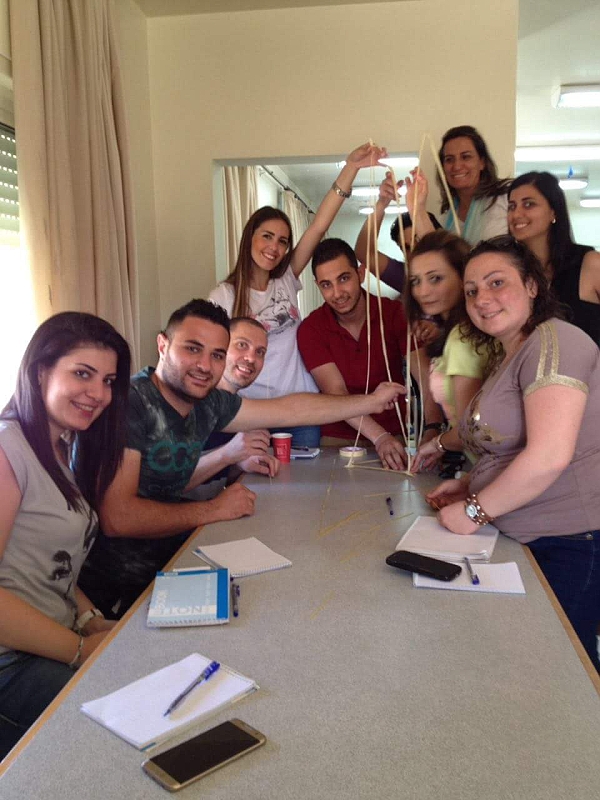 “Already during the preparations – through the iPhone application WhatsApp – there was a great sense of maturity,” seen also during the three-day event (from 10 to 12 June). Sr Noha’s reflections on mercy and prayer, and the Sacred Scriptures also seen in relation to their spiritual lives, triggered questions and reflections. “But on the first day we realised that we were all stressed out due to the situation we were undergoing. So we first held a dialogue session, after which someone suggested a moment of prayer. It was a moving moment with songs and meditations, where the youth said spontaneous prayers and with faith, asked for the gift of Peace.” “On the second day, we delved deeper into the various aspects of life that hindered us from fully corresponding to what God asks of us each day. On the last day instead, Chiara Lubich’s article, ‘Better than yesterday’, was really enlightening since it gave us a concrete key to always love Jesus better.” A girl wrote, “I understood that I had to live the present moment solemnly, to offer the pain and live it for Jesus; all the rest is secondary. While praying I felt that Jesus was saying to me: I am with you.” As she was leaving, Sr Caccache said “You people are really outstanding – I shall keep you in my heart and pray intensely for Peace.” Maria Chiara De Lorenzo
“Already during the preparations – through the iPhone application WhatsApp – there was a great sense of maturity,” seen also during the three-day event (from 10 to 12 June). Sr Noha’s reflections on mercy and prayer, and the Sacred Scriptures also seen in relation to their spiritual lives, triggered questions and reflections. “But on the first day we realised that we were all stressed out due to the situation we were undergoing. So we first held a dialogue session, after which someone suggested a moment of prayer. It was a moving moment with songs and meditations, where the youth said spontaneous prayers and with faith, asked for the gift of Peace.” “On the second day, we delved deeper into the various aspects of life that hindered us from fully corresponding to what God asks of us each day. On the last day instead, Chiara Lubich’s article, ‘Better than yesterday’, was really enlightening since it gave us a concrete key to always love Jesus better.” A girl wrote, “I understood that I had to live the present moment solemnly, to offer the pain and live it for Jesus; all the rest is secondary. While praying I felt that Jesus was saying to me: I am with you.” As she was leaving, Sr Caccache said “You people are really outstanding – I shall keep you in my heart and pray intensely for Peace.” Maria Chiara De Lorenzo

Aug 10, 2016 | Non categorizzato
“I’m sorry …” “One of my older medical colleagues had taken me to task in front of the patients, for a mistake he thought I had made. I was struck to the quick and left the room slamming the door behind me. When I got home, I wasn’t able to regain my calm. I had to do something to re-establish the relationship. After several attempts, I decided to telephone him at his office. “I’m sorry,” I told him, “for what happened this morning.” It took him totally by surprise and made him very happy. Our relationship has continued to grow since then. I discovered that even amidst all the difficulties, it is possible to bring a human dimension to our work.” R. S. – Canada What should we do with the money? “We had received a large sum of money from a relative. We were surprised by the generous gesture and wondered what we should do with the money. There are nine people in our family and each one was saying what he or she wanted. . . As for me, I would have liked to use at least part of the money for a social cause. But would our children agree? Just then my wife and I recalled that we also had a son in Heaven. If he were still with us, he would certainly want his share of the money. So, nobody objected to donating his share to a charitable cause. Just sharing the idea with the kids was enough for them to cheerfully agree.” C. M. – Argentina  Loving Without Expectations “Our daughter, Anna, was a girl full of life and ideals that she wanted to fulfil: finishing her degree, doing archaeology and starting a family. . . Unfortunately things didn’t work out that way. After graduation she went through a period of serious stress because her boyfriend had just left her. My wife and I were quite disturbed. We felt helpless and began to wonder if we had done something wrong in her upbringing. She had even attempted suicide. This hard experience led us into a deeper relationship with God. We and our other children tried to love Anna without expecting anything in return and, little by little, following appropriate treatment, she was able to come out of the tunnel. One day she confided to me that the love she had received from the family had healed her.” E. P. – Austria
Loving Without Expectations “Our daughter, Anna, was a girl full of life and ideals that she wanted to fulfil: finishing her degree, doing archaeology and starting a family. . . Unfortunately things didn’t work out that way. After graduation she went through a period of serious stress because her boyfriend had just left her. My wife and I were quite disturbed. We felt helpless and began to wonder if we had done something wrong in her upbringing. She had even attempted suicide. This hard experience led us into a deeper relationship with God. We and our other children tried to love Anna without expecting anything in return and, little by little, following appropriate treatment, she was able to come out of the tunnel. One day she confided to me that the love she had received from the family had healed her.” E. P. – Austria
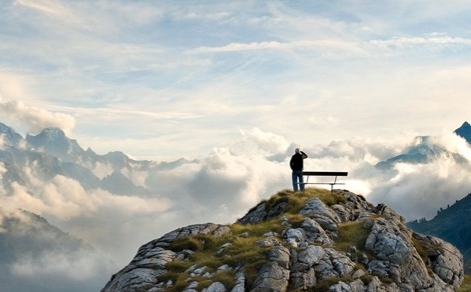
Aug 8, 2016 | Focolare Worldwide, Senza categoria
 “No one in my family knew the Focolare, and I remember that the only reason why I attended the weekly Saturday appointments where we delved into the life of the Gospel was that I felt loved without conditions. I was born and raised in Ascoli Piceno, in the Marche region of Italy. Every year I attended religious education classes for young people, which established me on my faith journey. When I was 19 I had to face knee surgery that resulted in several complications. While I was still in hospital the doctors told me that I’d no longer be able to play volleyball and that I wouldn’t have the full use of my leg. Right then, I understood what it meant to say that ‘God is the ideal that never crumbles’ and I firmly decided for God. If I couldn’t play any kind of sport anymore, God would certainly find something else for me to do. After high school I began university, but went back every Saturday to help out at the parish, setting up games for teens and young people. Even though I couldn’t play, I found out how much fun it can be to help others play, getting them to perform some feats that were truly acrobatic! Throughout those years I became aware of God’s powerful call in my heart, to to spend my whole life for Him in others. At the 2007 Mariapolis, after receiving Jesus in the Holy Eucharist, I felt in my heart what my path in life might be: to bring the charism of unity into my diocese. It was an absolute decision for God in favour of something quite precise. This plunge in God led me to live life to the full, in the fullness of joy, and it allowed me to face a situation that on the human level I would never have been able to face. In 2010, I began to have new problems with my leg that had been through surgery, then the other leg, my back, and, in a matter of few months it was an effort for me to walk and stand on my feet. The doctors couldn’t come up with an explanations and since I was close to finishing my diploma, they hypothesized that it was some sort of nervous condition or form of depression. In my heart I continued to feel a joy that came from living the same ideal together with my friends in the Focolare and couldn’t understand what was going on. One night, I escaped to a church and prayed in front of Eucharistic Jesus: “If it enters into your will for me to begin these medical treatments, give me a sign. If, instead, I have some sort of strange ailment, let me know, because I would like to go on being a gift for the others.” That very treatment revealed a rare genetic illness that was causing all the problems I was experiencing and that continues to cause the chronic pain that I constantly live with. At first my mind was invaded by questions and despair. How would I be able to live for others? I realized that God’s Love didn’t change in front of the pain, perhaps I understood it in a different way, but His love always remained immense, endless. What should I do then? What could I do? I would carry on loving and building unity with everyone around me, even if it required more effort now, even if I felt like I’d rather be left alone. A few months later I was asked to take on a group of small boys. I wondered: will I be able to do it? I put aside my fears and decided to place myself at the service of others. Today, I have to say that over these years, the kids in that group were my strength and courage. Because, by loving, you can overcome anything. So many times I felt like I wouldn’t be physically able to hold up, but I did. I saw for myself that ‘Nothing is impossible for God’.”
“No one in my family knew the Focolare, and I remember that the only reason why I attended the weekly Saturday appointments where we delved into the life of the Gospel was that I felt loved without conditions. I was born and raised in Ascoli Piceno, in the Marche region of Italy. Every year I attended religious education classes for young people, which established me on my faith journey. When I was 19 I had to face knee surgery that resulted in several complications. While I was still in hospital the doctors told me that I’d no longer be able to play volleyball and that I wouldn’t have the full use of my leg. Right then, I understood what it meant to say that ‘God is the ideal that never crumbles’ and I firmly decided for God. If I couldn’t play any kind of sport anymore, God would certainly find something else for me to do. After high school I began university, but went back every Saturday to help out at the parish, setting up games for teens and young people. Even though I couldn’t play, I found out how much fun it can be to help others play, getting them to perform some feats that were truly acrobatic! Throughout those years I became aware of God’s powerful call in my heart, to to spend my whole life for Him in others. At the 2007 Mariapolis, after receiving Jesus in the Holy Eucharist, I felt in my heart what my path in life might be: to bring the charism of unity into my diocese. It was an absolute decision for God in favour of something quite precise. This plunge in God led me to live life to the full, in the fullness of joy, and it allowed me to face a situation that on the human level I would never have been able to face. In 2010, I began to have new problems with my leg that had been through surgery, then the other leg, my back, and, in a matter of few months it was an effort for me to walk and stand on my feet. The doctors couldn’t come up with an explanations and since I was close to finishing my diploma, they hypothesized that it was some sort of nervous condition or form of depression. In my heart I continued to feel a joy that came from living the same ideal together with my friends in the Focolare and couldn’t understand what was going on. One night, I escaped to a church and prayed in front of Eucharistic Jesus: “If it enters into your will for me to begin these medical treatments, give me a sign. If, instead, I have some sort of strange ailment, let me know, because I would like to go on being a gift for the others.” That very treatment revealed a rare genetic illness that was causing all the problems I was experiencing and that continues to cause the chronic pain that I constantly live with. At first my mind was invaded by questions and despair. How would I be able to live for others? I realized that God’s Love didn’t change in front of the pain, perhaps I understood it in a different way, but His love always remained immense, endless. What should I do then? What could I do? I would carry on loving and building unity with everyone around me, even if it required more effort now, even if I felt like I’d rather be left alone. A few months later I was asked to take on a group of small boys. I wondered: will I be able to do it? I put aside my fears and decided to place myself at the service of others. Today, I have to say that over these years, the kids in that group were my strength and courage. Because, by loving, you can overcome anything. So many times I felt like I wouldn’t be physically able to hold up, but I did. I saw for myself that ‘Nothing is impossible for God’.”
![Collegamento CH Worldwide linkup]()
Aug 6, 2016 | Non categorizzato
 “In the beginning is the relation.” Thus wrote Martin Buber, that great exponent of Jewish thought in the first half of the last century. Since then, and thanks to the developments that have been achieved by the philosophy of dialogue, this theory has been accepted as authoriative on the philosophical scene, with consequences for social life and for the very meaning of life. The human sciences in particular have made fruitful use of it. More and more we are thinking that relationship is what defines the human person. The ability to relate has therefore become important in every sphere of human activity. The failure of many noble undertakings, for example, could be traced back to relationship problems. Having a good relationship also garuntees a positive start and subsequent continuity. Relationship is truly necessary. And yet, from my point of view, I would modify the statement made by that great Austrian-Israeli philosopher in this way: “In the beginning is the relationality.” What I mean is that the relationship is always secondary, because there is something deeper: relationality. It is the rational structure of the human person that allows him to enter into relationship, but it does not necessarily require a relationship with each other in order to be. Relationality involves being, relating and doing. Relationality and relationship do not oppose one another, but go distinctly because they touch upon two different dimensions of a person. The conclusion seems paradoxical: There are people that are poor in relationships but rich in relationality, and vice versa. Having many relationships is not necessarily an indicator of relationality. I give an extreme example: a cloistered nun can be more rich in relationality than a film star, even though she is numerically poorer in relationships. You can be open to the infinite without ever leaving your room, just as you can be closed in yourself while moving about in the midst of the world. Is it a matter of quantity and quality therefore? Yes and no. What is decisive for the quality of relationships is the measure to which they originate in the rational structure of a person. So it is not a matter of quantity or quality, but of depth and reciprocity. Relationality comes from the depth of the human person and it is always open. It is open to reciprocity, whereas relationships do not always dodge the individual-entric temptations.Starting from the rational structure of the person therefore means being aware that there is something in our relationships that preceeds them and something that exceeds them. It means giving up controlling relationships, directly building them as if it depended on us. Relationships are not built; they are sought. This means that we must be attentive above all to what surprises us, to what is unexpected. The “will to power” that often characterises modern man tends to impose relationships, even for good reasons. This can happen, for example, in the father-son relationship, or between a couple. If we want relationships that are filled with relationality, we have to cultivate the attitude of expectation, listening, patience and absence. Relationality requires love along with a sort of passivity which, if well lived, is the only attitude that is really open to novelty. The ethical implications of this distinction, which can appear purely academic, can be decisivc in certain cases. An example: If the person were primarily relationship, meaning the capacity to build relationships, then abortion would be legitimate because the embryo is not capable of building them. A comatose person would not have the right to live because of not being able to have relationships with others. But if what is at the root of a person is relationality, which does not need relationships in order to exist because it comes before them, then that changes things substantially. Source: Città Nuova, (January 2016).
“In the beginning is the relation.” Thus wrote Martin Buber, that great exponent of Jewish thought in the first half of the last century. Since then, and thanks to the developments that have been achieved by the philosophy of dialogue, this theory has been accepted as authoriative on the philosophical scene, with consequences for social life and for the very meaning of life. The human sciences in particular have made fruitful use of it. More and more we are thinking that relationship is what defines the human person. The ability to relate has therefore become important in every sphere of human activity. The failure of many noble undertakings, for example, could be traced back to relationship problems. Having a good relationship also garuntees a positive start and subsequent continuity. Relationship is truly necessary. And yet, from my point of view, I would modify the statement made by that great Austrian-Israeli philosopher in this way: “In the beginning is the relationality.” What I mean is that the relationship is always secondary, because there is something deeper: relationality. It is the rational structure of the human person that allows him to enter into relationship, but it does not necessarily require a relationship with each other in order to be. Relationality involves being, relating and doing. Relationality and relationship do not oppose one another, but go distinctly because they touch upon two different dimensions of a person. The conclusion seems paradoxical: There are people that are poor in relationships but rich in relationality, and vice versa. Having many relationships is not necessarily an indicator of relationality. I give an extreme example: a cloistered nun can be more rich in relationality than a film star, even though she is numerically poorer in relationships. You can be open to the infinite without ever leaving your room, just as you can be closed in yourself while moving about in the midst of the world. Is it a matter of quantity and quality therefore? Yes and no. What is decisive for the quality of relationships is the measure to which they originate in the rational structure of a person. So it is not a matter of quantity or quality, but of depth and reciprocity. Relationality comes from the depth of the human person and it is always open. It is open to reciprocity, whereas relationships do not always dodge the individual-entric temptations.Starting from the rational structure of the person therefore means being aware that there is something in our relationships that preceeds them and something that exceeds them. It means giving up controlling relationships, directly building them as if it depended on us. Relationships are not built; they are sought. This means that we must be attentive above all to what surprises us, to what is unexpected. The “will to power” that often characterises modern man tends to impose relationships, even for good reasons. This can happen, for example, in the father-son relationship, or between a couple. If we want relationships that are filled with relationality, we have to cultivate the attitude of expectation, listening, patience and absence. Relationality requires love along with a sort of passivity which, if well lived, is the only attitude that is really open to novelty. The ethical implications of this distinction, which can appear purely academic, can be decisivc in certain cases. An example: If the person were primarily relationship, meaning the capacity to build relationships, then abortion would be legitimate because the embryo is not capable of building them. A comatose person would not have the right to live because of not being able to have relationships with others. But if what is at the root of a person is relationality, which does not need relationships in order to exist because it comes before them, then that changes things substantially. Source: Città Nuova, (January 2016).

Aug 4, 2016 | Non categorizzato
 After participating in the memorable World Youth Day celebrations at Krakow, 67 bishops and cardinals, friends of the Focolare Movement meet in Braga, in the north of Portugal, from the 2-10 August 2016. Such conferences have been taking place since 1977, but it is the first time that these bishops meet in Portugal. They have been invited by Msgr Jorge Ortiga, Archbishop of Braga to hold this conference at the Sanctuary of Our Lady of Sameiro. Moderated by Cardinal Francis Kriengsak, Archbishop of Bangkok, Thailand, this conference aims at deepening fraternal communion among bishops, in line with the spirituality of unity that animates the Focolare Movement. The mystery of Jesus on the cross, who cries “My God, my God, why have you forsaken me?” (Mk 15,34) will be the main theme of this conference. During 2016/2017 all Focolare members will focus their attention on this subject, a key to meet and embrace the wounds of today’s society. Maria Voce, president of the Focolare Movement will deliver points on this subject. Jesús Morán, the co-president and other central council members will share views on the life of the Focolare Movement today. The current world situation, the Church’s reform according to Pope Francis and ecumenism are other topics to be discussed and reflected upon through the specific contributions offered by theologians, politicians and other experts members of the Movement. The Portugese Episcopal Conference has been invited to participate in the programme held on August 9. The bishops who attend will have the opportunity to share in a fraternal exchange of experiences and encounter, enriched by the presence of bishops from dioceses in many parts of the world. This meeting will be sealed by a pilgrimage to Fatima, the land of Holy Mary, where the bishops will entrust their life and mission to Our Lady. The meetings for Bshops, friends of the Focolare Movement started in 1977 on the initiative of Msgr. Klaus Hemmerle, Bishop of Aachen, Germany. Since their very beginning, they were approved and supported by the Holy See to promote the “effective and affective” collegiality among bishops in a spirit of communion and fraternity. Source: Press release – Focolare Information Service
After participating in the memorable World Youth Day celebrations at Krakow, 67 bishops and cardinals, friends of the Focolare Movement meet in Braga, in the north of Portugal, from the 2-10 August 2016. Such conferences have been taking place since 1977, but it is the first time that these bishops meet in Portugal. They have been invited by Msgr Jorge Ortiga, Archbishop of Braga to hold this conference at the Sanctuary of Our Lady of Sameiro. Moderated by Cardinal Francis Kriengsak, Archbishop of Bangkok, Thailand, this conference aims at deepening fraternal communion among bishops, in line with the spirituality of unity that animates the Focolare Movement. The mystery of Jesus on the cross, who cries “My God, my God, why have you forsaken me?” (Mk 15,34) will be the main theme of this conference. During 2016/2017 all Focolare members will focus their attention on this subject, a key to meet and embrace the wounds of today’s society. Maria Voce, president of the Focolare Movement will deliver points on this subject. Jesús Morán, the co-president and other central council members will share views on the life of the Focolare Movement today. The current world situation, the Church’s reform according to Pope Francis and ecumenism are other topics to be discussed and reflected upon through the specific contributions offered by theologians, politicians and other experts members of the Movement. The Portugese Episcopal Conference has been invited to participate in the programme held on August 9. The bishops who attend will have the opportunity to share in a fraternal exchange of experiences and encounter, enriched by the presence of bishops from dioceses in many parts of the world. This meeting will be sealed by a pilgrimage to Fatima, the land of Holy Mary, where the bishops will entrust their life and mission to Our Lady. The meetings for Bshops, friends of the Focolare Movement started in 1977 on the initiative of Msgr. Klaus Hemmerle, Bishop of Aachen, Germany. Since their very beginning, they were approved and supported by the Holy See to promote the “effective and affective” collegiality among bishops in a spirit of communion and fraternity. Source: Press release – Focolare Information Service
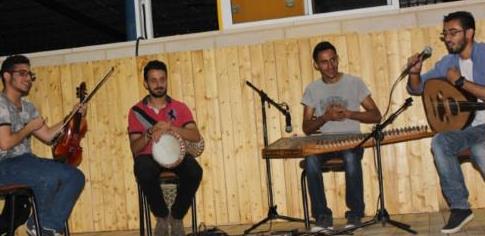
Aug 4, 2016 | Focolare Worldwide, Senza categoria
 «These have been wonderful days, I found peace and security. The group dialogues were rich, especially those of the families.» «I thank God for the grace we have received also as a couple. There were some issues between the two of us, but here, many things changed. Now we are happy and ready to commit ourselves to any type of activities.» « For the first time I helped out with the children: a very special experience. From them I learned simplicity and how to live love in daily life.» «I felt that I had to accept the others as they are. I have refilled and am ready to go forward!» These are some impressions, among many that have come up during these months throughout the world where the Mariapolis is being held, the typical summer gatherings of the Focolare. All as usual up to this point. Except for the fact that these impressions were gathered in the troubled Holy Land. «Our Mariapolis – they wrote from Jerusalem – was held from 30 June to 2 July, in Jenin, Palestine. A beautiful and welcoming place which helped us to relax, and deepen that golden thread of the programme which invited us to put into practise the mercy of God and with our brothers. 230 people from various localities participated. It was the first time for many of them among whom were young people, kids and children. Also about 20 people from the Gaza Strip participated, and to do so were able to obtain the permit to leave.» «Among the illustrious guests was the Melkite Catholic Archbishop of Galilee , Bishop Georges Bacaouni, whose words – one of the participants said – were a great enlightenment since they encouraged all to live in such a way as to show all that we love Jesus.»
«These have been wonderful days, I found peace and security. The group dialogues were rich, especially those of the families.» «I thank God for the grace we have received also as a couple. There were some issues between the two of us, but here, many things changed. Now we are happy and ready to commit ourselves to any type of activities.» « For the first time I helped out with the children: a very special experience. From them I learned simplicity and how to live love in daily life.» «I felt that I had to accept the others as they are. I have refilled and am ready to go forward!» These are some impressions, among many that have come up during these months throughout the world where the Mariapolis is being held, the typical summer gatherings of the Focolare. All as usual up to this point. Except for the fact that these impressions were gathered in the troubled Holy Land. «Our Mariapolis – they wrote from Jerusalem – was held from 30 June to 2 July, in Jenin, Palestine. A beautiful and welcoming place which helped us to relax, and deepen that golden thread of the programme which invited us to put into practise the mercy of God and with our brothers. 230 people from various localities participated. It was the first time for many of them among whom were young people, kids and children. Also about 20 people from the Gaza Strip participated, and to do so were able to obtain the permit to leave.» «Among the illustrious guests was the Melkite Catholic Archbishop of Galilee , Bishop Georges Bacaouni, whose words – one of the participants said – were a great enlightenment since they encouraged all to live in such a way as to show all that we love Jesus.»  «Since this is the Year of Mercy, also a moment of the programme was dedicated to what we called a “face to face with God” moment. After a deep examination of conscience, before Jesus in the Eucharist, each one of us wrote the steps we felt we could take to grow in love towards God and towards the others, and to then burn the piece of paper in a great fire, and symbol of the mercy of God. After this solemn moment, a lady from Gaza confided with great joy: “I did it, I forgave all. Now I shall start anew.”» “There were also those who reestablished relationships with the Focolare after a long time: «I have returned to the Mariapolis after15 years, but it is as if it is my first time. On listening to the themes of Chiara Lubich I understood that in every moment you can catch up with the others, if you just start loving again in the present. I experienced once again that when we are together, there is a special strength which gives us the energy to go ahead. »
«Since this is the Year of Mercy, also a moment of the programme was dedicated to what we called a “face to face with God” moment. After a deep examination of conscience, before Jesus in the Eucharist, each one of us wrote the steps we felt we could take to grow in love towards God and towards the others, and to then burn the piece of paper in a great fire, and symbol of the mercy of God. After this solemn moment, a lady from Gaza confided with great joy: “I did it, I forgave all. Now I shall start anew.”» “There were also those who reestablished relationships with the Focolare after a long time: «I have returned to the Mariapolis after15 years, but it is as if it is my first time. On listening to the themes of Chiara Lubich I understood that in every moment you can catch up with the others, if you just start loving again in the present. I experienced once again that when we are together, there is a special strength which gives us the energy to go ahead. »
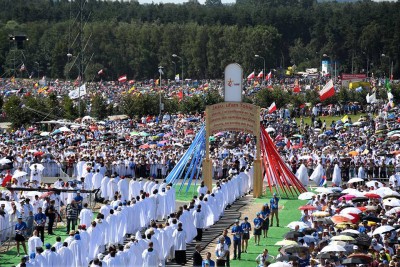
Aug 3, 2016 | Focolare Worldwide
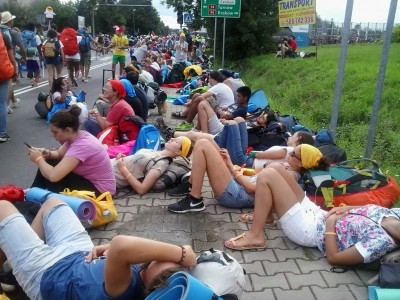 Anthony from the USA recounts: “Back in Chicago I’m used seeing everybody look out for themselves, without concern for others. As we made our way to the Field of Mercy someone came out of their house and offered us a tray of ice-cream . . . Another person gave water . . . I couldn’t believe my eyes!” Antonel is a Hungarian from Romania: “Although I live in Romania, I don’t speak much Romanian and have little contact with Romanians. The fact is, we feel that we’re Hungarians, not Romanians. We were in a group with both Romanians and Hungarians and it was just incredible. I learned more Romanian in those few days than I had in my entire life. I felt that we were real brothers and sisters. So many preujudices disappeared!” Anna from Italy: “Our luggage was quite heavy and a family invited us to go into their house. They offered to hold on to our luggage until the next day when we would be returning from the Field of Mercy. It seemed unreal. Then, when we returned they invited us in and offered us drinks and a bit of rest. We stayed with them for a while and then continued on. . .”
Anthony from the USA recounts: “Back in Chicago I’m used seeing everybody look out for themselves, without concern for others. As we made our way to the Field of Mercy someone came out of their house and offered us a tray of ice-cream . . . Another person gave water . . . I couldn’t believe my eyes!” Antonel is a Hungarian from Romania: “Although I live in Romania, I don’t speak much Romanian and have little contact with Romanians. The fact is, we feel that we’re Hungarians, not Romanians. We were in a group with both Romanians and Hungarians and it was just incredible. I learned more Romanian in those few days than I had in my entire life. I felt that we were real brothers and sisters. So many preujudices disappeared!” Anna from Italy: “Our luggage was quite heavy and a family invited us to go into their house. They offered to hold on to our luggage until the next day when we would be returning from the Field of Mercy. It seemed unreal. Then, when we returned they invited us in and offered us drinks and a bit of rest. We stayed with them for a while and then continued on. . .”  They were like an overflowing river . . . They had just arrived from Krakow after 10 hours of travelling. They were worn out but happy, filled with enthusiasm and determination. The Pope’s words entered deeply into their hearts. “We could say say WYD begins now and continues tomorrow at home, because that’s where Jesus wants to meet you from now on,” said Pope Francis at the Mass on the Field of Mercy. “The Lord doesn’t only wish only to remain in this city of fond memories, but to go to your homes and share in your everyday life: at school and your first years in the workplace, your friendships and your feelings, your plans and your dreams.” There were 600 young people from the Movement. Following the unforgettable experience at WYD they spent 5 days in Jasna on the Tatra Mountains in Slovakia.They wanted to make the Pope’s words become part of their lives and to discern together how to put them into practice in their lives. The Focolare young people were from 33 countries, from Australia to Brazil and Argentina, from Portugal to Russia. They say that they will never forget the experience of hospitality and brotherhood they experienced. The days ahead would be quite busy. The title chosen for their gathering was quite meaningful: “You God (got) me!” You’ve also swept us away, God. The gathering took place in the midst of the spectacular beauty of the Tarta Mountains and focused on three essential topics in the life of every human being: the relationship with God, the relationship with oneself and the relationship with others. The Pope’s words were the backdrop, along with the desire that no one take away their freedom to make courageous decisions to be “builders of the future”. The first day was spent telling stories about hospitality, helping one another, smiles, sharing – the Pope! They discussed his invitation to feel that Jesus calls them to leave their mark . . . a mark that marks history, that marks their story and the story of many others.” To not be “couch potatoes” but young people with their shoes laced, or better, with their hiking-boots laced. Domenico from the Cameroon summarized the sentiments of many: “A united world is possible, and we could reach universal brotherhood.” “As the Pope said, we should build bridges and reach out our hands to one another. I felt like judging so many countries that are creating wars in Africa, but as the Pope spoke I felt I had to change my way of thinking and begin to build those bridges. We reach brotherhood by building bridges; by hating we only destroy. Jesus allowed me to double my faith. Many times during my life I’ve wondered why there is so much suffering in the world, but now I realize that Jesus is there, that he becomes ugly in order to make everything beautiful. I’d like to be that way for others, to be active at building bridges. If we get our hands dirty, we’ll surely come to the point of living Jesus’s prayer to the Father: ‘that all be one’. Eva from Sovakia: “It struck us when the Pope blessed our dreams and our feet, giving significance to every effort we made.” “We have a lot of hard work ahead of us, but WYD shows that a new world is possible. It’s up to us to build it in the small steps that we take every day!” Pope Francis’s homily at WYD Mass, Mercy Field, July 31, 2016 Pope’s Address at WYD Prayer Vigil, July 30, 2016 Pope’s Words at WYD Way of the Cross
They were like an overflowing river . . . They had just arrived from Krakow after 10 hours of travelling. They were worn out but happy, filled with enthusiasm and determination. The Pope’s words entered deeply into their hearts. “We could say say WYD begins now and continues tomorrow at home, because that’s where Jesus wants to meet you from now on,” said Pope Francis at the Mass on the Field of Mercy. “The Lord doesn’t only wish only to remain in this city of fond memories, but to go to your homes and share in your everyday life: at school and your first years in the workplace, your friendships and your feelings, your plans and your dreams.” There were 600 young people from the Movement. Following the unforgettable experience at WYD they spent 5 days in Jasna on the Tatra Mountains in Slovakia.They wanted to make the Pope’s words become part of their lives and to discern together how to put them into practice in their lives. The Focolare young people were from 33 countries, from Australia to Brazil and Argentina, from Portugal to Russia. They say that they will never forget the experience of hospitality and brotherhood they experienced. The days ahead would be quite busy. The title chosen for their gathering was quite meaningful: “You God (got) me!” You’ve also swept us away, God. The gathering took place in the midst of the spectacular beauty of the Tarta Mountains and focused on three essential topics in the life of every human being: the relationship with God, the relationship with oneself and the relationship with others. The Pope’s words were the backdrop, along with the desire that no one take away their freedom to make courageous decisions to be “builders of the future”. The first day was spent telling stories about hospitality, helping one another, smiles, sharing – the Pope! They discussed his invitation to feel that Jesus calls them to leave their mark . . . a mark that marks history, that marks their story and the story of many others.” To not be “couch potatoes” but young people with their shoes laced, or better, with their hiking-boots laced. Domenico from the Cameroon summarized the sentiments of many: “A united world is possible, and we could reach universal brotherhood.” “As the Pope said, we should build bridges and reach out our hands to one another. I felt like judging so many countries that are creating wars in Africa, but as the Pope spoke I felt I had to change my way of thinking and begin to build those bridges. We reach brotherhood by building bridges; by hating we only destroy. Jesus allowed me to double my faith. Many times during my life I’ve wondered why there is so much suffering in the world, but now I realize that Jesus is there, that he becomes ugly in order to make everything beautiful. I’d like to be that way for others, to be active at building bridges. If we get our hands dirty, we’ll surely come to the point of living Jesus’s prayer to the Father: ‘that all be one’. Eva from Sovakia: “It struck us when the Pope blessed our dreams and our feet, giving significance to every effort we made.” “We have a lot of hard work ahead of us, but WYD shows that a new world is possible. It’s up to us to build it in the small steps that we take every day!” Pope Francis’s homily at WYD Mass, Mercy Field, July 31, 2016 Pope’s Address at WYD Prayer Vigil, July 30, 2016 Pope’s Words at WYD Way of the Cross
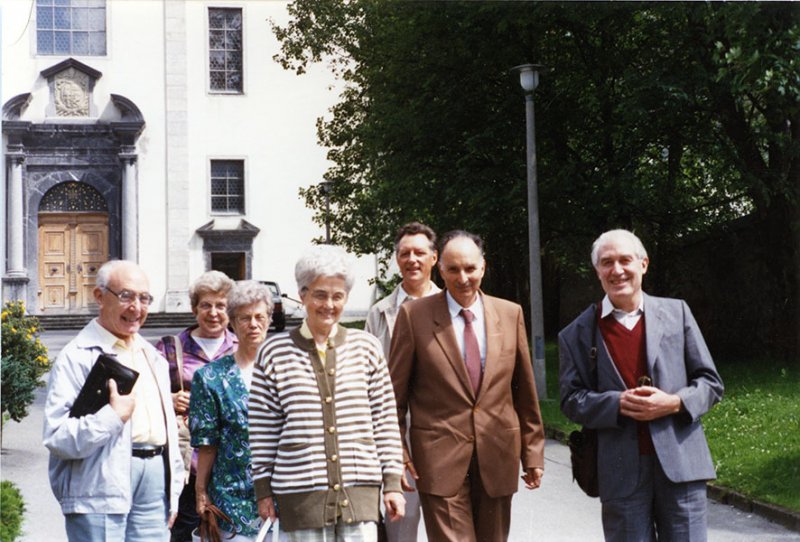
Aug 2, 2016 | Focolare Worldwide
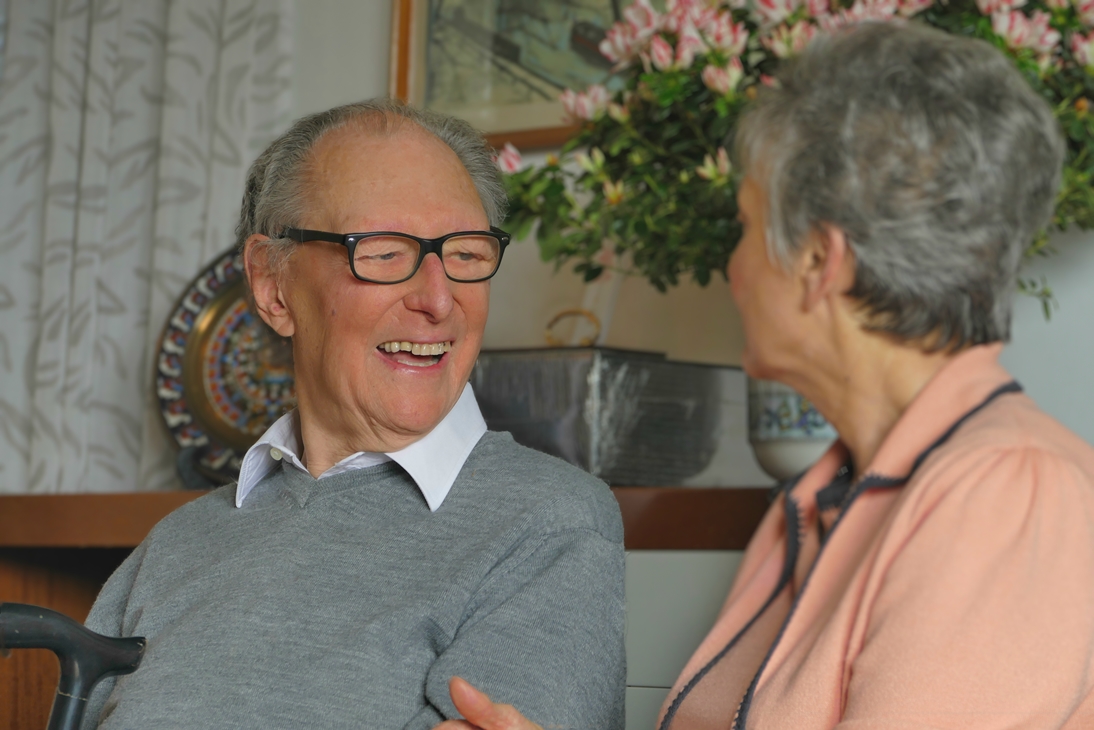 “He was for many a true testimony of God’s infinite mercy,” Maria Voce wrote to the members of the Movement, “which he now is certainly experiencing in fullness.” Born in Pistoia, on 8 September 1926, Bruno Venturini met the newly born Movement in December 1949, when, Graziella De Luca, one the first women focolarine, went to his city to meet Pasquale Foresi. He was ordained priest in 1978, and covered many roles in the Movement, but he would have later said that “one of the biggest graces I received was that of sharing the responsibility for the aspect of Economy and Work for over 30 years, with Giosi Guella, an exceptional person, and experience in person the constant Providence that made us feel totally in God’s hands.”
“He was for many a true testimony of God’s infinite mercy,” Maria Voce wrote to the members of the Movement, “which he now is certainly experiencing in fullness.” Born in Pistoia, on 8 September 1926, Bruno Venturini met the newly born Movement in December 1949, when, Graziella De Luca, one the first women focolarine, went to his city to meet Pasquale Foresi. He was ordained priest in 1978, and covered many roles in the Movement, but he would have later said that “one of the biggest graces I received was that of sharing the responsibility for the aspect of Economy and Work for over 30 years, with Giosi Guella, an exceptional person, and experience in person the constant Providence that made us feel totally in God’s hands.”

Bruno Venturini (third from right) was always close to Chiara Lubich.
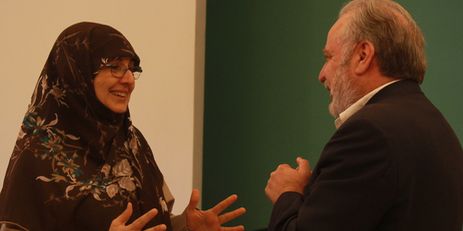
Aug 1, 2016 | Focolare Worldwide
 “The results are far beyond our greatest expectations,” said Roberto Catalano from the Focolare’s Centre for Interreligious Dialogue at the conclusion of a gathering of the “Wings of Unity” research group that has come up with rather a challenging agenda, considering the difficult phase that Europe is going through. The Co-Directors of the project are SUI President Piero Coda and Professor Mohammad Ali Shomali, Director of the Islamic Centre of England. The idea of meeting at Loppiano, Italy, goes back to last April when Professor Shomali had been invited to present a lecture at the Interdisciplinary Perspectives on Religions in the Contemporary World course that was offered by SUI in collaboration with Professor Frizzi. But the origins of Wings of Unity go back even in a story of friendship, solidarity and trust between Muslim and Christian friends of the Focolare. That friendship began 19 years ago in daily life settings and in the halls of academia, and has now evolved into a common interreligious witness of universal brother and sisterhood. That is what it was for the 14 members – 5 of them Shiites – of the seminar that was recently held at SUI on July 8-10, 2016. Iranian theologian Sharzad Housmand, professor at the Gregorian Pontifical University and expert in Islamic-Christian Dialogue, was also in attendance and highlighted the great novelty of the event. The same was true for Christian Arooj Javed, SUI student from Pakistan who said she could never even have imagined such a spirit of communion and, at the same time, openness and transparency between Christians and Muslims. The work began with texts from Chiara Lubich, presented by Coda and Catalano, in which the Focolare foundress highlighted the fact that unity is something that should be sought with everyone, because we are all children of a single Father. Professor Shomali then presented some excerpts from the Koran and successive traditions that were in harmony with what Chiara Lubich had written. To everyone’s surprise, the more the dialogue deepened, the more the “hardness” of diversity faded giving space to a dialogue that was marked by deep listening and mutual understanding. The presentations given by Professor Callebaut and Professor Ropelato that focused on the centrality of love were also valuable. They indicated the capacity of human beings to unite diverse human settings both within and outside themselves as the new line for social, economic and political life. The contributions from the Shitte guests opened new and timely scenarios for the experience of unity as a value that becomes kairos, [at] the right moment. Professor Mahnaz Heydarpoor’s words sounded convincing as she called for training in interreligious dialogue for the new generations. An interreligious summer school workshop for young people has been scheduled for 2017 which will continue the communion that was begun at this school: “After years spent in building trust among us,” one Muslim remarked, “the new generations no longer need to wait: We want to do everything we can so that they will be able to experience the unity that so intensely filled our hearts and minds in these days.” Source: Sophia online
“The results are far beyond our greatest expectations,” said Roberto Catalano from the Focolare’s Centre for Interreligious Dialogue at the conclusion of a gathering of the “Wings of Unity” research group that has come up with rather a challenging agenda, considering the difficult phase that Europe is going through. The Co-Directors of the project are SUI President Piero Coda and Professor Mohammad Ali Shomali, Director of the Islamic Centre of England. The idea of meeting at Loppiano, Italy, goes back to last April when Professor Shomali had been invited to present a lecture at the Interdisciplinary Perspectives on Religions in the Contemporary World course that was offered by SUI in collaboration with Professor Frizzi. But the origins of Wings of Unity go back even in a story of friendship, solidarity and trust between Muslim and Christian friends of the Focolare. That friendship began 19 years ago in daily life settings and in the halls of academia, and has now evolved into a common interreligious witness of universal brother and sisterhood. That is what it was for the 14 members – 5 of them Shiites – of the seminar that was recently held at SUI on July 8-10, 2016. Iranian theologian Sharzad Housmand, professor at the Gregorian Pontifical University and expert in Islamic-Christian Dialogue, was also in attendance and highlighted the great novelty of the event. The same was true for Christian Arooj Javed, SUI student from Pakistan who said she could never even have imagined such a spirit of communion and, at the same time, openness and transparency between Christians and Muslims. The work began with texts from Chiara Lubich, presented by Coda and Catalano, in which the Focolare foundress highlighted the fact that unity is something that should be sought with everyone, because we are all children of a single Father. Professor Shomali then presented some excerpts from the Koran and successive traditions that were in harmony with what Chiara Lubich had written. To everyone’s surprise, the more the dialogue deepened, the more the “hardness” of diversity faded giving space to a dialogue that was marked by deep listening and mutual understanding. The presentations given by Professor Callebaut and Professor Ropelato that focused on the centrality of love were also valuable. They indicated the capacity of human beings to unite diverse human settings both within and outside themselves as the new line for social, economic and political life. The contributions from the Shitte guests opened new and timely scenarios for the experience of unity as a value that becomes kairos, [at] the right moment. Professor Mahnaz Heydarpoor’s words sounded convincing as she called for training in interreligious dialogue for the new generations. An interreligious summer school workshop for young people has been scheduled for 2017 which will continue the communion that was begun at this school: “After years spent in building trust among us,” one Muslim remarked, “the new generations no longer need to wait: We want to do everything we can so that they will be able to experience the unity that so intensely filled our hearts and minds in these days.” Source: Sophia online
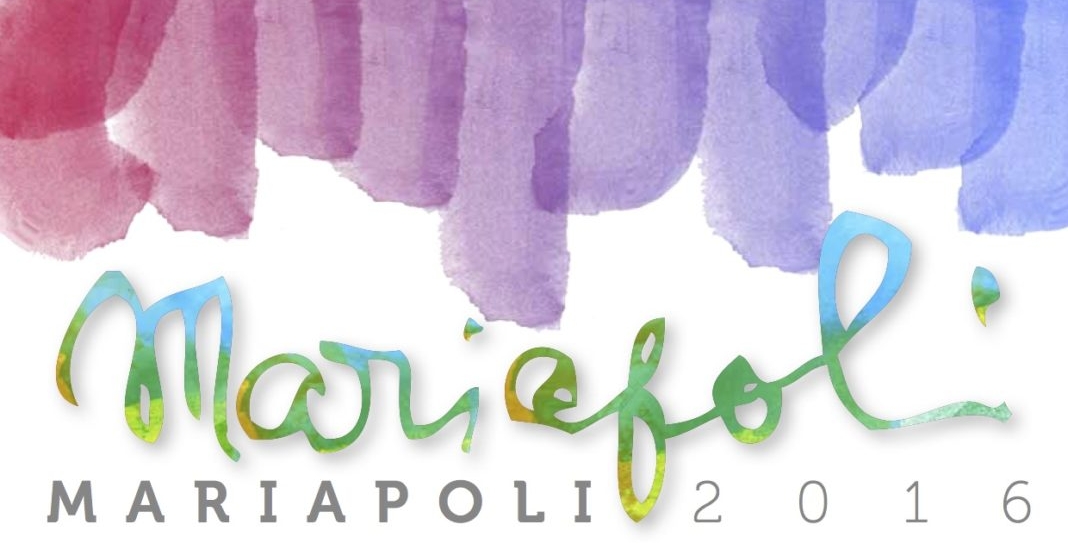
Jul 30, 2016 | Senza categoria
 What is the Mariapolis? The word literally means City of Mary and refers to a gathering of several days for Focolare members and friends, young and old, people of all backgrounds who strive to live in a spirit of brotherhood in light of the universal values of the Gospel. This rather unique experience that is repeated in many countries around the world is shaped by the Golden Rule which invites us to do unto others as we would have them do unto us. At a Mariapolis it is possible to see what it would be like in daily life if our relationships were based on being gifts for one another. History of the Mariapolis In the difficult post-war period while struggling to heal from the wounds inflicted on all the nations of Europe by the Second World War, a growing number of young people, families, workers, professionals and politicans joined members of the nascent Movement for summer holidays in the mountains of Trentino, Italy. Right from the start the Mariapolis was a small chunk of society renewed by the love of the Gospel. South Tyroleans and Italians, French and Germans all participated as the hatred of the war quickly melted away. An old Mariapolis song describes the spirit of fraternity at those first cities of Mary: “Train operators, students, doctors, chemists and parliamentarians go to the Mariapolis and discover that they are brothers and sisters. What matter then our posts or positions, when we’ve been made brothers and sisters here?” That unique atmosphere of brotherhood which was the hallmark of the first city of Mary is still experienced in Mariapolises throughout the world. From early on, a note of internationality characterized the Movement which was spreading rapidly, first in Italy and then, in 1952, in the other countries of Europe and to the other continents in 1958. In 1959, more than 10,000 people attended the Mariapolis at Fiera di Primiero in Trentino, Italy. Twenty seven countries from different continents were represented. At that Mariapolis – and later in 1960 at Freiburg, Germany – while speaking to an international gathering about unity among the peoples of the world, Chiara Lubich proposed the Gospel commandment of love as the relationship that could exist between nations: “Love your neighbour’s country as your own.” The Mariapolis continues today on all 5 continents and now there are also twenty permanent Mariapolises around the world, the first and most developed in Loppiano, Italy.
What is the Mariapolis? The word literally means City of Mary and refers to a gathering of several days for Focolare members and friends, young and old, people of all backgrounds who strive to live in a spirit of brotherhood in light of the universal values of the Gospel. This rather unique experience that is repeated in many countries around the world is shaped by the Golden Rule which invites us to do unto others as we would have them do unto us. At a Mariapolis it is possible to see what it would be like in daily life if our relationships were based on being gifts for one another. History of the Mariapolis In the difficult post-war period while struggling to heal from the wounds inflicted on all the nations of Europe by the Second World War, a growing number of young people, families, workers, professionals and politicans joined members of the nascent Movement for summer holidays in the mountains of Trentino, Italy. Right from the start the Mariapolis was a small chunk of society renewed by the love of the Gospel. South Tyroleans and Italians, French and Germans all participated as the hatred of the war quickly melted away. An old Mariapolis song describes the spirit of fraternity at those first cities of Mary: “Train operators, students, doctors, chemists and parliamentarians go to the Mariapolis and discover that they are brothers and sisters. What matter then our posts or positions, when we’ve been made brothers and sisters here?” That unique atmosphere of brotherhood which was the hallmark of the first city of Mary is still experienced in Mariapolises throughout the world. From early on, a note of internationality characterized the Movement which was spreading rapidly, first in Italy and then, in 1952, in the other countries of Europe and to the other continents in 1958. In 1959, more than 10,000 people attended the Mariapolis at Fiera di Primiero in Trentino, Italy. Twenty seven countries from different continents were represented. At that Mariapolis – and later in 1960 at Freiburg, Germany – while speaking to an international gathering about unity among the peoples of the world, Chiara Lubich proposed the Gospel commandment of love as the relationship that could exist between nations: “Love your neighbour’s country as your own.” The Mariapolis continues today on all 5 continents and now there are also twenty permanent Mariapolises around the world, the first and most developed in Loppiano, Italy.
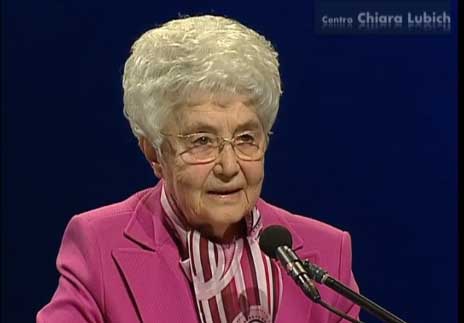
Jul 30, 2016 | Focolare Worldwide, Senza categoria
 “Why are you going to the WYD?” “Because I hope to meet Jesus,” answered a girl who came all the way to Cologne, together with hundreds of thousands of young people from all over the world. I think that she is not the only one who feels this urgent desire to meet Jesus! And it is also the motto of this WYD: look for Christ, find him and adore him. The “World Youth Day” – this inspirational invention of our beloved Pope John Paul II – is a privileged occasion to meet the living Christ in his Church (…). To meet Jesus, adore him and then bring him wherever we go. Dear youth, do you know that there is a secret so you will not lose this Jesus whom you have met during the WYD events, and who appeared to us as such a beautiful, dynamic and fascinating person? The secret is this: we have to love! To love God and remain in Him, and be always in the light, we have to love the others! You see, this is the experience I have acquired in more than 60 years, but it is also the experience of a whole population spread out over the globe, millions of men, women and children who have chosen love as their lifestyle! This is the secret for a happy, full, interesting and ever new life, one that is never boring but always full of surprises! Let me give you a small but great example: I found out recently that a group of young people in a refugee camp in Africa, where practically everything is lacking, wants to change their camp into a paradise through love and they have told me of really concrete experiences that are producing these results. So you see? It means that love overcomes all! We could say numberless things about this love which Jesus taught us with his life, world, and saints. But just for today I would like to underline only two fundamental points: We should love EVERYONE, without exceptions or favouritism– the way God loves us! –and this consists in loving our enemy, that nice and unpleasant person, your teacher, next door neighbour, the postman, and your colleague. To love ALL means also to love people who are far away, but who are present through the mass media, like the victims of the Tsunami in Southeast Asia, or those whom you helped with the Solidarity Fund. The second point is: we have to be THE FIRST to love. We usually love when we are loved, to respond to the love we receive. And if we don’t receive it? No, it is even better to take the initiative, be the first to start, giving a sign of friendship, forgiveness, and the will to start from the very beginning. Try to love in this manner, and you will experience immense freedom because you are the protagonists! Dear youth, take courage! A life like this is worth the while, and you are not made to do things halfway. So give your heart to Him who knows how to fill it. God needs youth like this, inflamed, who cannot be hindered by their own problems, people who have burnt all in the fire of God’s love and who have influenced all to do the same. May Jesus whom you have met, be always with you! In true Love. (Chiara Lubich, Cologne, 16 August 2005) Source: Chiara Lubich Centre
“Why are you going to the WYD?” “Because I hope to meet Jesus,” answered a girl who came all the way to Cologne, together with hundreds of thousands of young people from all over the world. I think that she is not the only one who feels this urgent desire to meet Jesus! And it is also the motto of this WYD: look for Christ, find him and adore him. The “World Youth Day” – this inspirational invention of our beloved Pope John Paul II – is a privileged occasion to meet the living Christ in his Church (…). To meet Jesus, adore him and then bring him wherever we go. Dear youth, do you know that there is a secret so you will not lose this Jesus whom you have met during the WYD events, and who appeared to us as such a beautiful, dynamic and fascinating person? The secret is this: we have to love! To love God and remain in Him, and be always in the light, we have to love the others! You see, this is the experience I have acquired in more than 60 years, but it is also the experience of a whole population spread out over the globe, millions of men, women and children who have chosen love as their lifestyle! This is the secret for a happy, full, interesting and ever new life, one that is never boring but always full of surprises! Let me give you a small but great example: I found out recently that a group of young people in a refugee camp in Africa, where practically everything is lacking, wants to change their camp into a paradise through love and they have told me of really concrete experiences that are producing these results. So you see? It means that love overcomes all! We could say numberless things about this love which Jesus taught us with his life, world, and saints. But just for today I would like to underline only two fundamental points: We should love EVERYONE, without exceptions or favouritism– the way God loves us! –and this consists in loving our enemy, that nice and unpleasant person, your teacher, next door neighbour, the postman, and your colleague. To love ALL means also to love people who are far away, but who are present through the mass media, like the victims of the Tsunami in Southeast Asia, or those whom you helped with the Solidarity Fund. The second point is: we have to be THE FIRST to love. We usually love when we are loved, to respond to the love we receive. And if we don’t receive it? No, it is even better to take the initiative, be the first to start, giving a sign of friendship, forgiveness, and the will to start from the very beginning. Try to love in this manner, and you will experience immense freedom because you are the protagonists! Dear youth, take courage! A life like this is worth the while, and you are not made to do things halfway. So give your heart to Him who knows how to fill it. God needs youth like this, inflamed, who cannot be hindered by their own problems, people who have burnt all in the fire of God’s love and who have influenced all to do the same. May Jesus whom you have met, be always with you! In true Love. (Chiara Lubich, Cologne, 16 August 2005) Source: Chiara Lubich Centre

Jul 28, 2016 | Focolare Worldwide
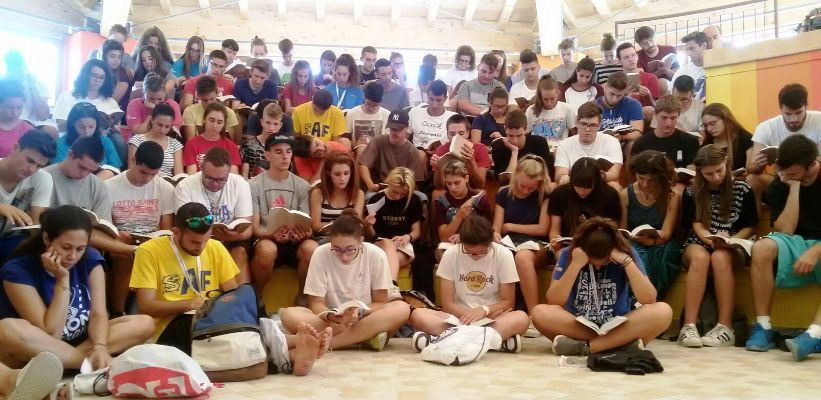 The five coaches of 17-year-olds left Verona for Poland, accompanied by priests, animators and families. The camp in Krakow that was awaiting them was part of the World Youth Day and had been organised exclusively for them. There were also some Gen3 in the group, enthusiastic to be able to also participate in this experience. «The trip also included a stopover in Munich – recounted Fr. Stefano Marcolini of the Focolare, one of the priests accompanying the group – to visit the former Nazi concentration camp in Dachau. Upon returning to Munich in the evening, we decided to go sightseeing in the city, unaware that it would become the site of a terroristic attack. Thank God we were not in the vicinity of the mall where the shooting occurred, but there was such a great confusion that the entire city (the underground, bars and public places) were in a panic situation.It was really fearful and we also had a hard time gathering the group. Thankfully, we had our cell phones and Google maps. Finally at 3 am, we were able to find everyone, and were so generously helped by the local Church which offered us a substantial breakfast. We were contacted by the Local Ministry of Foreign Affairs and received the order to return to Italy, since the group was composed of minors.»
The five coaches of 17-year-olds left Verona for Poland, accompanied by priests, animators and families. The camp in Krakow that was awaiting them was part of the World Youth Day and had been organised exclusively for them. There were also some Gen3 in the group, enthusiastic to be able to also participate in this experience. «The trip also included a stopover in Munich – recounted Fr. Stefano Marcolini of the Focolare, one of the priests accompanying the group – to visit the former Nazi concentration camp in Dachau. Upon returning to Munich in the evening, we decided to go sightseeing in the city, unaware that it would become the site of a terroristic attack. Thank God we were not in the vicinity of the mall where the shooting occurred, but there was such a great confusion that the entire city (the underground, bars and public places) were in a panic situation.It was really fearful and we also had a hard time gathering the group. Thankfully, we had our cell phones and Google maps. Finally at 3 am, we were able to find everyone, and were so generously helped by the local Church which offered us a substantial breakfast. We were contacted by the Local Ministry of Foreign Affairs and received the order to return to Italy, since the group was composed of minors.»  But the kids refused to be overcome, and were encouraged by the words of Pope Francis who had invited the youth to the WYD: “Don’t let anyone steal hope from you.” Upon returning to Italy, they wished to take part just the same in a camp –to do what they would have wanted to do in Krakow – and which the Bishop rapidly set up in a nice place in the mountains. «Upon hearing about their adventure, the Pope encouraged the boys and girls not to give up and told them that all were awaiting them in Krakow. In the meantime, three of them, accompanied by a priest, were invited to Krakow for the Festival of the Italian youth.They were also chosen by the other youths to participate in the linkup with Pope Francis and address him in the Q&A session, precisely regarding the facts in Munich.» «To respond to the Pope’s personal invitation – continued Fr. Stefano – at the end of the camp the coaches headed for Poland, where we arrived on Saturday, the 30th just in time for a private audience with him, since he had changed his previous programme. In addition, due to the great meeting on Saturday evening, where around two million boys and girls were awaited, the Verona group received passes to sit in the first row.All this happened because, as Riccardo, one of the Gen3 said, “We did not allow anyone to steal our hopes from us!”»
But the kids refused to be overcome, and were encouraged by the words of Pope Francis who had invited the youth to the WYD: “Don’t let anyone steal hope from you.” Upon returning to Italy, they wished to take part just the same in a camp –to do what they would have wanted to do in Krakow – and which the Bishop rapidly set up in a nice place in the mountains. «Upon hearing about their adventure, the Pope encouraged the boys and girls not to give up and told them that all were awaiting them in Krakow. In the meantime, three of them, accompanied by a priest, were invited to Krakow for the Festival of the Italian youth.They were also chosen by the other youths to participate in the linkup with Pope Francis and address him in the Q&A session, precisely regarding the facts in Munich.» «To respond to the Pope’s personal invitation – continued Fr. Stefano – at the end of the camp the coaches headed for Poland, where we arrived on Saturday, the 30th just in time for a private audience with him, since he had changed his previous programme. In addition, due to the great meeting on Saturday evening, where around two million boys and girls were awaited, the Verona group received passes to sit in the first row.All this happened because, as Riccardo, one of the Gen3 said, “We did not allow anyone to steal our hopes from us!”»
Jul 28, 2016 | Non categorizzato, Word of
The words of the Gospel shape our lives and give us God’s own life, if we live them. If we share what we experience with others, it does not only nourish them, it gives us life too. By now we have been living the Word of Life for seventy years. The text comes to us and we read the commentary. But what we hope will remain is the sentence that is offered, a word of Scripture, often from Jesus. The ‘Word of Life’ is not simply a meditation, but Jesus speaks in it. He invites us to live, always bringing us to love, to make a gift of our lives. It was an ‘invention’ of Chiara Lubich, who speaks of its origins like this: ‘I was hungry for truth, and I studied philosophy. Indeed, more than that: like many other young people I sought truth and I believed I would find it in study. But then came one of those great ideas from the early times of the Movement, which I immediately communicated to my companions, “What point is there in looking for truth when it lives incarnate in Jesus, the God-man? If the truth attracts us, let’s leave everything, let’s look for Him, and let’s follow Him.” And that is what we did.’ They took the Gospel into their hands and began reading it word by word. They found it completely new. ‘Each word of Jesus was a burst of brightly shining light, all divine! … His words were unique, eternal … fascinating, fashioned with a divine form … they were words of life, to be translated into life, universal words in the midst of space and time.’ They discovered them not to be stuck in the past, not a mere memory, but words that He continuously speaks to us, as He does to each person in every time and place.[1] Yet is Jesus truly our Teacher? We are surrounded by many proposals for our lives, by many teachers of thought, some of them twisted that even lead to violence, while others are straight and enlightening. And yet the words of Jesus have a depth and an ability to attract and move us that other words, whether they be of philosophers, politicians, or poets, do not have. They are ‘words of life’; they can be lived, and they give us the fullness of life; they communicate God’s own life. Each month we focus on one, so that, bit by bit the Gospel penetrates our spirit, transforms us, makes us acquire Jesus’s very own thought, so that we are able to respond to the most widely different situations. Jesus shows himself to be our Teacher. At times we can read the Gospel together. We would like Jesus himself, the Risen Lord, living in the midst of those who are gathered in his name, to explain it, to make it current for us, to suggest how we can put it into practice. The really new thing about the ‘Word of Life’, however, is that we can share our experiences, the graces given when we live it, just as Chiara explained when speaking of what happened in the early times which are still with us now: ‘We felt we had a duty to communicate to others what we had experienced, also because we were aware that by giving it an experience remained and built up our inner life, while, if we did not give it, bit by bit our soul was impoverished. The word was therefore lived intensely all day long and the results were communicated not only among us, but with those who joined the first group…. When it was lived, it was no longer I or we who lived, but the word lived in me, the word lived in the group. And this was the Christian revolution with all of its consequences.’[2] It can be like this today for us too. Fabio Ciardi ______________________ [1] Scritti spirituali, vol. 3 (Rome: Città Nuova, 1979), p. 124. [2] Ibid. pp. 128, 130.
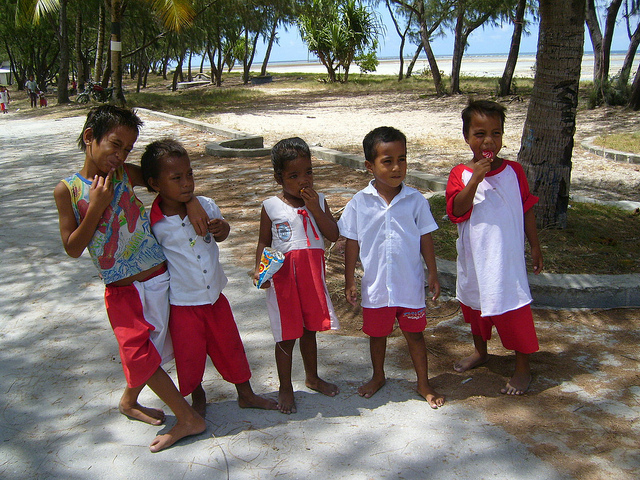
Jul 27, 2016 | Focolare Worldwide
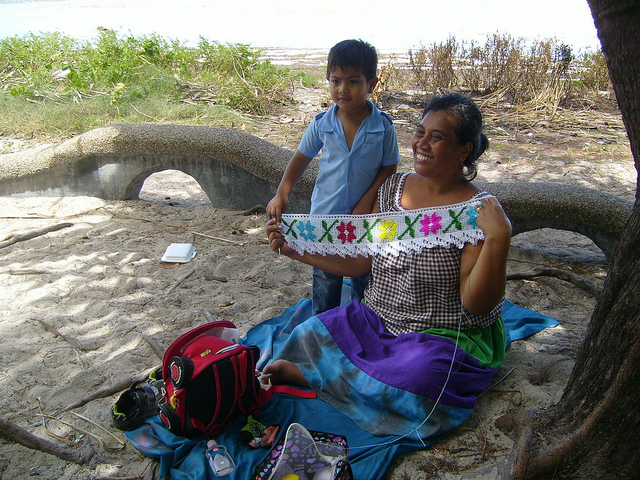 The project that is run by the AMU (Action for a United World) has been operating for several years among the Buota population in one of the poorest villages on the island of Tarawa. Its goal is to improve living conditions in the community with projects that are focused mainly on women and children. Sixty one children of both Catholic and other religious faiths attend the nursery school. Fifteen children fulfilled the pre-school requirements and obtained the certificate of competence from the Ministry of Public Education that qualifies them to begin primary school. “The nursery school also strengthened collaboration among members of the community,” Buota reports. “Children’s mothers often work as a group to provide support. Along with several fundraisers selling bread and blocks of ice, they also contributed to the construction of a new classroom, collecting straw for the roof. The Focolare community, which had come up with the idea for the project, was also actively engaged in the construction of the new classroom that provided more space for the growing pre-school population.” The Kiribati project also provides training classes for women. “At times these were difficult to arrange due to the poor condition of the roads. It’s usually difficult to reach the village; nevertheless, this difficulty was also overcome.”
The project that is run by the AMU (Action for a United World) has been operating for several years among the Buota population in one of the poorest villages on the island of Tarawa. Its goal is to improve living conditions in the community with projects that are focused mainly on women and children. Sixty one children of both Catholic and other religious faiths attend the nursery school. Fifteen children fulfilled the pre-school requirements and obtained the certificate of competence from the Ministry of Public Education that qualifies them to begin primary school. “The nursery school also strengthened collaboration among members of the community,” Buota reports. “Children’s mothers often work as a group to provide support. Along with several fundraisers selling bread and blocks of ice, they also contributed to the construction of a new classroom, collecting straw for the roof. The Focolare community, which had come up with the idea for the project, was also actively engaged in the construction of the new classroom that provided more space for the growing pre-school population.” The Kiribati project also provides training classes for women. “At times these were difficult to arrange due to the poor condition of the roads. It’s usually difficult to reach the village; nevertheless, this difficulty was also overcome.”  Last year four members of the Health Ministry conducted a workshop on childhood nutrition. They discussed the importance of a nourishing diet for physical and mental development, hygiene, natural family planning and organic gardening. A 2-day workshop on organic gardening for the promotion of healthy living was offered with the collaboration of experts from the Department of Agriculture. The importance of spreading this natural approach to gardening with neighbours was strongly stressed, so that many others could learn how to obtain a rich and organic planting soil more easily. By the end of 2015 the first tomatoes and cabbages were already appearing in many of Buota’s organic home gardens! And this is important given the local setting where there is a progressive rise in sea level and decrease in the amount of farmland for planting. Source: AMU online (Associazione per un mondo unito). http://www.amu-it.eu/2016/07/19/kiribati-i-bimbi-crescono-e-anche-i-cavoli/?lang=it
Last year four members of the Health Ministry conducted a workshop on childhood nutrition. They discussed the importance of a nourishing diet for physical and mental development, hygiene, natural family planning and organic gardening. A 2-day workshop on organic gardening for the promotion of healthy living was offered with the collaboration of experts from the Department of Agriculture. The importance of spreading this natural approach to gardening with neighbours was strongly stressed, so that many others could learn how to obtain a rich and organic planting soil more easily. By the end of 2015 the first tomatoes and cabbages were already appearing in many of Buota’s organic home gardens! And this is important given the local setting where there is a progressive rise in sea level and decrease in the amount of farmland for planting. Source: AMU online (Associazione per un mondo unito). http://www.amu-it.eu/2016/07/19/kiribati-i-bimbi-crescono-e-anche-i-cavoli/?lang=it
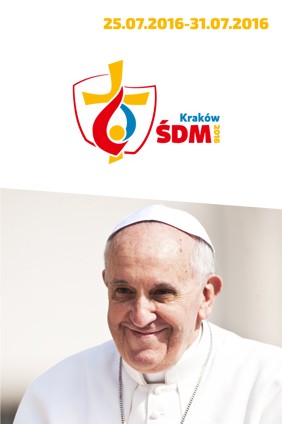
Jul 26, 2016 | Focolare Worldwide
Dear Brothers and Sisters, The 31st World Youth Day is fast approaching. I look forward to meeting the young people from throughout the world gathered in Kraków and having the opportunity to meet the beloved Polish nation. My entire visit will be inspired by Mercy during this Jubilee Year, and by the grateful and blessed memory of Saint John Paul II, who instituted the World Youth Days and was the guide of the Polish people in its recent historic journey towards freedom. Dear young people of Poland, I know that for some time now you have been preparing, especially with your prayers, for this great encounter in Kraków. I thank you heartily for everything that you have done, and for the love with which you have done it. Even now I embrace you and I bless you. Dear young people from throughout Europe, Africa, America, Asia and Oceania! I also bless your countries, your hopes and your journey to Kraków, praying that it will be a pilgrimage of faith and fraternity. May the Lord Jesus grant you the grace to experience personally his words: “Blessed are the merciful, for they will receive mercy” (Mt 5:7). I am very anxious to meet you and to offer the world a new sign of harmony, a mosaic of different faces, from many races, languages, peoples and cultures, but all united in the name of Jesus, who is the Face of Mercy. I now turn to you, dear sons and daughters of the Polish nation! For me, it is a great gift of the Lord to visit you. You are a nation that throughout its history has experienced so many trials, some particularly difficult, and has persevered through the power of faith, upheld by the maternal hands of the Virgin Mary. I am certain that my pilgrimage to the shrine of Czestochowa will immerse me in this proven faith and do me so much good. I thank you for your prayers in preparation for my visit. I thank the bishops and priests, the men and women religious, and the lay faithful, especially families, to whom I will symbolically bring the Post-Synodal Apostolic Exhortation Amoris Laetitia. The moral and spiritual “health” of a nation is seen in its families. That is why Saint John Paul II showed such great concern for engaged couples, young married couples and families. Continue along this road! Dear brothers and sisters, I send you this message as a pledge of my affection. Let us keep close to one another in prayer. I look forward to seeing you in Poland!
The 31st World Youth Day is fast approaching. I look forward to meeting the young people from throughout the world gathered in Kraków and having the opportunity to meet the beloved Polish nation. My entire visit will be inspired by Mercy during this Jubilee Year, and by the grateful and blessed memory of Saint John Paul II, who instituted the World Youth Days and was the guide of the Polish people in its recent historic journey towards freedom. Dear young people of Poland, I know that for some time now you have been preparing, especially with your prayers, for this great encounter in Kraków. I thank you heartily for everything that you have done, and for the love with which you have done it. Even now I embrace you and I bless you. Dear young people from throughout Europe, Africa, America, Asia and Oceania! I also bless your countries, your hopes and your journey to Kraków, praying that it will be a pilgrimage of faith and fraternity. May the Lord Jesus grant you the grace to experience personally his words: “Blessed are the merciful, for they will receive mercy” (Mt 5:7). I am very anxious to meet you and to offer the world a new sign of harmony, a mosaic of different faces, from many races, languages, peoples and cultures, but all united in the name of Jesus, who is the Face of Mercy. I now turn to you, dear sons and daughters of the Polish nation! For me, it is a great gift of the Lord to visit you. You are a nation that throughout its history has experienced so many trials, some particularly difficult, and has persevered through the power of faith, upheld by the maternal hands of the Virgin Mary. I am certain that my pilgrimage to the shrine of Czestochowa will immerse me in this proven faith and do me so much good. I thank you for your prayers in preparation for my visit. I thank the bishops and priests, the men and women religious, and the lay faithful, especially families, to whom I will symbolically bring the Post-Synodal Apostolic Exhortation Amoris Laetitia. The moral and spiritual “health” of a nation is seen in its families. That is why Saint John Paul II showed such great concern for engaged couples, young married couples and families. Continue along this road! Dear brothers and sisters, I send you this message as a pledge of my affection. Let us keep close to one another in prayer. I look forward to seeing you in Poland!
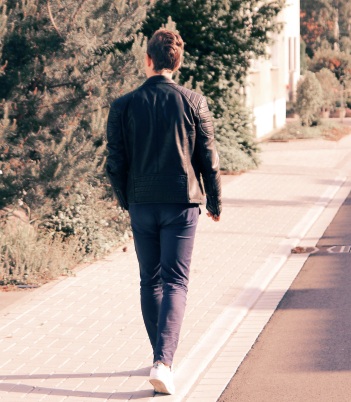
Jul 25, 2016 | Senza categoria
 Accepting others “The Town Hall of my city was instituting a special service for the immigrants. I felt the urge to offer my help for this new service. I tried to find out who had answered to this project in my condominium. Upon meeting various families I realized how much people disliked non-EU nationals. At work many colleagues were irked by the presence of immigrants who are regarded only as competitors for jobs and housing. At first I spoke to my colleagues, trying to stress the importance of accepting those who were different, and it appeared to be of no avail. But slowly I saw that both they and the inhabitants of my condominium, started to take on a “softer” attitude.” (E. M. – Italy) The start of a new faith “I recall that I had just arrived at work when a brutal air raid began. I went with my colleagues to take shelter underground, with an ear to the radio to catch some news. That was how I got to know that also the district where my husband works had been bombed. I felt sick and was about to faint. In that moment I started thinking: «God you are now asking me to renew my faith in you.» I entrusted my children, husband, and parents to him, asking him to help us not to stray from him. Above all I asked him that should the children find themselves orphans, they would encounter in their path people who would guide them towards him. It was an unforgettable heart-to-heart dialogue with God. From that moment on, I have continued my life with faith and infinite gratitude.” (H. S. – Lebanon) Cleaning “One day the owner of the building where I live decided to eliminate all the antennas on the roof, probably for the sake of aesthetics. However, a warring atmosphere brewed in the housing block. How would we have ever won against “Goliath?” The Gospel urged me to try the strategy of humility. Since the doorman was absent for health reasons, the cleaning of the stairs and the entrance was really scarce. Given that the other tenants would never have even dreamt of cleaning their own landings, I took the initiative and started cleaning the stairs right down to the sidewalk. I did it with joy and commitment. That same evening, the owner rang my doorbell and very courteously offered to fix my TV antenna. Surprised and wordless, I took advantage of his good intentions to ask him to install also the other antennas. In the end, all the antennas returned in place. From that moment on, my relationship with my neighbours changed. In addition, they take turns in cleaning the stairs.” (B. M. – France)
Accepting others “The Town Hall of my city was instituting a special service for the immigrants. I felt the urge to offer my help for this new service. I tried to find out who had answered to this project in my condominium. Upon meeting various families I realized how much people disliked non-EU nationals. At work many colleagues were irked by the presence of immigrants who are regarded only as competitors for jobs and housing. At first I spoke to my colleagues, trying to stress the importance of accepting those who were different, and it appeared to be of no avail. But slowly I saw that both they and the inhabitants of my condominium, started to take on a “softer” attitude.” (E. M. – Italy) The start of a new faith “I recall that I had just arrived at work when a brutal air raid began. I went with my colleagues to take shelter underground, with an ear to the radio to catch some news. That was how I got to know that also the district where my husband works had been bombed. I felt sick and was about to faint. In that moment I started thinking: «God you are now asking me to renew my faith in you.» I entrusted my children, husband, and parents to him, asking him to help us not to stray from him. Above all I asked him that should the children find themselves orphans, they would encounter in their path people who would guide them towards him. It was an unforgettable heart-to-heart dialogue with God. From that moment on, I have continued my life with faith and infinite gratitude.” (H. S. – Lebanon) Cleaning “One day the owner of the building where I live decided to eliminate all the antennas on the roof, probably for the sake of aesthetics. However, a warring atmosphere brewed in the housing block. How would we have ever won against “Goliath?” The Gospel urged me to try the strategy of humility. Since the doorman was absent for health reasons, the cleaning of the stairs and the entrance was really scarce. Given that the other tenants would never have even dreamt of cleaning their own landings, I took the initiative and started cleaning the stairs right down to the sidewalk. I did it with joy and commitment. That same evening, the owner rang my doorbell and very courteously offered to fix my TV antenna. Surprised and wordless, I took advantage of his good intentions to ask him to install also the other antennas. In the end, all the antennas returned in place. From that moment on, my relationship with my neighbours changed. In addition, they take turns in cleaning the stairs.” (B. M. – France)
Jul 24, 2016 | Senza categoria
- Data di Morte: 25/07/2016
- Branca di Appartenenza: Volunteer
- Nazione: Argentine
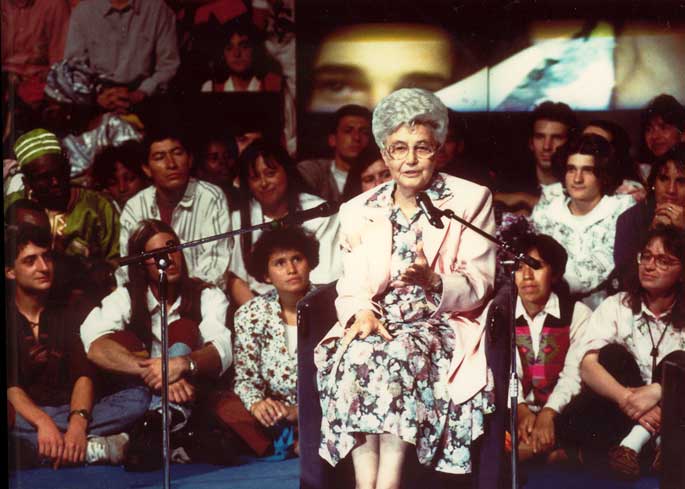
Jul 23, 2016 | Non categorizzato

(C) CSC Audiovisivi
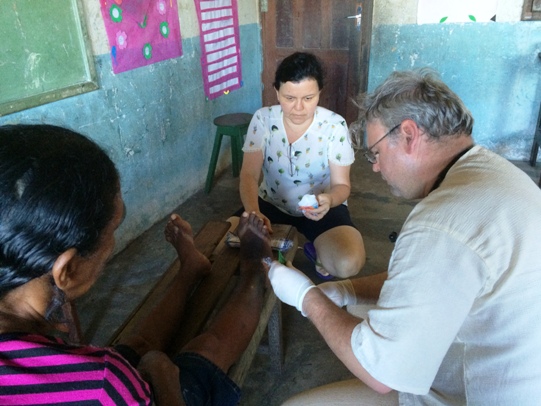
Jul 22, 2016 | Focolare Worldwide
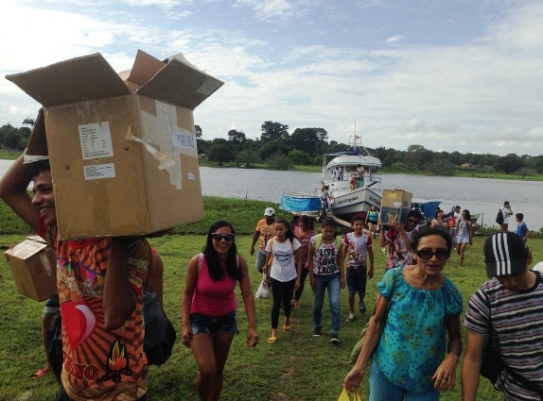 The Amazon is a frequent topic of discussion today because everyone is worried about the deforestation and exploitation of its immense resources by unscrupulous politicians and economists. But very few are aware of the problems of the communities living on the banks of its immense river with the same name, so precious for our sick planet. There are great difficulties in accessing any type of healthcare. For example, in Óbidos (almost 50,000 inhabitants), the only hospital is that run by the Franciscan Third Order, which has only one doctor to tend to the most urgent cases, while for specialized cases the sick have to go to Santarém, a distant six-hour travel by boat. Anxious about the scarce spiritual assistance given to the deeply religious population, the Brasilian Bishops’ Conference (CNBB) called for a concrete response to this issue. This appeal stirred up the interest of hundreds of Focolare members (youths and adults from all over the country and also worldwide) who created the “Amazon Project” in 2005. Each year, during their holidays they set out on a journey to visit the region’s various riverbank communities. Made up of healthcare clinicians, but also of common individuals, they go to lend an ear to the problems of the people, treat the sick, and play with the children in a silent but explicit testimonial of the Gospel in action. In this month of July, there is an ongoing mission of this type in three different districts: Óbidos (Pará), Magnificat (Maranhão) and Barreirinha (Amazonas).
The Amazon is a frequent topic of discussion today because everyone is worried about the deforestation and exploitation of its immense resources by unscrupulous politicians and economists. But very few are aware of the problems of the communities living on the banks of its immense river with the same name, so precious for our sick planet. There are great difficulties in accessing any type of healthcare. For example, in Óbidos (almost 50,000 inhabitants), the only hospital is that run by the Franciscan Third Order, which has only one doctor to tend to the most urgent cases, while for specialized cases the sick have to go to Santarém, a distant six-hour travel by boat. Anxious about the scarce spiritual assistance given to the deeply religious population, the Brasilian Bishops’ Conference (CNBB) called for a concrete response to this issue. This appeal stirred up the interest of hundreds of Focolare members (youths and adults from all over the country and also worldwide) who created the “Amazon Project” in 2005. Each year, during their holidays they set out on a journey to visit the region’s various riverbank communities. Made up of healthcare clinicians, but also of common individuals, they go to lend an ear to the problems of the people, treat the sick, and play with the children in a silent but explicit testimonial of the Gospel in action. In this month of July, there is an ongoing mission of this type in three different districts: Óbidos (Pará), Magnificat (Maranhão) and Barreirinha (Amazonas).  Twenty-two volunteers went to Óbidos, among whom were four doctors, a dentist, a physiotherapist and a medical student. With the logistics support of the inhabitants during their untiring seven-day stay in those places, they were able to visit seven communities and treat a total of over a thousand people. They went from house to house, and were put up for the night by the generosity of the people who did not hesitate to stand by the volunteers and give a helping hand, thus creating a warm atmosphere of brotherhood amongst all. When the time came to depart, the scene was always the same: nobody wanted to believe that the “missionaries” would be leaving the next day for another community, and no one could say who experienced more joy in that intense day passed together. If there is truth in the saying, “there is more joy in giving than in receiving,” it is also true that – as the volunteers said – they felt it was they who received more, in the close encounter with such a genuine population, so rich in values, courage, and authentic faith. Every departure was sealed by the promise to return the next year, accompanied by new friends influenced by their enthusiasm. A young volunteer of Benevides gave a touching testimonial, saying that he was grateful he had “grown spiritually and as a person.” A girl from Belém, struck by “these extraordinary people she had met,” declared that once she returned home she would “recommend to all to undertake a similar experience.” Another young man from Belém remarked: “I live in a society that takes interest only in the latest Smartphone model, whereas over here, I saw children who were happy to receive just a simple pencil. I saw people line up, without managing to be visited by the doctors, while over here, people start complaining when they have to wait a bit. And yet, though they are in a disadvantaged situation, these people are always joyful. Upon listening to their stories, I was convinced that some of them would really deserve an honorary degree.” See also: http://projetoamazonia2016.blogspot.com.br/ Tweet: Doctors, nurses and Focolare members have launched the Amazon Project.
Twenty-two volunteers went to Óbidos, among whom were four doctors, a dentist, a physiotherapist and a medical student. With the logistics support of the inhabitants during their untiring seven-day stay in those places, they were able to visit seven communities and treat a total of over a thousand people. They went from house to house, and were put up for the night by the generosity of the people who did not hesitate to stand by the volunteers and give a helping hand, thus creating a warm atmosphere of brotherhood amongst all. When the time came to depart, the scene was always the same: nobody wanted to believe that the “missionaries” would be leaving the next day for another community, and no one could say who experienced more joy in that intense day passed together. If there is truth in the saying, “there is more joy in giving than in receiving,” it is also true that – as the volunteers said – they felt it was they who received more, in the close encounter with such a genuine population, so rich in values, courage, and authentic faith. Every departure was sealed by the promise to return the next year, accompanied by new friends influenced by their enthusiasm. A young volunteer of Benevides gave a touching testimonial, saying that he was grateful he had “grown spiritually and as a person.” A girl from Belém, struck by “these extraordinary people she had met,” declared that once she returned home she would “recommend to all to undertake a similar experience.” Another young man from Belém remarked: “I live in a society that takes interest only in the latest Smartphone model, whereas over here, I saw children who were happy to receive just a simple pencil. I saw people line up, without managing to be visited by the doctors, while over here, people start complaining when they have to wait a bit. And yet, though they are in a disadvantaged situation, these people are always joyful. Upon listening to their stories, I was convinced that some of them would really deserve an honorary degree.” See also: http://projetoamazonia2016.blogspot.com.br/ Tweet: Doctors, nurses and Focolare members have launched the Amazon Project.
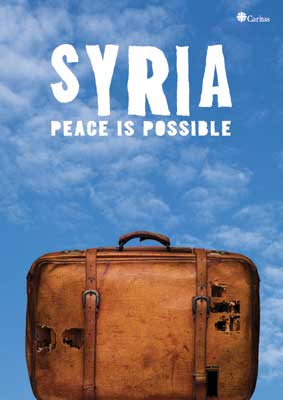
Jul 21, 2016 | Focolare Worldwide

Syrian artist, Tammam Azzam’s artwork for Caritas ‘Syria: Peace is Possible’ campaign
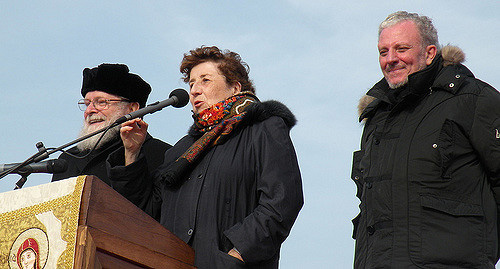
Jul 20, 2016 | Non categorizzato
 «What a great support for the Way Carmen has been. What a strong woman! I have never met any other person like her». With these words Kiko Argüello announced the death of Carmen Hernández in a letter to all the wayfarers, those who have adhered to the Neocatechumenal spirit, He furthermore wrote that Carmen represented a «marvellous event» and reflected the ideal «woman, her great genius, her charism, and her love for the Pope, and above all, the Church.» Together with Kiko Argüello and Fr. Mario Pezzi, Carmen Hernández was a leader of the Way worldwide. The funeral will be held on 21 July, in the Madrid Cathedral, to be presided by Archbishop Carlos Osoro Sierra. Over 30,000 neocatechumenal communities in 120 countries will commemorate her, in the presence of Bishops and Cardinals who are close to the Neocatechumenal movement. Born in Olvega, Spain, Carmen lived a long life, always in communion with the Spirit which had led her, after her studies in chemistry, to discover the missionary vocation she had felt in her youth.. Then came the stint in a missionary institute, studies on the liturgy within the context of the profound council renewal, and a two-year experience in the Holy Land. Lastly, in 1964 her encounter with Kiko amid the slums of Palomeras Altas, at the outskirts of Madrid: it was there that she felt the evangelical spirit was leading her towards a new form of commitment with the Christian community that was starting amongst the poor. The presence of Carmen offered a solid theological and liturgical basis to Kiko’s forceful catechesis, and their action became a real post-baptismal formation. She played a fundamental role in the drafting of the Statutes of the Way, which was approved by the Holy See in 2011. In 2015 she received the Honoris Causa Doctorate in Sacred Theology from the Catholic University of America in Washington, as an acknowledgement of her great contribution to Christian formation throughout the world. «You have received a great charism, for the baptismal renewal of life,» she had said to Pope Francis in her speech before the followers of the Neocatechumenal Way last 18 March, the last time she appeared in public. But the Holy Father spoke to her personally on the phone last 1 July during a private audience granted to Kiko Argüello and Fr. Mario Pezzi. The Focolare Movement joins the prayers and thanksgiving, in keeping alive the communion between the ecclesiastical movements ratified in the Pentecost of 1998 when Pope John Paul II met the Movements and New communities for the first time, each of which is the particular fruit of a charism endowed by the Holy Spirit to the Church and humanity, to respond to the needs of our time. Maria Chiara De Lorenzo
«What a great support for the Way Carmen has been. What a strong woman! I have never met any other person like her». With these words Kiko Argüello announced the death of Carmen Hernández in a letter to all the wayfarers, those who have adhered to the Neocatechumenal spirit, He furthermore wrote that Carmen represented a «marvellous event» and reflected the ideal «woman, her great genius, her charism, and her love for the Pope, and above all, the Church.» Together with Kiko Argüello and Fr. Mario Pezzi, Carmen Hernández was a leader of the Way worldwide. The funeral will be held on 21 July, in the Madrid Cathedral, to be presided by Archbishop Carlos Osoro Sierra. Over 30,000 neocatechumenal communities in 120 countries will commemorate her, in the presence of Bishops and Cardinals who are close to the Neocatechumenal movement. Born in Olvega, Spain, Carmen lived a long life, always in communion with the Spirit which had led her, after her studies in chemistry, to discover the missionary vocation she had felt in her youth.. Then came the stint in a missionary institute, studies on the liturgy within the context of the profound council renewal, and a two-year experience in the Holy Land. Lastly, in 1964 her encounter with Kiko amid the slums of Palomeras Altas, at the outskirts of Madrid: it was there that she felt the evangelical spirit was leading her towards a new form of commitment with the Christian community that was starting amongst the poor. The presence of Carmen offered a solid theological and liturgical basis to Kiko’s forceful catechesis, and their action became a real post-baptismal formation. She played a fundamental role in the drafting of the Statutes of the Way, which was approved by the Holy See in 2011. In 2015 she received the Honoris Causa Doctorate in Sacred Theology from the Catholic University of America in Washington, as an acknowledgement of her great contribution to Christian formation throughout the world. «You have received a great charism, for the baptismal renewal of life,» she had said to Pope Francis in her speech before the followers of the Neocatechumenal Way last 18 March, the last time she appeared in public. But the Holy Father spoke to her personally on the phone last 1 July during a private audience granted to Kiko Argüello and Fr. Mario Pezzi. The Focolare Movement joins the prayers and thanksgiving, in keeping alive the communion between the ecclesiastical movements ratified in the Pentecost of 1998 when Pope John Paul II met the Movements and New communities for the first time, each of which is the particular fruit of a charism endowed by the Holy Spirit to the Church and humanity, to respond to the needs of our time. Maria Chiara De Lorenzo
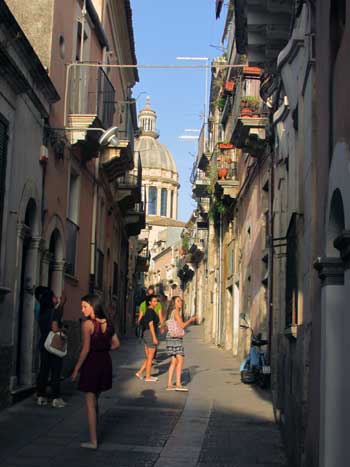
Jul 20, 2016 | Focolare Worldwide
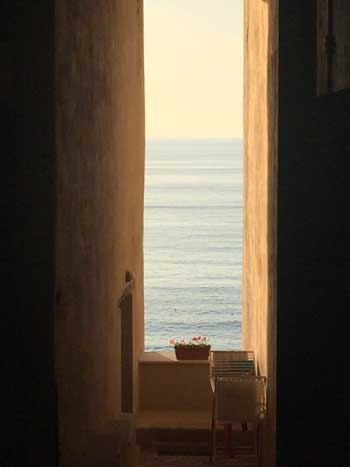 5,000 kilometres. Three architecture students from Colombia, a list of places, people from Italy and Malta, landscapes and experiences to confront themselves with, preferring the less renowned sites. “These were the ingredients of a tour inspired by the Grand Tour which led the new graduates to Italy, to learn onsite, touch with their hands, and make a direct experience,” explained the Italian architects and project coordinators, Lole Parisi and Mario Tancredi. They also revealed the origin of the name, Habitandando (Learning Along the Way), with a journey as the method and the territory as classroom, that took place from 29 June to 16 July: “Abitare, which means possessing in a sense, and andare, that represents the short-lived moments in wandering through the territory to acquire, in order to comprehend, and travelling as a learning procedure.” The trip, created by Dialogue in Architecture together with the travelling workshop of Bogotà’s La Salle University, with which there has been an ongoing cooperation, had an academic but also experiential feature. The stages of the route also reached Catania, where a group of architects and engineers was working on a huge project – guided by Paolo Mungiovino – for the recovery of an old historical building: the former Crociferi Convent, in the heart of the old city centre which will act as an Egyptian Museum, thanks to an agreement with the museum of Turin.
5,000 kilometres. Three architecture students from Colombia, a list of places, people from Italy and Malta, landscapes and experiences to confront themselves with, preferring the less renowned sites. “These were the ingredients of a tour inspired by the Grand Tour which led the new graduates to Italy, to learn onsite, touch with their hands, and make a direct experience,” explained the Italian architects and project coordinators, Lole Parisi and Mario Tancredi. They also revealed the origin of the name, Habitandando (Learning Along the Way), with a journey as the method and the territory as classroom, that took place from 29 June to 16 July: “Abitare, which means possessing in a sense, and andare, that represents the short-lived moments in wandering through the territory to acquire, in order to comprehend, and travelling as a learning procedure.” The trip, created by Dialogue in Architecture together with the travelling workshop of Bogotà’s La Salle University, with which there has been an ongoing cooperation, had an academic but also experiential feature. The stages of the route also reached Catania, where a group of architects and engineers was working on a huge project – guided by Paolo Mungiovino – for the recovery of an old historical building: the former Crociferi Convent, in the heart of the old city centre which will act as an Egyptian Museum, thanks to an agreement with the museum of Turin.  In Chiaramonte Gulfi (Ragusa), after a warm welcome in the presence of the Vice Mayor and some Municipal Councilors, they were introduced to the experience of the Fo.Co Cooperative at the core of the current challenges of Sicily, and to even more: the arrival of the migrants and refugees. «There we learned how to reconcile love for one’s own land, with the challenges of integration carried out in a widespread and attentive manner. It was a real lesson on dialogue,» Mario and Lole recounted. In Calabria, the guide was Maria Elena Lo Schiavo, Vice Mayor of Marina di Gioiosa Ionica: «With her simplicity she showed us the well-known determination of these people who say “no” to the Mafia, and “yes” to personal commitment, with positive outlooks. Anna Cundari, architect of Cosenza, lead us instead deep into the heart of the National Pollino Park amid villages at risk of abandonment, allowing us to meet people who, for love of their land, say their own “yes” with force and generosity, restoring and rebuilding often with their own hands, houses and shrines, and with these, also a bit of the spirit of this land.» In Pescara, the students and teachers of the Annunzio University, inspired by the force of the social impulse of the Bogotà University, undertook a difficult path in one of the huge, downgraded districts of the city on the Adriatic Sea, inhabited by Gypsy ethnic groups and immigrants, involving also the schools and associations. «In the list of encounters during this 15-day journey – the organizers conclude – there was much more but in short, we feel that we had tasted “beauty” which, apart from the aesthetic values, highlighted the relationships between people and the territories. It was thus because of this that the beauty of landscapes, villages and cities were “lit up” also by the relationships, dialogue, and upholding of good practices which still so many people are able to set into motion, without clamour.» Maria Chiara De Lorenzo
In Chiaramonte Gulfi (Ragusa), after a warm welcome in the presence of the Vice Mayor and some Municipal Councilors, they were introduced to the experience of the Fo.Co Cooperative at the core of the current challenges of Sicily, and to even more: the arrival of the migrants and refugees. «There we learned how to reconcile love for one’s own land, with the challenges of integration carried out in a widespread and attentive manner. It was a real lesson on dialogue,» Mario and Lole recounted. In Calabria, the guide was Maria Elena Lo Schiavo, Vice Mayor of Marina di Gioiosa Ionica: «With her simplicity she showed us the well-known determination of these people who say “no” to the Mafia, and “yes” to personal commitment, with positive outlooks. Anna Cundari, architect of Cosenza, lead us instead deep into the heart of the National Pollino Park amid villages at risk of abandonment, allowing us to meet people who, for love of their land, say their own “yes” with force and generosity, restoring and rebuilding often with their own hands, houses and shrines, and with these, also a bit of the spirit of this land.» In Pescara, the students and teachers of the Annunzio University, inspired by the force of the social impulse of the Bogotà University, undertook a difficult path in one of the huge, downgraded districts of the city on the Adriatic Sea, inhabited by Gypsy ethnic groups and immigrants, involving also the schools and associations. «In the list of encounters during this 15-day journey – the organizers conclude – there was much more but in short, we feel that we had tasted “beauty” which, apart from the aesthetic values, highlighted the relationships between people and the territories. It was thus because of this that the beauty of landscapes, villages and cities were “lit up” also by the relationships, dialogue, and upholding of good practices which still so many people are able to set into motion, without clamour.» Maria Chiara De Lorenzo
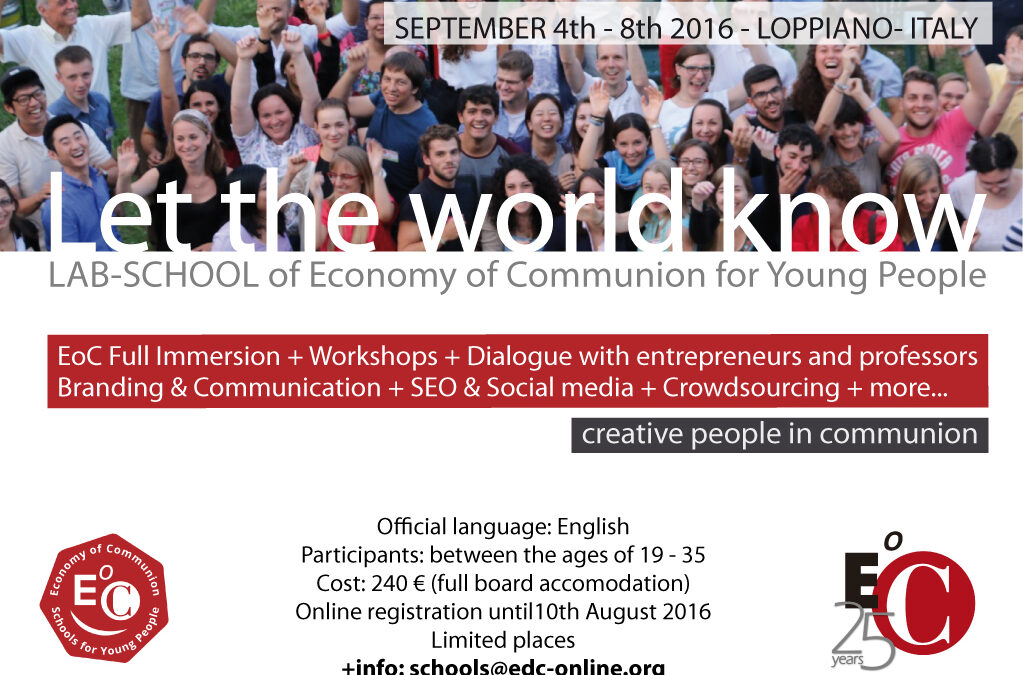
Jul 18, 2016 | Non categorizzato
Download invitation 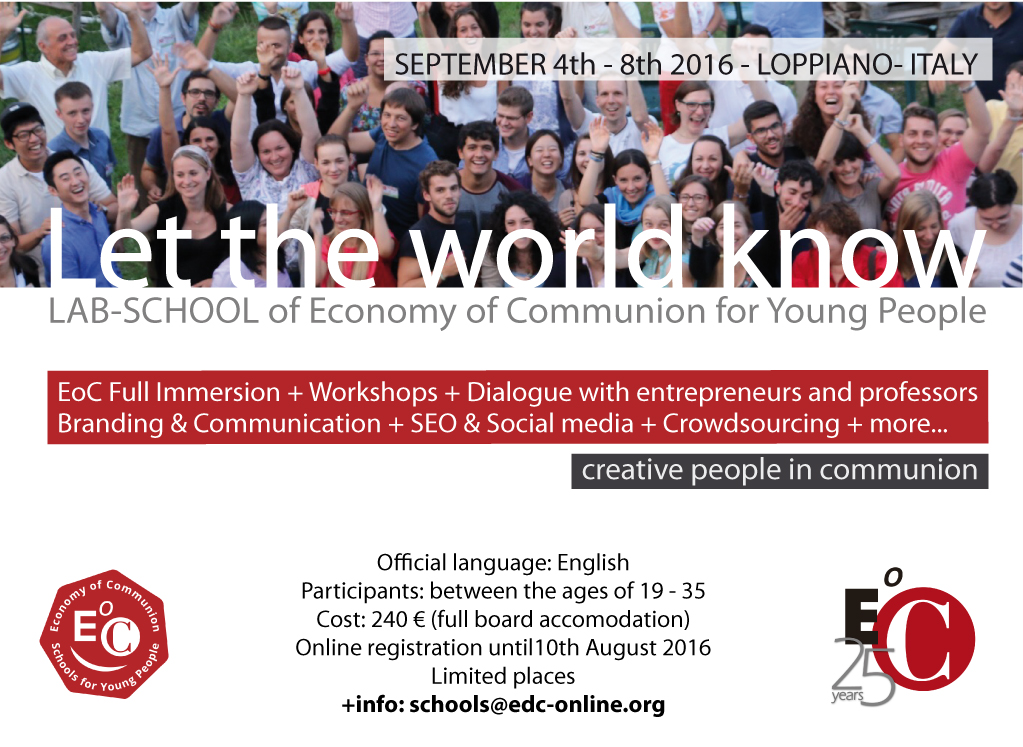
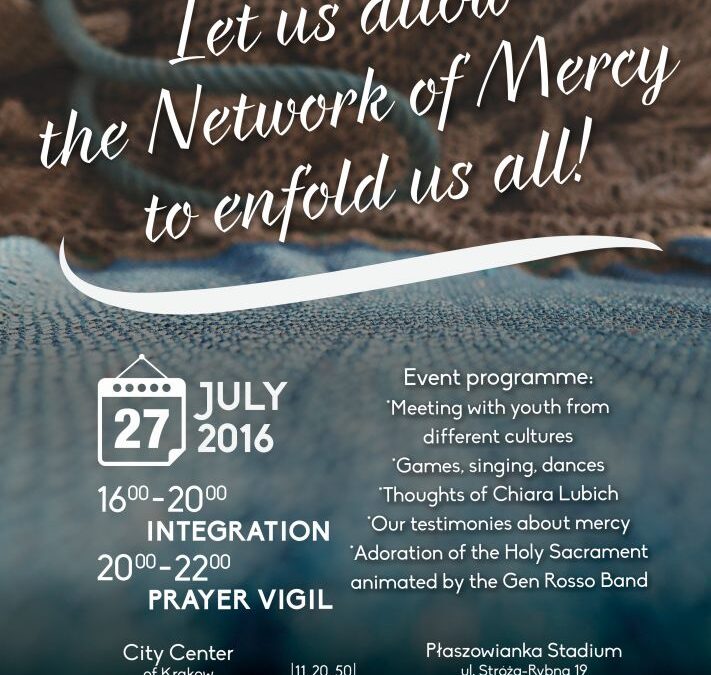
Jul 18, 2016 | Focolare Worldwide
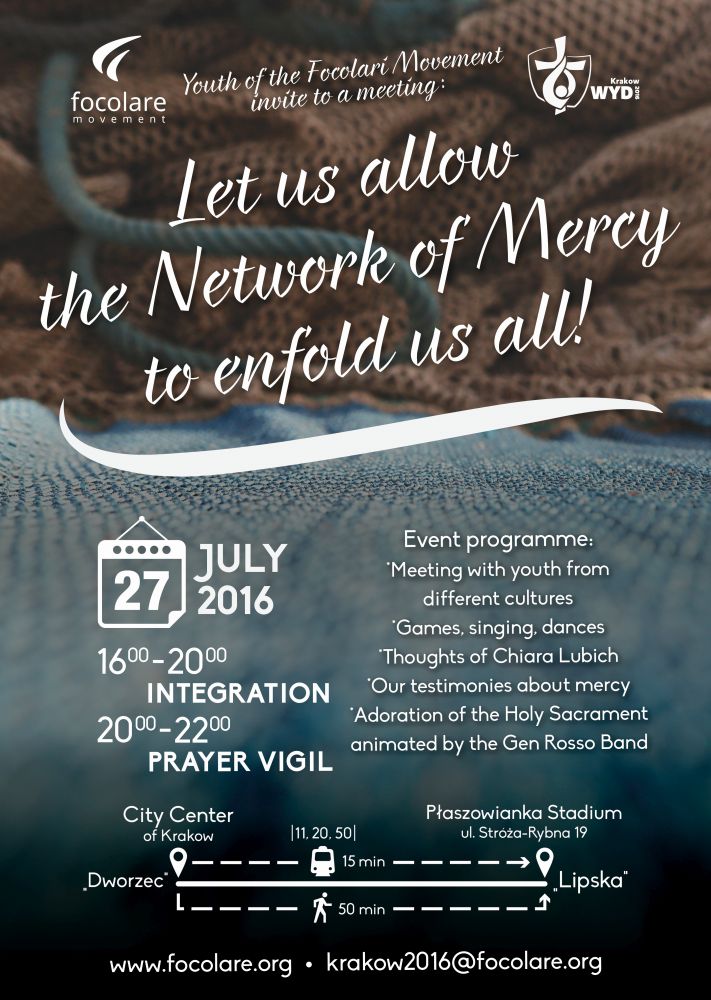 WYD program Info: http://www.krakow2016.com/ “The news that the forthcoming World Youth Day would be held in Krakow brought much joy to the Polish people. During the three years of preparation with the youth of the Focolare Movement we asked ourselves how we could contribute to the realization of this event. It seemed natural to insert ourselves in the programme in an active and communitarian way. Slowly our role in the Youthfest took became clear, a religious and artistic-cultural programme to be held during the WYD and which should include artistic initiatives, of a religious and spiritual nature. There will be concerts, exhibits, workshops, sporting events, theatre, etc. wherein all the youth of the WYD who are interested can participate free of charge. We were entrusted with the preparation of one of these events that will be held on July 27 and…in this moment we are immersed in the preparations! We planned this meeting to be divided into two parts: integration and reflection. The first will be a moment of games, dances and songs, an occasion to get to know the others. We know that the participants will be coming from different parts of the world and we are hoping that language will not be a barrier to unity. Keeping in mind that the theme of the WYD is encapsulated in the words “Blessed are the merciful, because they will find mercy (Mt 5, 7), we chose as the motto of our meeting the net of mercy that we want to weave among us and to which we would like to invite the person beside us to join. Our desire is also that of inviting the youth to participate in an international prayer. In the second part of the event we will organize a vigil of reflection where, through choreography, music and experiences, we will speak of the spiritual and corporal works of mercy. During the adoration of the Blessed Sacrament the reflection will be accompanied by texts of Chiara Lubich and songs of the Gen Rosso. We will also be present in the Center for Vocations where the youth can get to know the initiatives of the religious orders, Catholic schools and universities, religious publishing houses, missionary organizations, national and international Movements and ecclesial Communities. Here as the Focolare Movement we will be at the disposition of all those who would like to know more about our community. We hope that this WYD can be a time of union with God and with the others for us and that all those who will participate in our event could make an experience of unity to share with the others and to live in their own environment.”
WYD program Info: http://www.krakow2016.com/ “The news that the forthcoming World Youth Day would be held in Krakow brought much joy to the Polish people. During the three years of preparation with the youth of the Focolare Movement we asked ourselves how we could contribute to the realization of this event. It seemed natural to insert ourselves in the programme in an active and communitarian way. Slowly our role in the Youthfest took became clear, a religious and artistic-cultural programme to be held during the WYD and which should include artistic initiatives, of a religious and spiritual nature. There will be concerts, exhibits, workshops, sporting events, theatre, etc. wherein all the youth of the WYD who are interested can participate free of charge. We were entrusted with the preparation of one of these events that will be held on July 27 and…in this moment we are immersed in the preparations! We planned this meeting to be divided into two parts: integration and reflection. The first will be a moment of games, dances and songs, an occasion to get to know the others. We know that the participants will be coming from different parts of the world and we are hoping that language will not be a barrier to unity. Keeping in mind that the theme of the WYD is encapsulated in the words “Blessed are the merciful, because they will find mercy (Mt 5, 7), we chose as the motto of our meeting the net of mercy that we want to weave among us and to which we would like to invite the person beside us to join. Our desire is also that of inviting the youth to participate in an international prayer. In the second part of the event we will organize a vigil of reflection where, through choreography, music and experiences, we will speak of the spiritual and corporal works of mercy. During the adoration of the Blessed Sacrament the reflection will be accompanied by texts of Chiara Lubich and songs of the Gen Rosso. We will also be present in the Center for Vocations where the youth can get to know the initiatives of the religious orders, Catholic schools and universities, religious publishing houses, missionary organizations, national and international Movements and ecclesial Communities. Here as the Focolare Movement we will be at the disposition of all those who would like to know more about our community. We hope that this WYD can be a time of union with God and with the others for us and that all those who will participate in our event could make an experience of unity to share with the others and to live in their own environment.”
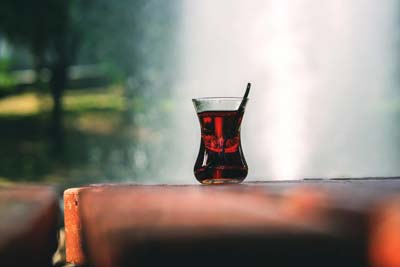
Jul 16, 2016 | Focolare Worldwide
Risk-dependent 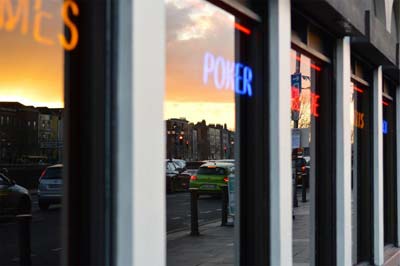 «I’m a priest. One of my former course mates in the seminary who didn’t continue the course for priesthood fell into the habit of gambling, and developed an addiction. He was a brilliant man. His wife had left him due to the debts he accumulated and also his own family didn’t want to have anything to do with him. His earnings were not enough to cover the bank interests. When he contacted me to ask my help, I listened to him lengthily. But his main worry was only to pay his debts, and did not want any counsel. I introduced him to a doctor friend and a lawyer: the addiction issue was evident. So I tried to find a centre that could treat this problem and also the lawyer committed his free services. Now he’s in an institute and recovering well. One day while I was praying for him, I realized that to be able to show true charity, we need to use our hearts, minds and strength.» (B. D. – Italy) The next-door neighbour
«I’m a priest. One of my former course mates in the seminary who didn’t continue the course for priesthood fell into the habit of gambling, and developed an addiction. He was a brilliant man. His wife had left him due to the debts he accumulated and also his own family didn’t want to have anything to do with him. His earnings were not enough to cover the bank interests. When he contacted me to ask my help, I listened to him lengthily. But his main worry was only to pay his debts, and did not want any counsel. I introduced him to a doctor friend and a lawyer: the addiction issue was evident. So I tried to find a centre that could treat this problem and also the lawyer committed his free services. Now he’s in an institute and recovering well. One day while I was praying for him, I realized that to be able to show true charity, we need to use our hearts, minds and strength.» (B. D. – Italy) The next-door neighbour 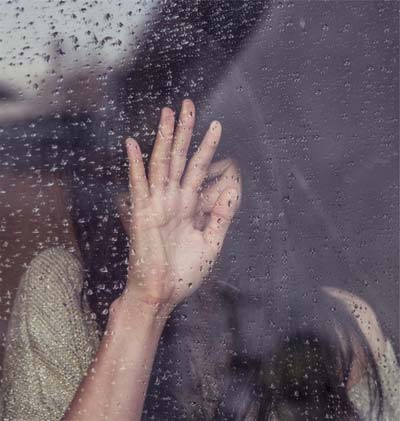 «One of my neighbours was in trouble: we could see this in the way she dressed and her sad looks. When I invited her to the house one afternoon, she confided that they had used up all their savings for her husband’s illness and the pension was not enough to live on. My husband and I decided to offer them a part of our savings. She didn’t want to accept since she wouldn’t be able to pay us back. But we insisted, confiding that divine Providence would give us a hand if we ever needed it. Shortly after, our daughter started to work and needed a car to move around, but we didn’t have enough to buy one. When a relative of our neighbor discovered this, she gave us her car as a gift; she no longer used it and it was still in excellent condition. Her reason for this gesture was: “I found out what you did for my aunt and uncle. It’s the least I could do to thank you.”» (R. F. – France) Red beet juice
«One of my neighbours was in trouble: we could see this in the way she dressed and her sad looks. When I invited her to the house one afternoon, she confided that they had used up all their savings for her husband’s illness and the pension was not enough to live on. My husband and I decided to offer them a part of our savings. She didn’t want to accept since she wouldn’t be able to pay us back. But we insisted, confiding that divine Providence would give us a hand if we ever needed it. Shortly after, our daughter started to work and needed a car to move around, but we didn’t have enough to buy one. When a relative of our neighbor discovered this, she gave us her car as a gift; she no longer used it and it was still in excellent condition. Her reason for this gesture was: “I found out what you did for my aunt and uncle. It’s the least I could do to thank you.”» (R. F. – France) Red beet juice  «Cristina, a widow for some years now, has never given up in the face of difficulties that arose after her husband’s death. In fact, she doubled her commitment to help others. Her colleague at work, also a widow, was not liked by the others because of her ways. One day, seeing her very pale face, Cristina asked her what was wrong. The colleague answered vaguely that she was not well and was taking a lot of medicine. So Cristina started to prepare a bottle of red beet juice for her every week. Surprised by all this caring, the colleague confided to Cristina: “I think that the force you have in going towards others is a gift from God, unlike me because I only lived on anger and pain after my husband’s death. This is the real disease I have.”» (C. K. – Hungary) Source: The day’s Gospel, New City, July 2016
«Cristina, a widow for some years now, has never given up in the face of difficulties that arose after her husband’s death. In fact, she doubled her commitment to help others. Her colleague at work, also a widow, was not liked by the others because of her ways. One day, seeing her very pale face, Cristina asked her what was wrong. The colleague answered vaguely that she was not well and was taking a lot of medicine. So Cristina started to prepare a bottle of red beet juice for her every week. Surprised by all this caring, the colleague confided to Cristina: “I think that the force you have in going towards others is a gift from God, unlike me because I only lived on anger and pain after my husband’s death. This is the real disease I have.”» (C. K. – Hungary) Source: The day’s Gospel, New City, July 2016
Jul 14, 2016 | Focolare Worldwide
https://vimeo.com/171535577
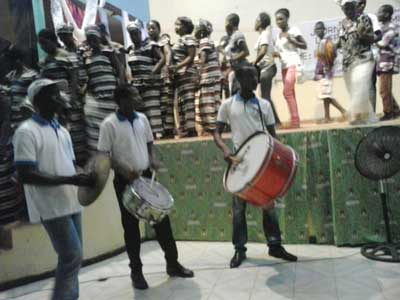
Jul 13, 2016 | Focolare Worldwide
 “A blaze never starts from a large fire, but from a small flame. Today we’re here to light this flame.” These words from Bishop Gaspard Béby Gnéba on the Day of Mercy and Fraternity Among the Peoples, tell what the living experience was like,” write Vitoria Fransiscati and Bertin Lubundi from the permanent Mariapolis in Man, Mariapolis Victoria, at the conclusión of the Day of Mercy organized by the Focolare upon the urging of the Bishop of Man, on June 24-26. The period of preparation allowed for a series of different kinds of encounters in a diocese where only 6% of the members are baptized. So, there are many opportunities for dialogue! Fifteen traditional leaders and 18 imams from 33 of the city’s quarters attended the day on Fraternity in Politics on June 25th. Two of the topics discused were conflict resolution and thoughts and experiences on the “practice of authority” which led to a lively debate. One of the most interesting testimonies was that of Imam Rev. Koné from the most important mosque in Man. He spoke of his relationship with the Catholic bishop: “It was he who first approached me; he first loved me. We came up with a plan of action, and now is the time to put the plan into practice. We need to help one another to respect and accept our differences and to know one another’s faith.” The event opened on the evening of June 24th with a concert called: “Many People, One Family” which included performances by several different ethnic artisitic groups. The Days of Mercy woke up the city of Man with a Peace March: Christians and Muslims marched together on a 7km walk from the centre of the city to the Focolare’s permanent Mariapolis. Then, there was a series of visits and taking gifts to 32 needy families from practically all the quarters in Man. The protagonists were the bishop with his delegation and the families. “They were emotional and joyful moments for the people we visited, also the fact of seeing the bishop himself bringing gifts without expecting anything in return, as unfortunately happens often with some politicians who want to buy support.” This was a start at fulfilling a dream, the Bishop said: “It was a training for people who hold responsiblities in society, adminstrators and those who work in interreligious dialogue, so they might continue to live mercy in civil society.” RTI videonews (original language) https://www.youtube.com/watch?v=yvsr0KwISTs&feature=player_embedded Maria Chiara De Lorenzo
“A blaze never starts from a large fire, but from a small flame. Today we’re here to light this flame.” These words from Bishop Gaspard Béby Gnéba on the Day of Mercy and Fraternity Among the Peoples, tell what the living experience was like,” write Vitoria Fransiscati and Bertin Lubundi from the permanent Mariapolis in Man, Mariapolis Victoria, at the conclusión of the Day of Mercy organized by the Focolare upon the urging of the Bishop of Man, on June 24-26. The period of preparation allowed for a series of different kinds of encounters in a diocese where only 6% of the members are baptized. So, there are many opportunities for dialogue! Fifteen traditional leaders and 18 imams from 33 of the city’s quarters attended the day on Fraternity in Politics on June 25th. Two of the topics discused were conflict resolution and thoughts and experiences on the “practice of authority” which led to a lively debate. One of the most interesting testimonies was that of Imam Rev. Koné from the most important mosque in Man. He spoke of his relationship with the Catholic bishop: “It was he who first approached me; he first loved me. We came up with a plan of action, and now is the time to put the plan into practice. We need to help one another to respect and accept our differences and to know one another’s faith.” The event opened on the evening of June 24th with a concert called: “Many People, One Family” which included performances by several different ethnic artisitic groups. The Days of Mercy woke up the city of Man with a Peace March: Christians and Muslims marched together on a 7km walk from the centre of the city to the Focolare’s permanent Mariapolis. Then, there was a series of visits and taking gifts to 32 needy families from practically all the quarters in Man. The protagonists were the bishop with his delegation and the families. “They were emotional and joyful moments for the people we visited, also the fact of seeing the bishop himself bringing gifts without expecting anything in return, as unfortunately happens often with some politicians who want to buy support.” This was a start at fulfilling a dream, the Bishop said: “It was a training for people who hold responsiblities in society, adminstrators and those who work in interreligious dialogue, so they might continue to live mercy in civil society.” RTI videonews (original language) https://www.youtube.com/watch?v=yvsr0KwISTs&feature=player_embedded Maria Chiara De Lorenzo

 “An unexpected phone call came one early morning. My elder brother’s voice at the other end of the line sounded confused. My nephew had just met an accident. He had been about to pick up my brother from work, but while driving he had dozed off, and those few seconds were enough for him to hit a motorcycle and kill two of his colleagues. They were both married men with families. It was indeed a shock for me; it was so heartbreaking. I went to look for my nephew. He was in a prison cell. I didn’t know what to say; I could only cry with him. Since it was early morning and my nephew and the other detainees had not yet had breakfast, I went to buy some food for them. Then I asked the prison guard if it was possible to clean the prison cell which was quite dirty. When my brother arrived and started crying, I stayed to comfort him. At this point, I realized that our next step had to be to ask for forgiveness from the families of the two victims. I told my brother that we should go to their wakes, face their families and ask for their forgiveness. My brother agreed, overcoming his own fear. We went to see the first family … and we went straight to the widow, who was crying. She was indeed quite angry with my brother. I felt I had to be there to absorb all her pain. Then I embraced her and said, ‘We are here to ask your forgiveness for what happened, without expecting to be forgiven.’ Then we also had to ask forgiveness from the victim’s parents. Their relatives advised us not to, because they were afraid that his mother would lose her calm and be beside herself with anger. But I strongly felt that we had to do it. I approached the mother, with my brother close behind me. Indeed, she cried aloud as I entrusted everything silently to God and embraced her tightly asking her to forgive us, also on behalf of my nephew. I assured her that if we would have found the way to take care of their family, providing for the education of the three daughters who were still in grade school. I was profoundly experiencing the pain and sorrow of t family, but at the same time, I fully experienced that peace that only God can give. Before leaving, we went to say goodbye to the widow. She did not say anything to my brother; but she did introduce me to her three daughters. This consoled me since I considered it an indication that I was able to establish some kind of a relationship with her. Some days later, with some friends from the Focolare, I attended the funeral… and also visited the family of the other victim. My nephew was released from detention three weeks later. A case was filed against him, but after several court hearings, the two families agreed to drop the case upon monetary compensation. My brothers and sisters pooled together the money that they had and we were able to offer monetary assistance to the families involved. This made our family more united, having helped one another. A year later, I thought of getting in touch with a widow of the accident victim. To my surprise she said, “I want to apologize for how I treated you and your brother when you came to the wake of my husband.” Since then we became friends… I was able to share about my faith in the love of God. Then I started sending her the daily ‘password’, a Gospel reflection to live by, which she now sends to all her friends. Two months ago, she invited me to a family gathering to celebrate her eldest daughter’s elementary school graduation. My heartbeat was galloping so fast at the party because I realized that all of them knew who I was—the aunt of the person who had caused the accident. The widow was with me the whole time, sharing with me beautiful memories of her husband. During a Mariapolis, at which she was present, she said, “You know, now I understand why God permitted everything that happened. Were it not for that accident, I would never have met you and the Focolare which has made a big change in my life.” She added that she had become closer to God. I thought this was my opportunity to ask her, “If you would meet my nephew someday, could you forgive him?” She answered, ‘I have already forgiven him. Look at my face. There are no traces of hatred for your nephew and your family.’ I felt that it was indeed an enormous grace to be a recipient of God’s mercy, and through his grace, to be also capable of offering it to one another.”
“An unexpected phone call came one early morning. My elder brother’s voice at the other end of the line sounded confused. My nephew had just met an accident. He had been about to pick up my brother from work, but while driving he had dozed off, and those few seconds were enough for him to hit a motorcycle and kill two of his colleagues. They were both married men with families. It was indeed a shock for me; it was so heartbreaking. I went to look for my nephew. He was in a prison cell. I didn’t know what to say; I could only cry with him. Since it was early morning and my nephew and the other detainees had not yet had breakfast, I went to buy some food for them. Then I asked the prison guard if it was possible to clean the prison cell which was quite dirty. When my brother arrived and started crying, I stayed to comfort him. At this point, I realized that our next step had to be to ask for forgiveness from the families of the two victims. I told my brother that we should go to their wakes, face their families and ask for their forgiveness. My brother agreed, overcoming his own fear. We went to see the first family … and we went straight to the widow, who was crying. She was indeed quite angry with my brother. I felt I had to be there to absorb all her pain. Then I embraced her and said, ‘We are here to ask your forgiveness for what happened, without expecting to be forgiven.’ Then we also had to ask forgiveness from the victim’s parents. Their relatives advised us not to, because they were afraid that his mother would lose her calm and be beside herself with anger. But I strongly felt that we had to do it. I approached the mother, with my brother close behind me. Indeed, she cried aloud as I entrusted everything silently to God and embraced her tightly asking her to forgive us, also on behalf of my nephew. I assured her that if we would have found the way to take care of their family, providing for the education of the three daughters who were still in grade school. I was profoundly experiencing the pain and sorrow of t family, but at the same time, I fully experienced that peace that only God can give. Before leaving, we went to say goodbye to the widow. She did not say anything to my brother; but she did introduce me to her three daughters. This consoled me since I considered it an indication that I was able to establish some kind of a relationship with her. Some days later, with some friends from the Focolare, I attended the funeral… and also visited the family of the other victim. My nephew was released from detention three weeks later. A case was filed against him, but after several court hearings, the two families agreed to drop the case upon monetary compensation. My brothers and sisters pooled together the money that they had and we were able to offer monetary assistance to the families involved. This made our family more united, having helped one another. A year later, I thought of getting in touch with a widow of the accident victim. To my surprise she said, “I want to apologize for how I treated you and your brother when you came to the wake of my husband.” Since then we became friends… I was able to share about my faith in the love of God. Then I started sending her the daily ‘password’, a Gospel reflection to live by, which she now sends to all her friends. Two months ago, she invited me to a family gathering to celebrate her eldest daughter’s elementary school graduation. My heartbeat was galloping so fast at the party because I realized that all of them knew who I was—the aunt of the person who had caused the accident. The widow was with me the whole time, sharing with me beautiful memories of her husband. During a Mariapolis, at which she was present, she said, “You know, now I understand why God permitted everything that happened. Were it not for that accident, I would never have met you and the Focolare which has made a big change in my life.” She added that she had become closer to God. I thought this was my opportunity to ask her, “If you would meet my nephew someday, could you forgive him?” She answered, ‘I have already forgiven him. Look at my face. There are no traces of hatred for your nephew and your family.’ I felt that it was indeed an enormous grace to be a recipient of God’s mercy, and through his grace, to be also capable of offering it to one another.” 




 That clock tower on Amatrice church indicating 3:36 am is a powerful image for what happened this night. That minute was the last minute for many victims, it will be a minute forever remembered because it is written in the flesh and hearts of their families. And it will be remembered by our country, whose recent history is also a series of clocks stopped forever by the violence of men and of the earth. I will also remember it forever, because this cry of the earth also reached the house of my parents in Roccafluvione, around twenty kilometres from Arquata del Tronto, where I am visiting them. It was a long night of fear, suffering and thoughts for Amatrice, Arquata, Accumuli, towns of my childhood, close to where my grandparents come from, villages where I would accompany my father as he went about his business selling chickens. And then there were thoughts, thoughts we never have, because you can only have them on these terrible nights. I thought about all the time that clock had measured right up until 3.36. It stopped there, dead, but it was only one dimension of time which the Greeks called ‘kronos’: the surface, the soil of time. In the world there is our managed time, domesticated, constructed, which live by. But beneath it there is a another time: the time of the earth. This non-human time, and at times inhuman, and commands the time of men, mothers and children. And I thought that we are not the masters of this other time, which is deeper, abysmal, primitive, which doesn’t follow our path, and at times is against the paths of those who walk above. On such momentous nights we become aware of this different time, on which we walk and build our homes, and that we are ‘grass of the field’, watered and nourished by the sky, but also swallowed up by the earth.
That clock tower on Amatrice church indicating 3:36 am is a powerful image for what happened this night. That minute was the last minute for many victims, it will be a minute forever remembered because it is written in the flesh and hearts of their families. And it will be remembered by our country, whose recent history is also a series of clocks stopped forever by the violence of men and of the earth. I will also remember it forever, because this cry of the earth also reached the house of my parents in Roccafluvione, around twenty kilometres from Arquata del Tronto, where I am visiting them. It was a long night of fear, suffering and thoughts for Amatrice, Arquata, Accumuli, towns of my childhood, close to where my grandparents come from, villages where I would accompany my father as he went about his business selling chickens. And then there were thoughts, thoughts we never have, because you can only have them on these terrible nights. I thought about all the time that clock had measured right up until 3.36. It stopped there, dead, but it was only one dimension of time which the Greeks called ‘kronos’: the surface, the soil of time. In the world there is our managed time, domesticated, constructed, which live by. But beneath it there is a another time: the time of the earth. This non-human time, and at times inhuman, and commands the time of men, mothers and children. And I thought that we are not the masters of this other time, which is deeper, abysmal, primitive, which doesn’t follow our path, and at times is against the paths of those who walk above. On such momentous nights we become aware of this different time, on which we walk and build our homes, and that we are ‘grass of the field’, watered and nourished by the sky, but also swallowed up by the earth. 

 Another year at
Another year at 
 Student accommodation “I live with six other students in a rented flat. We divided the chores and cleaning shifts,but Franz was not helping out and thus created tension in the group. I tried in vain to remind him. One day, precisely his family was coming to visit, and as an act of love for them, I started cleaning the bathrooms and also Franz’s room. His parents and sister were so pleased with the order they found that before leaving, they went to shop for loads of food that filled the fridge. Since then Franz has become very thoughtful and caring towards others. (F.F. –
Student accommodation “I live with six other students in a rented flat. We divided the chores and cleaning shifts,but Franz was not helping out and thus created tension in the group. I tried in vain to remind him. One day, precisely his family was coming to visit, and as an act of love for them, I started cleaning the bathrooms and also Franz’s room. His parents and sister were so pleased with the order they found that before leaving, they went to shop for loads of food that filled the fridge. Since then Franz has become very thoughtful and caring towards others. (F.F. – 







 Taking two years to build, with costs that reached €409,559, the new maternity wing of the Medical Centre, “Moyimwa Ntongo” in the Congolese capital was inaugurated precisely on the Centre’s 10th anniversary. The first infant was born last 29 April! It is an essential service, considering that – as the Health Director, Arthur Ngoy affirmed – the mortality rate of infants and mothers in
Taking two years to build, with costs that reached €409,559, the new maternity wing of the Medical Centre, “Moyimwa Ntongo” in the Congolese capital was inaugurated precisely on the Centre’s 10th anniversary. The first infant was born last 29 April! It is an essential service, considering that – as the Health Director, Arthur Ngoy affirmed – the mortality rate of infants and mothers in 
 “We live in a world where anxiety and fear are inwardly and also physically destroying us. Let’s try together to bring about a rebirth of goodness and constructive relationships in the pursuit of the common good. I know we’re only like a small drop in the ocean, but just think of a drop of dye when it’s added to a bit of water: the water moves towards the colour of the dye.” This is how Manfred, who attended the Summer School, summarized the event that was organized by
“We live in a world where anxiety and fear are inwardly and also physically destroying us. Let’s try together to bring about a rebirth of goodness and constructive relationships in the pursuit of the common good. I know we’re only like a small drop in the ocean, but just think of a drop of dye when it’s added to a bit of water: the water moves towards the colour of the dye.” This is how Manfred, who attended the Summer School, summarized the event that was organized by 








 Every summer bishops from around the world gather for a preriod of rest and sharing of their lives while reflecting on being a Church that is instrument and sign of unity in the great variety of settings of the global society that is marked by so many tensions and contradictions. This year they met in Braga, Portugal. “In the Church today it is the moment of unity and communion, the moment when we are being invited to have a collective experience of God. We’re not here only because we’re each bishops, but because we’re brothers. We’d like to be a body of brothers like the first Apostles with Jesus.” These words were spoken by Cardinal João Bráz de Aviz during their Mass inside the Chapel of Apparitions as the 67 bishops from 27 countries made a pilgrimage to Fatima on August 4th.
Every summer bishops from around the world gather for a preriod of rest and sharing of their lives while reflecting on being a Church that is instrument and sign of unity in the great variety of settings of the global society that is marked by so many tensions and contradictions. This year they met in Braga, Portugal. “In the Church today it is the moment of unity and communion, the moment when we are being invited to have a collective experience of God. We’re not here only because we’re each bishops, but because we’re brothers. We’d like to be a body of brothers like the first Apostles with Jesus.” These words were spoken by Cardinal João Bráz de Aviz during their Mass inside the Chapel of Apparitions as the 67 bishops from 27 countries made a pilgrimage to Fatima on August 4th.  At the conclusion of the gathering Cardinal Francis Xavier Kriengsak Kovithavanij, Archbishop of Bangkok,
At the conclusion of the gathering Cardinal Francis Xavier Kriengsak Kovithavanij, Archbishop of Bangkok,  Plenary and small group meetings, walks and meals together were all opportunities to put in common painful situations and signs of hope: the anguished cry that rises from the Church in the Middle East; the growth of fruitful integration between basic ecclesial communities and new Movements and Communities in a large diocese of
Plenary and small group meetings, walks and meals together were all opportunities to put in common painful situations and signs of hope: the anguished cry that rises from the Church in the Middle East; the growth of fruitful integration between basic ecclesial communities and new Movements and Communities in a large diocese of 

 La prima reazione è stata di gratitudine. Nella
La prima reazione è stata di gratitudine. Nella  Una coessenzialità che voi sottolineate far parte da sempre della vostra esperienza. Dagli inizi il Movimento dei Focolari ha teso a questo intimo rapporto con chi nella Chiesa aveva il carisma del discernimento. Lo si vede, ad esempio, dalla lunga storia della sua approvazione, inseguita con determinazione adamantina e fiducia totale, a volte nella sofferenza, da Chiara Lubich e da quanti generavano con lei questa nuova creatura. La narra lei stessa nel suo libro “Il Grido”. I riconoscimenti poi, come si sa, sono arrivati abbondanti. Anche altri rappresentanti di Chiese cristiane hanno voluto esplicitare il proprio riconoscimento, a cominciare dal patriarca ecumenico Athenagoras I, dal vescovo luterano Hermann Dietzfelbinger, dal primate anglicano Michael Ramsey e da tanti altri. La lettera sottolinea che non può esistere contrapposizione tra Chiesa delle istituzioni e Chiesa della carità. Che significa da una parte rinunciare a ogni presunzione istituzionale, dall’altra all’autoreferenzialità. In che modo si possono evitare questi rischi? Vivendo ciascuno per lo scopo per cui la Chiesa esiste: l’umanità intera. Nel concreto e nel locale avviene poi il reciproco implementarsi con la ricchezza di ciascuno. La fraternità universale esige l’impegno di tutti e richiede infiniti piccoli passi. Dal 30 giugno al 2 luglio, ad esempio, 300 movimenti e comunità nati in seno alla Chiesa cattolica e a molte altre Chiese si sono dati appuntamento a Monaco, in Germania. ‘Insieme per l’Europa’, è un cammino iniziato nel 1999 e che continua insieme per il bene di questo continente, che deve riscoprire se stesso e ha gravi doveri verso il resto del mondo. E per realizzare l’armonia di cui parla il documento, come e dove bisogna operare? Credo che dobbiamo procedere con fiducia sulla strada che indica. Forse occorre approfondire maggiormente le conseguenze del riconoscere la coessenzialità tra doni gerarchici e carismatici. Bisogna pensare come avviare nella pratica una profonda e concreta partecipazione di ambedue aspetti ai vari livelli della Chiesa. Non basta la constatazione, mi sembra che si debbano trovare anche le modalità operative per procedere insieme. Uno slogan per il documento potrebbe essere quello di “Unirsi per una Chiesa in uscita”. Come interpretare questo impegno? Quella dei dialoghi è la via percorsa dai Focolari, manifestatisi via via con chiarezza, legati a fatti precisi e a incontri con persone concrete. Non quindi strategia, ma sostanza della relazione nel vicendevole riconoscimento e nel reciproco amore. Da qui il maturare del dialogo all’interno delle proprie Chiese, tra le chiese cristiane, con le altre religioni, con persone di riferimento non religioso, con la cultura contemporanea. Alcuni interpreti sottolineano come papa Francesco sia spesso un tantino severo verso i movimenti. È così? Non lo ritengo severo. Trovo sintonia fra le sue parole e gesti e il vissuto dei movimenti. È uno dei Papi che più è entrato in contatto con essi partecipando a manifestazioni o nelle udienze. Così con il Rinnovamento nello Spirito, Cammino Neocatecumenale, Comunione e Liberazione, Schoenstatt… Lo ha fatto anche con i Focolari ricevendo i 600 partecipanti all’Assemblea generale del 2014. Certe sue precisazioni che ad osservatori esterni possono risultare rimproveri, spronano i movimenti a vivere il proprio carisma, ad essere più fedeli allo Spirito Santo per meglio contribuire alla Chiesa comunione. Nitide le sue parole dello scorso aprile nella sua inaspettata visita alla Mariapoli di Roma a Villa Borghese. Con un’immagine, ha sottolineato l’importanza e la capacità dei movimenti di vivificare i vari ambienti: «trasformate i deserti in foresta». L’ultima parte del documento contiene l’invito a guardare a Maria. Un “richiamo” che in qualche modo fa parte del vostro stesso essere Movimento. Maria è la carismatica per eccellenza e ciò la pone al centro della Chiesa nascente, custode della presenza del Risorto fra gli apostoli che, in una Chiesa che non sapeva ancora di essere tale, solo lei poteva bene interpretare. «La dimensione mariana della Chiesa precede la sua dimensione petrina», scrive Giovanni Paolo II nella Mulieris dignitatem: infatti non siamo i cristiani a “fare” la Chiesa ma è il Risorto che ci precede. Da qui il richiamo al Movimento dei Focolari, chiamato dal suo specifico carisma a generare Gesù spiritualmente laddove i suoi membri vivono. Una vocazione descritta negli Statuti con parole forti: essere – per quanto è possibile – una continuazione di Maria, proprio in quella sua specifica opera di dare al mondo Cristo. Il vostro obiettivo, mi corregga se sbaglio, è edificare tutti insieme la civiltà nuova dell’amore. Dove bisogna operare soprattutto in questi tempi? Quali le periferie in cui è necessario essere presenti? Le periferie sono là dove c’è un di più di sofferenza. Papa Francesco non smette di indicarle. Non sono solo le povertà materiali ma anche quelle spirituali: la perdita di senso, lo smarrimento delle radici cristiane in un’Europa logorata dal consumismo, dall’edonismo, dal potere economico e tecnologico, la devastazione del creato, le stragi, il dramma umanitario dei rifugiati e le migrazioni di massa, i tanti conflitti armati. Le periferie sono infinite. Non si tratta di fare tutti insieme la stessa cosa, ma di lavorare insieme con lo stesso scopo: trasformare il deserto in foresta. Riccardo Maccioni, 7 agosto 2016
Una coessenzialità che voi sottolineate far parte da sempre della vostra esperienza. Dagli inizi il Movimento dei Focolari ha teso a questo intimo rapporto con chi nella Chiesa aveva il carisma del discernimento. Lo si vede, ad esempio, dalla lunga storia della sua approvazione, inseguita con determinazione adamantina e fiducia totale, a volte nella sofferenza, da Chiara Lubich e da quanti generavano con lei questa nuova creatura. La narra lei stessa nel suo libro “Il Grido”. I riconoscimenti poi, come si sa, sono arrivati abbondanti. Anche altri rappresentanti di Chiese cristiane hanno voluto esplicitare il proprio riconoscimento, a cominciare dal patriarca ecumenico Athenagoras I, dal vescovo luterano Hermann Dietzfelbinger, dal primate anglicano Michael Ramsey e da tanti altri. La lettera sottolinea che non può esistere contrapposizione tra Chiesa delle istituzioni e Chiesa della carità. Che significa da una parte rinunciare a ogni presunzione istituzionale, dall’altra all’autoreferenzialità. In che modo si possono evitare questi rischi? Vivendo ciascuno per lo scopo per cui la Chiesa esiste: l’umanità intera. Nel concreto e nel locale avviene poi il reciproco implementarsi con la ricchezza di ciascuno. La fraternità universale esige l’impegno di tutti e richiede infiniti piccoli passi. Dal 30 giugno al 2 luglio, ad esempio, 300 movimenti e comunità nati in seno alla Chiesa cattolica e a molte altre Chiese si sono dati appuntamento a Monaco, in Germania. ‘Insieme per l’Europa’, è un cammino iniziato nel 1999 e che continua insieme per il bene di questo continente, che deve riscoprire se stesso e ha gravi doveri verso il resto del mondo. E per realizzare l’armonia di cui parla il documento, come e dove bisogna operare? Credo che dobbiamo procedere con fiducia sulla strada che indica. Forse occorre approfondire maggiormente le conseguenze del riconoscere la coessenzialità tra doni gerarchici e carismatici. Bisogna pensare come avviare nella pratica una profonda e concreta partecipazione di ambedue aspetti ai vari livelli della Chiesa. Non basta la constatazione, mi sembra che si debbano trovare anche le modalità operative per procedere insieme. Uno slogan per il documento potrebbe essere quello di “Unirsi per una Chiesa in uscita”. Come interpretare questo impegno? Quella dei dialoghi è la via percorsa dai Focolari, manifestatisi via via con chiarezza, legati a fatti precisi e a incontri con persone concrete. Non quindi strategia, ma sostanza della relazione nel vicendevole riconoscimento e nel reciproco amore. Da qui il maturare del dialogo all’interno delle proprie Chiese, tra le chiese cristiane, con le altre religioni, con persone di riferimento non religioso, con la cultura contemporanea. Alcuni interpreti sottolineano come papa Francesco sia spesso un tantino severo verso i movimenti. È così? Non lo ritengo severo. Trovo sintonia fra le sue parole e gesti e il vissuto dei movimenti. È uno dei Papi che più è entrato in contatto con essi partecipando a manifestazioni o nelle udienze. Così con il Rinnovamento nello Spirito, Cammino Neocatecumenale, Comunione e Liberazione, Schoenstatt… Lo ha fatto anche con i Focolari ricevendo i 600 partecipanti all’Assemblea generale del 2014. Certe sue precisazioni che ad osservatori esterni possono risultare rimproveri, spronano i movimenti a vivere il proprio carisma, ad essere più fedeli allo Spirito Santo per meglio contribuire alla Chiesa comunione. Nitide le sue parole dello scorso aprile nella sua inaspettata visita alla Mariapoli di Roma a Villa Borghese. Con un’immagine, ha sottolineato l’importanza e la capacità dei movimenti di vivificare i vari ambienti: «trasformate i deserti in foresta». L’ultima parte del documento contiene l’invito a guardare a Maria. Un “richiamo” che in qualche modo fa parte del vostro stesso essere Movimento. Maria è la carismatica per eccellenza e ciò la pone al centro della Chiesa nascente, custode della presenza del Risorto fra gli apostoli che, in una Chiesa che non sapeva ancora di essere tale, solo lei poteva bene interpretare. «La dimensione mariana della Chiesa precede la sua dimensione petrina», scrive Giovanni Paolo II nella Mulieris dignitatem: infatti non siamo i cristiani a “fare” la Chiesa ma è il Risorto che ci precede. Da qui il richiamo al Movimento dei Focolari, chiamato dal suo specifico carisma a generare Gesù spiritualmente laddove i suoi membri vivono. Una vocazione descritta negli Statuti con parole forti: essere – per quanto è possibile – una continuazione di Maria, proprio in quella sua specifica opera di dare al mondo Cristo. Il vostro obiettivo, mi corregga se sbaglio, è edificare tutti insieme la civiltà nuova dell’amore. Dove bisogna operare soprattutto in questi tempi? Quali le periferie in cui è necessario essere presenti? Le periferie sono là dove c’è un di più di sofferenza. Papa Francesco non smette di indicarle. Non sono solo le povertà materiali ma anche quelle spirituali: la perdita di senso, lo smarrimento delle radici cristiane in un’Europa logorata dal consumismo, dall’edonismo, dal potere economico e tecnologico, la devastazione del creato, le stragi, il dramma umanitario dei rifugiati e le migrazioni di massa, i tanti conflitti armati. Le periferie sono infinite. Non si tratta di fare tutti insieme la stessa cosa, ma di lavorare insieme con lo stesso scopo: trasformare il deserto in foresta. Riccardo Maccioni, 7 agosto 2016 




 “In the beginning is the relation.” Thus wrote Martin Buber, that great exponent of Jewish thought in the first half of the last century. Since then, and thanks to the developments that have been achieved by the philosophy of dialogue, this theory has been accepted as authoriative on the philosophical scene, with consequences for social life and for the very meaning of life. The human sciences in particular have made fruitful use of it. More and more we are thinking that relationship is what defines the human person. The ability to relate has therefore become important in every sphere of human activity. The failure of many noble undertakings, for example, could be traced back to relationship problems. Having a good relationship also garuntees a positive start and subsequent continuity. Relationship is truly necessary. And yet, from my point of view, I would modify the statement made by that great Austrian-Israeli philosopher in this way: “In the beginning is the relationality.” What I mean is that the relationship is always secondary, because there is something deeper: relationality. It is the rational structure of the human person that allows him to enter into relationship, but it does not necessarily require a relationship with each other in order to be. Relationality involves being, relating and doing. Relationality and relationship do not oppose one another, but go distinctly because they touch upon two different dimensions of a person. The conclusion seems paradoxical: There are people that are poor in relationships but rich in relationality, and vice versa. Having many relationships is not necessarily an indicator of relationality. I give an extreme example: a cloistered nun can be more rich in relationality than a film star, even though she is numerically poorer in relationships. You can be open to the infinite without ever leaving your room, just as you can be closed in yourself while moving about in the midst of the world. Is it a matter of quantity and quality therefore? Yes and no. What is decisive for the quality of relationships is the measure to which they originate in the rational structure of a person. So it is not a matter of quantity or quality, but of depth and reciprocity. Relationality comes from the depth of the human person and it is always open. It is open to reciprocity, whereas relationships do not always dodge the individual-entric temptations.Starting from the rational structure of the person therefore means being aware that there is something in our relationships that preceeds them and something that exceeds them. It means giving up controlling relationships, directly building them as if it depended on us. Relationships are not built; they are sought. This means that we must be attentive above all to what surprises us, to what is unexpected. The “will to power” that often characterises modern man tends to impose relationships, even for good reasons. This can happen, for example, in the father-son relationship, or between a couple. If we want relationships that are filled with relationality, we have to cultivate the attitude of expectation, listening, patience and absence. Relationality requires love along with a sort of passivity which, if well lived, is the only attitude that is really open to novelty. The ethical implications of this distinction, which can appear purely academic, can be decisivc in certain cases. An example: If the person were primarily relationship, meaning the capacity to build relationships, then abortion would be legitimate because the embryo is not capable of building them. A comatose person would not have the right to live because of not being able to have relationships with others. But if what is at the root of a person is relationality, which does not need relationships in order to exist because it comes before them, then that changes things substantially. Source:
“In the beginning is the relation.” Thus wrote Martin Buber, that great exponent of Jewish thought in the first half of the last century. Since then, and thanks to the developments that have been achieved by the philosophy of dialogue, this theory has been accepted as authoriative on the philosophical scene, with consequences for social life and for the very meaning of life. The human sciences in particular have made fruitful use of it. More and more we are thinking that relationship is what defines the human person. The ability to relate has therefore become important in every sphere of human activity. The failure of many noble undertakings, for example, could be traced back to relationship problems. Having a good relationship also garuntees a positive start and subsequent continuity. Relationship is truly necessary. And yet, from my point of view, I would modify the statement made by that great Austrian-Israeli philosopher in this way: “In the beginning is the relationality.” What I mean is that the relationship is always secondary, because there is something deeper: relationality. It is the rational structure of the human person that allows him to enter into relationship, but it does not necessarily require a relationship with each other in order to be. Relationality involves being, relating and doing. Relationality and relationship do not oppose one another, but go distinctly because they touch upon two different dimensions of a person. The conclusion seems paradoxical: There are people that are poor in relationships but rich in relationality, and vice versa. Having many relationships is not necessarily an indicator of relationality. I give an extreme example: a cloistered nun can be more rich in relationality than a film star, even though she is numerically poorer in relationships. You can be open to the infinite without ever leaving your room, just as you can be closed in yourself while moving about in the midst of the world. Is it a matter of quantity and quality therefore? Yes and no. What is decisive for the quality of relationships is the measure to which they originate in the rational structure of a person. So it is not a matter of quantity or quality, but of depth and reciprocity. Relationality comes from the depth of the human person and it is always open. It is open to reciprocity, whereas relationships do not always dodge the individual-entric temptations.Starting from the rational structure of the person therefore means being aware that there is something in our relationships that preceeds them and something that exceeds them. It means giving up controlling relationships, directly building them as if it depended on us. Relationships are not built; they are sought. This means that we must be attentive above all to what surprises us, to what is unexpected. The “will to power” that often characterises modern man tends to impose relationships, even for good reasons. This can happen, for example, in the father-son relationship, or between a couple. If we want relationships that are filled with relationality, we have to cultivate the attitude of expectation, listening, patience and absence. Relationality requires love along with a sort of passivity which, if well lived, is the only attitude that is really open to novelty. The ethical implications of this distinction, which can appear purely academic, can be decisivc in certain cases. An example: If the person were primarily relationship, meaning the capacity to build relationships, then abortion would be legitimate because the embryo is not capable of building them. A comatose person would not have the right to live because of not being able to have relationships with others. But if what is at the root of a person is relationality, which does not need relationships in order to exist because it comes before them, then that changes things substantially. Source: 

 «These have been wonderful days, I found peace and security. The group dialogues were rich, especially those of the families.» «I thank God for the grace we have received also as a couple. There were some issues between the two of us, but here, many things changed. Now we are happy and ready to commit ourselves to any type of activities.» « For the first time I helped out with the children: a very special experience. From them I learned simplicity and how to live love in daily life.» «I felt that I had to accept the others as they are. I have refilled and am ready to go forward!» These are some impressions, among many that have come up during these months throughout the world where the
«These have been wonderful days, I found peace and security. The group dialogues were rich, especially those of the families.» «I thank God for the grace we have received also as a couple. There were some issues between the two of us, but here, many things changed. Now we are happy and ready to commit ourselves to any type of activities.» « For the first time I helped out with the children: a very special experience. From them I learned simplicity and how to live love in daily life.» «I felt that I had to accept the others as they are. I have refilled and am ready to go forward!» These are some impressions, among many that have come up during these months throughout the world where the 


 “He was for many a true testimony of God’s infinite mercy,”
“He was for many a true testimony of God’s infinite mercy,” 



 The five coaches of 17-year-olds left Verona for Poland, accompanied by priests, animators and families. The camp in Krakow that was awaiting them was part of the World Youth Day and had been organised exclusively for them. There were also some Gen3 in the group, enthusiastic to be able to also participate in this experience. «The trip also included a stopover in Munich – recounted Fr. Stefano Marcolini of the Focolare, one of the priests accompanying the group – to visit the former Nazi concentration camp in Dachau. Upon returning to Munich in the evening, we decided to go sightseeing in the city, unaware that it would become the site of a terroristic attack. Thank God we were not in the vicinity of the mall where the shooting occurred, but there was such a great confusion that the entire city (the underground, bars and public places) were in a panic situation.It was really fearful and we also had a hard time gathering the group. Thankfully, we had our cell phones and Google maps. Finally at 3 am, we were able to find everyone, and were so generously helped by the local Church which offered us a substantial breakfast. We were contacted by the Local Ministry of Foreign Affairs and received the order to return to Italy, since the group was composed of minors.»
The five coaches of 17-year-olds left Verona for Poland, accompanied by priests, animators and families. The camp in Krakow that was awaiting them was part of the World Youth Day and had been organised exclusively for them. There were also some Gen3 in the group, enthusiastic to be able to also participate in this experience. «The trip also included a stopover in Munich – recounted Fr. Stefano Marcolini of the Focolare, one of the priests accompanying the group – to visit the former Nazi concentration camp in Dachau. Upon returning to Munich in the evening, we decided to go sightseeing in the city, unaware that it would become the site of a terroristic attack. Thank God we were not in the vicinity of the mall where the shooting occurred, but there was such a great confusion that the entire city (the underground, bars and public places) were in a panic situation.It was really fearful and we also had a hard time gathering the group. Thankfully, we had our cell phones and Google maps. Finally at 3 am, we were able to find everyone, and were so generously helped by the local Church which offered us a substantial breakfast. We were contacted by the Local Ministry of Foreign Affairs and received the order to return to Italy, since the group was composed of minors.» 





 The Amazon is a frequent topic of discussion today because everyone is worried about the deforestation and exploitation of its immense resources by unscrupulous politicians and economists. But very few are aware of the problems of the communities living on the banks of its immense river with the same name, so precious for our sick planet. There are great difficulties in accessing any type of healthcare. For example, in Óbidos (almost 50,000 inhabitants), the only hospital is that run by the Franciscan Third Order, which has only one doctor to tend to the most urgent cases, while for specialized cases the sick have to go to Santarém, a distant six-hour travel by boat. Anxious about the scarce spiritual assistance given to the deeply religious population, the Brasilian Bishops’ Conference (CNBB) called for a concrete response to this issue. This appeal stirred up the interest of hundreds of Focolare members (youths and adults from all over the country and also worldwide) who created the “Amazon Project” in 2005. Each year, during their holidays they set out on a journey to visit the region’s various riverbank communities. Made up of healthcare clinicians, but also of common individuals, they go to lend an ear to the problems of the people, treat the sick, and play with the children in a silent but explicit testimonial of the Gospel in action. In this month of July, there is an ongoing mission of this type in three different districts: Óbidos (Pará), Magnificat (Maranhão) and Barreirinha (Amazonas).
The Amazon is a frequent topic of discussion today because everyone is worried about the deforestation and exploitation of its immense resources by unscrupulous politicians and economists. But very few are aware of the problems of the communities living on the banks of its immense river with the same name, so precious for our sick planet. There are great difficulties in accessing any type of healthcare. For example, in Óbidos (almost 50,000 inhabitants), the only hospital is that run by the Franciscan Third Order, which has only one doctor to tend to the most urgent cases, while for specialized cases the sick have to go to Santarém, a distant six-hour travel by boat. Anxious about the scarce spiritual assistance given to the deeply religious population, the Brasilian Bishops’ Conference (CNBB) called for a concrete response to this issue. This appeal stirred up the interest of hundreds of Focolare members (youths and adults from all over the country and also worldwide) who created the “Amazon Project” in 2005. Each year, during their holidays they set out on a journey to visit the region’s various riverbank communities. Made up of healthcare clinicians, but also of common individuals, they go to lend an ear to the problems of the people, treat the sick, and play with the children in a silent but explicit testimonial of the Gospel in action. In this month of July, there is an ongoing mission of this type in three different districts: Óbidos (Pará), Magnificat (Maranhão) and Barreirinha (Amazonas). 










